This is our look at President-elect Donald Trump’s transition and the outgoing Obama administration:
- Sanctions against Russia are part of sweeping punishments announced by Obama administration
- Trump claims credit for Sprint and OneWeb job announcements
- John Kerry defends Obama’s support for Israel, calls for resumption of Mideast talks
- The Times assesses Kerry’s legacy
- Obama and Japan’s Shinzo Abe tour memorial of Pearl Harbor attack
Follow us on Twitter for more, or subscribe to our free daily politics newsletter.
- Share via
Democrats draw sharper battle lines in tug of war over party leadership
Even as Democrats try to move past last year’s defeats, their internal fault lines show signs of deepening in the campaign for the party’s leadership.
The latest evidence came Wednesday when former Vice President Joe Biden endorsed Thomas E. Perez, who served as President Obama’s Labor secretary, to chair the Democratic National Committee.
“We have a lot of good people vying for this important job,” Biden said in a statement. “But I do think for this moment and in this time, Tom Perez is our best bet to help bring the party back.”
The endorsement was seen as more evidence that key members of the recently departed Obama administration were backing Perez.
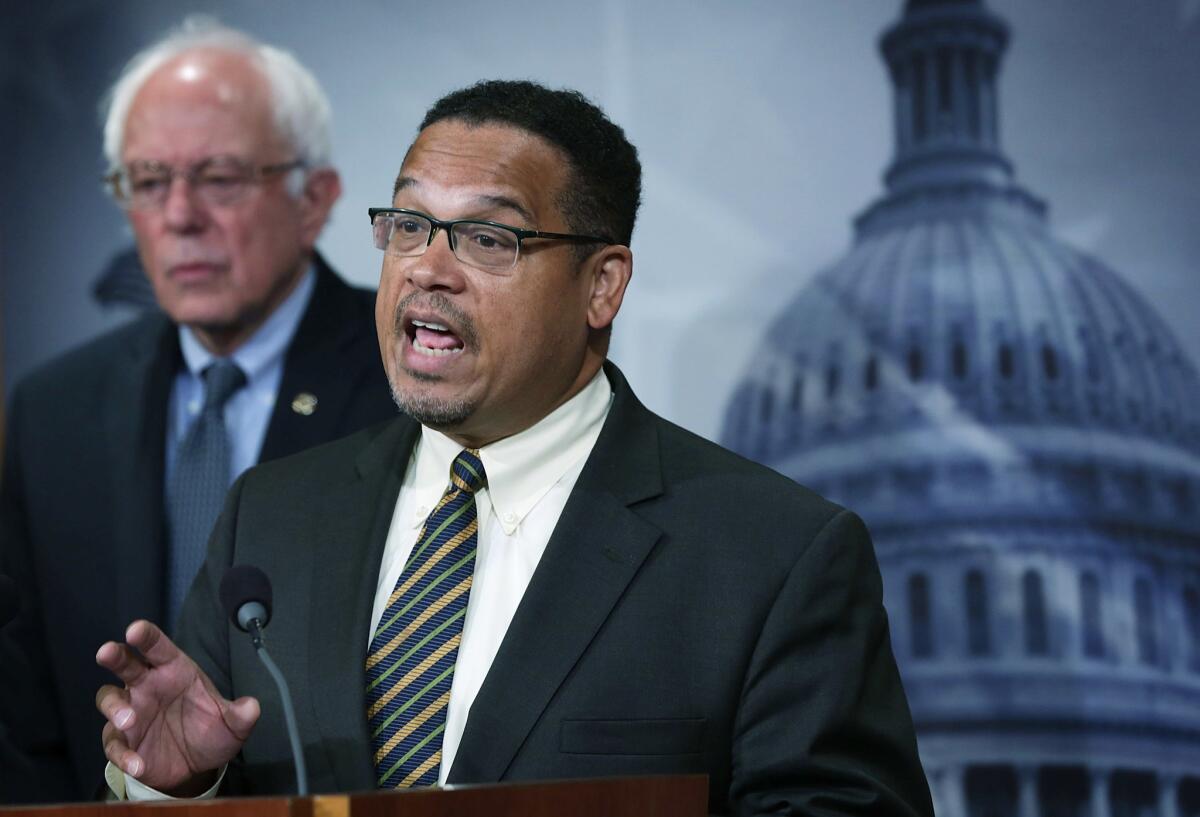
It was followed by a statement from Sen. Bernie Sanders of Vermont reiterating his support for Rep. Keith Ellison (D-Minn.), another leading candidate in the race.
Although Sanders lost to Hillary Clinton in the presidential primary, he has continued to try to pull Democrats to the left, and he has emphasized the need to “create a grass-roots party.”
Obama left office with strong poll numbers, but under his watch, Democrats lost power not only in Washington but in states around the country, something Sanders and his allies have stressed in the fight over the party chairmanship.
“The question is simple: Do we stay with a failed status-quo approach or do we go forward with a fundamental restructuring of the Democratic Party?” Sanders said.
- Share via
Border Patrol chief is abruptly out after being brought in as a reformer
The chief of the Border Patrol will leave his post at the end of the month, likely the result of a change in direction by the Trump administration and a reflection of the new power of the agency’s union.
Mark Morgan, the agency’s head, was hired from the FBI in June to reform the force after a series of corruption allegations and problems with excessive force. He will leave the Border Patrol abruptly after seven months on the job, according to a person familiar with the decision who spoke on the condition of anonymity.
Morgan’s departure was first reported by the Associated Press.
Morgan spent 20 years at the FBI and was first brought to Customs and Border Protection, the Border Patrol’s parent agency, in 2014 to overhaul its internal affairs division. After a subsequent stint running the FBI’s training academy, he started the top job at the Border Patrol in June.
The Border Patrol’s union had opposed Morgan’s appointment, preferring a candidate who had risen through the ranks of the agency.
The union endorsed President Trump in the election, breaking with its practice of remaining neutral in elections.
News of Morgan’s departure comes a day after Trump announced he would build a border wall and hire 5,000 more Border Patrol agents, bringing the total force to 26,000. Trump said the Border Patrol union would have a lot of clout in department decisions.
- Share via
Lights go out on confirmation hearing for expected CIA chief
The lights went out as the confirmation hearing began for Donald Trump’s pick to run the CIA, raising questions of whether it was a routine technical malfunction or someone was trying to disrupt the proceedings.
The Senate Intelligence Committee is vetting Rep. Mike Pompeo (R-Kan.) to run the fabled spy service.
The president-elect has openly mocked the CIA and other parts of the intelligence community for months, most recently for its assessment that groups backed by Russian spy services hacked Democratic Party computers in an effort to help Trump win the White House.
The hearing was stopped about 10 minutes after it started to allow building staff to figure out how to turn the lights on again.
- Share via
Trump was silent on new U.S. sanctions against Russia, but he praises Putin’s response
After President Obama on Thursday announced retaliatory measures against the Russian government for what the U.S. has concluded were efforts to interfere in the election, President-elect Donald Trump’s response was terse and dismissive, saying it was time to “move on to bigger and better things.”
But after Russian President Vladimir Putin said Friday that he would not respond in kind to the U.S. actions — preferring to wait until the new administration takes office — Trump weighed in with high praise.
Trump’s tweet did not appear to be off the cuff. As if to underscore his sentiment, Trump affixed the tweet to the top of his Twitter feed. And he posted an Instagram photo shortly after, quoting himself.
Trump’s effusive words were particularly striking given the bipartisan view of Putin as more adversary than ally.
House Speaker Paul D. Ryan (R-Wis.) and Senate Majority Leader Mitch McConnell (R-Ky.) said they supported the Obama administration’s move to expel Russian diplomats and block access to two properties owned by its government.
Senate Armed Services Committee Chairman John McCain (R-Ariz.) is expected to call a hearing on Russia’s cyber activities when the new Congress convenes next week.
A Trump transition spokesman was asked earlier Friday whether Trump had spoken or planned to speak with Putin before his inauguration.
“The priority right now is for the president[-elect] to get an update next week from the intelligence community,” Sean Spicer said.
Trump’s praise did get tacit approval from some quarters. The Russian embassy in Washington retweeted it.
- Share via
Putin says Russia won’t oust U.S. diplomats in response to hacking-flap sanctions
President Vladimir Putin on Friday condemned a new round of U.S. sanctions against Russia but said Moscow will not retaliate by expelling American diplomats.
President Obama on Thursday imposed sanctions on Russian officials and intelligence services in retaliation for what U.S. officials say is Russia’s interference in the presidential election by hacking American political sites and email accounts. Thirty-five Russian diplomats were ordered to leave the U.S. in 72 hours, and two Russian diplomatic facilities were closed.
- Share via
Most popular White House petitions included requests to label a hate group and deport Justin Bieber
Over the past five years, Americans have produced and signed nearly 5,000 petitions through the White House’s “We the People” site. How could we ever forget the effort to get the Obama administration on board with building a Death Star? Some, like that one and a petition to deport Justin Bieber, resulted only in conversation. But others made an impact.
The Pew Research Center analyzed the petitions in a recent report. They ranged from serious, like an effort to ban gay conversion therapy at a state level that led the president in 2015 to support states’ bans, to playful. A request for Obama to appear on a previously unvisited talk show, for example, prompted him to appear on “Real Time with Bill Maher” in January 2016.
In 2015, 106-year-old Virginia McLaurin requested a meeting with the first black president, something she never thought she’d live to see. Her petition garnered only 19 signatures. But it nonetheless resulted in one of first couple’s most memorable meetings, this dance party:
The petitioning system, launched in 2011, was part of Obama’s open-government initiative. The most common topics for petitioning included healthcare, veterans issues and requests to honor individuals, such as Yogi Berra, and create or officially recognize holidays, like Talk Like a Pirate Day.
While not every petition made a change or elicited a response from the White House, many captured a momentary pulse of the nation.
Here are the five most popular:
- “Legally recognize the Westboro Baptist Church as a hate group,” posted Dec. 14, 2012; 367,180 signatures.
- “Establish justice and prevent a great catastrophe,” posted April 4, 2016; 331,914 signatures.
- “File charges against the 47 U.S. senators in violation of the Logan Act in attempting to undermine a nuclear agreement,” posted March 9, 2015; gained 322,117 signatures.
- “Ask President Obama to appear on HBO’s ‘Real Time with Bill Maher,’ ” posted Jan. 15, 2016; 314,226 signatures.
- “Deport Justin Bieber and revoke his green card,” posted Jan. 23, 2014; 273,698 signatures.
- Share via
Obama slaps Russia with sanctions for meddling in the U.S. election
In the most sweeping retaliation against Russia in decades, President Obama slapped the country with new penalties Thursday for meddling in the U.S. presidential election, kicking out dozens of suspected spies and imposing banking restrictions on five people and four organizations the administration says were involved.
“All Americans should be alarmed by Russia’s actions,” Obama said in a statement. “Such activities have consequences.”
- Share via
How Trump and an Obamacare rollback could affect the growing gig economy

A growing share of the U.S. workforce is reyling on alternative work arrangements, which include on-demand gigs through online platforms like Lyft or Uber as well as work through temporary help agencies, freelance assignments and independent contracts.
The Bureau of Labor Statistics plans to conduct a comprehensive survey of these so-called contingent workers next year, its first since 2005, helping policymakers understand the size and makeup of a workforce not covered by many labor protections or privy to the benefits that come with a traditional employer relationship.
Whether policy will catch up to the labor shifts is a question experts will watch in 2017. A major conversation point has been how to develop portable benefits that give gig economy workers access to retirement plans, unemployment insurance and paid sick leave even as they move from job to job.
- Share via
Trump touts plans by Sprint and OneWeb to create 8,000 U.S. jobs
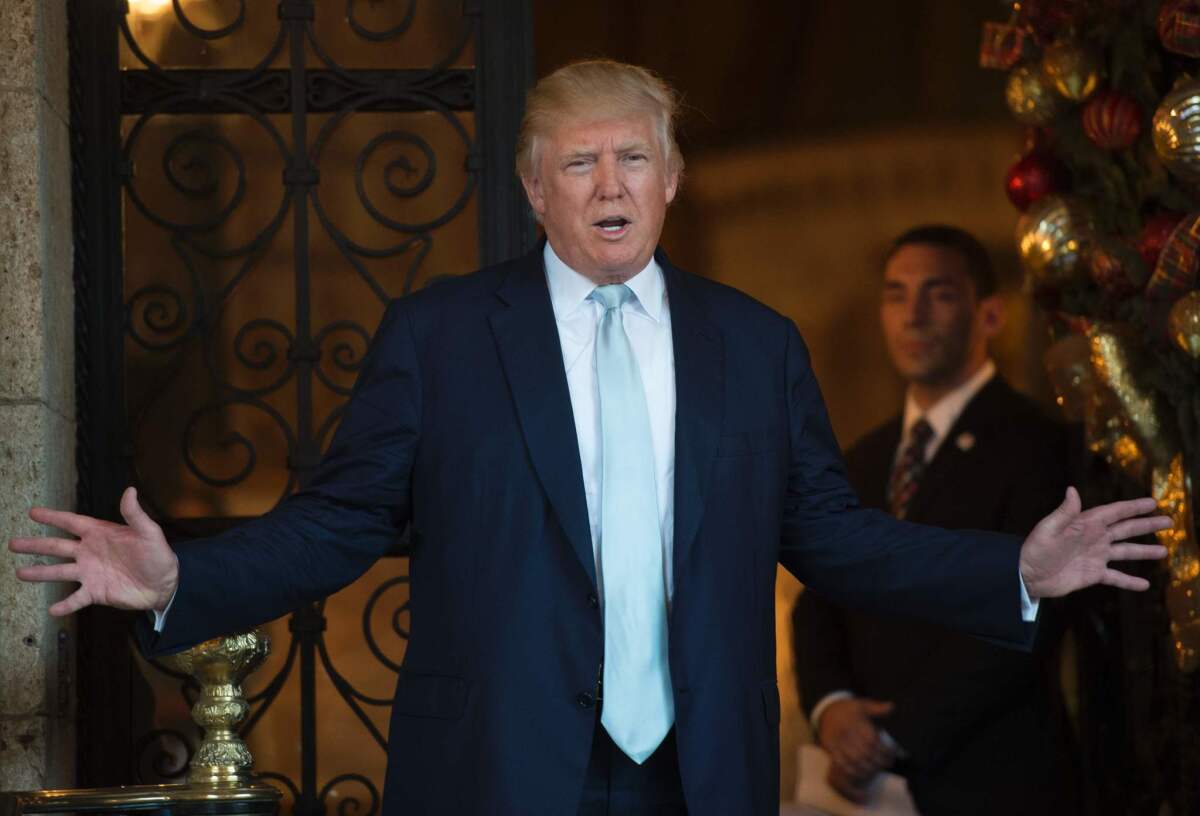
President-elect Donald Trump on Wednesday touted plans by telecom company Sprint and technology start-up OneWeb to hire a total of 8,000 workers in the U.S. in what he said was “very good news” for the economy.
He appeared to be highlighting previously made jobs announcements.
OneWeb, which is building a network of satellites to deliver high-speed Internet access, said on Dec. 19 that it expected to create nearly 3,000 jobs in the U.S. over the next four years after securing $1.2 billion in funding, mostly from Japan’s SoftBank Group Corp.
And the head of SoftBank, which owns Sprint, said on Dec. 6 that the company had agreed to invest $50 billion in the U.S. and create 50,000 jobs here.
The announcement by SoftBank Chief Executive Masayoshi Son came after he met with Trump at Trump Tower in New York City. Trump touted it that day.
Speaking at his Mar-a-Lago estate in Palm Beach, Fla., on Wednesday, Trump said Sprint was “going to be bringing 5,000 jobs back to the United States.”
“They have taken them from other countries. They are bringing them back to the United States,” Trump said.
Sprint, though, said in a statement that the jobs would be a mixture of new positions and others that were reinstated. It wasn’t clear whether those jobs were part of the 50,000 that were mentioned earlier in the month at Trump Tower.
“We are excited to work with President-Elect Trump and his administration to do our part to drive economic growth and create jobs in the U.S.,” said Sprint CEO Marcelo Claure. “We believe it is critical for business and government to partner together to create more job opportunities in the U.S. and ensure prosperity for all Americans.”
Trump also said the OneWeb hiring “is very exciting.” OneWeb did not immediately respond to a request for comment.
3:25 p.m.: This story was updated with comment from Sprint.
- Share via
Kerry offers fierce defense of Obama’s support for Israel, urges resumption of Mideast peace talks
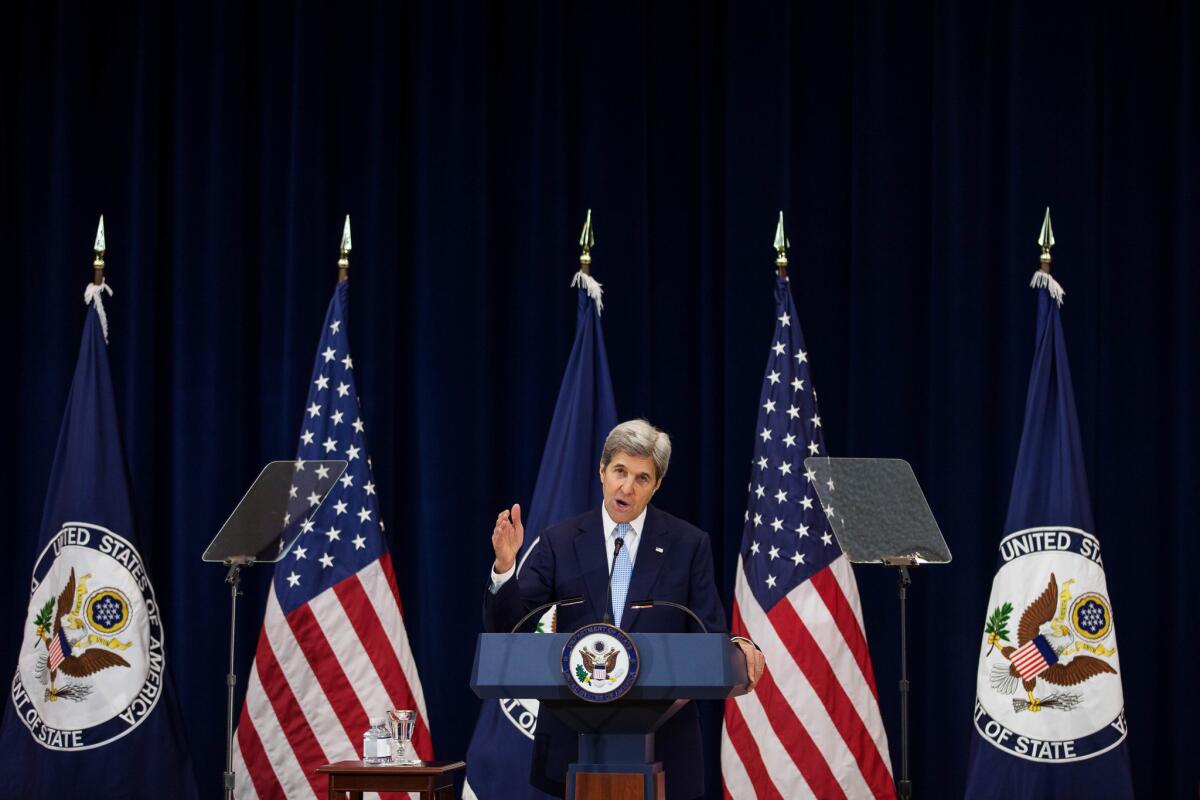
With President-elect Donald Trump tweeting from the sidelines, Secretary of State John F. Kerry on Wednesday outlined broad principles for reviving the moribund Israel-Palestinian peace process -- calls that quickly ignited a new burst of Israeli anger against the Obama administration.
Kerry’s lengthy and impassioned address, delivered at the State Department, marked the latest chapter in an unusually bitter public clash between the United States and Israel -- and the even more extraordinary spectacle of a president-elect again inserting himself into a sensitive diplomatic matter before taking office.
In a speech lasting more than an hour, Kerry appealed for a hiatus in Jewish settlement activity in the West Bank and East Jerusalem, called on Palestinian leaders to explicitly denounce terrorist attacks against Israelis, and warned repeatedly that the prospects for a “two-state solution,” with Israel and a Palestinian state existing side-by-side, were in jeopardy.
“We cannot in good conscience do nothing, and say nothing, when we see the hope of peace slipping away,” he said.
- Share via
Former California lieutenant governor will meet with Trump to discuss running Agriculture department
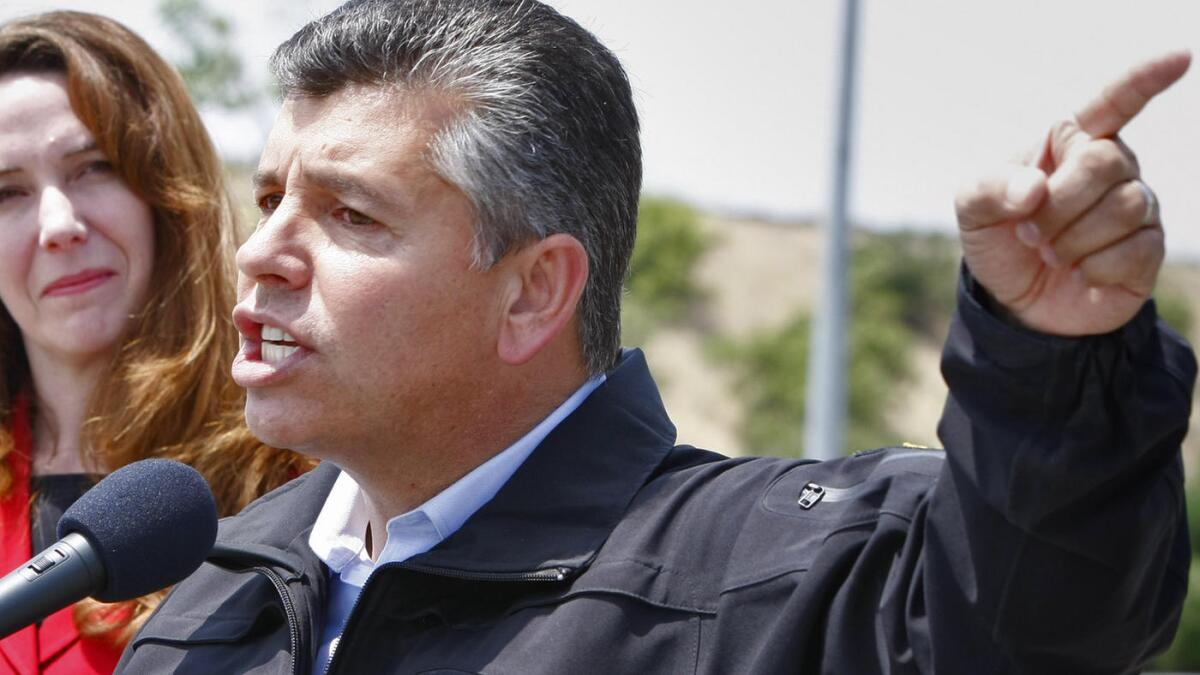
President-elect Donald Trump is considering former California Lt. Gov. Abel Maldonado to lead the Agriculture department, a move that would bring greater diversity to the Republican’s Cabinet.
Maldonado will meet with Trump on Wednesday at his Palm Beach, Fla., estate. Trump spokesman Sean Spicer noted that Maldonado, owner of Runway Vineyards in the Santa Maria Valley, comes from three generations of farmers and has “strong roots in the agriculture industry of California.”
Trump will also meet with Dr. Elsa Murano, the former president of Texas A&M University and a former Agriculture undersecretary for food safety, in connection to the post, one of the few Cabinet positions yet unfilled.
Maldonado, 49, was once considered to be the kind of Republican who could break through the party’s struggle to attract widespread Latino support. A Santa Barbara County farmer whose parents were Mexican farmworker immigrants, he served as mayor of Santa Maria before being elected to the state Assembly in 1998.
Perhaps Maldonado’s most notable political moment came when he worked with Gov. Arnold Schwarzenegger to force Democrats to embrace the top-two primary system for California during negotiations on the state budget crisis in 2009. Schwarzenegger rewarded Maldonado with the appointment to the then-vacant post of lieutenant governor in 2010.
But Maldonado’s role in helping push the nonpartisan primary system made him a pariah among many conservative Republicans, and he failed in subsequent races for Congress in 2012 and a brief flirtation with a run for governor in 2014.
If nominated and confirmed, Maldonado would be the sole Latino in Trump’s Cabinet.
- Share via
Trump attacks Obama over Israel just ahead of Kerry’s speech on the Mideast
The detente between President Obama and President-elect Donald Trump, as both aimed to portray a smooth transition of power, appears in jeopardy.
Trump condemned the Obama administration’s foreign policy on Wednesday, tweeting he was doing his best to overlook “inflammatory” Obama moves, while engaging in 1990s-style sarcasm.
Last week, Obama decided to have the U.S. abstain from a United Nations Security Council vote on a resolution condemning Israeli settlement activity, which allowed the measure to pass.
The vote angered Israeli leaders, who accused senior U.S. officials of complicity in drafting the resolution, a claim disputed by the U.S.
Trump’s postings came just before Secretary of State John F. Kerry delivered a major address on U.S. foreign policy that included a rebuttal to Israeli government criticisms of the Obama administration.
Trump’s statement of support for Israel was welcomed by Prime Minister Benjamin Netanyahu, who has long had a tense relationship with Obama.
Trump transition spokesman Sean Spicer told reporters that the president-elect’s tweets “speak for themselves, very clearly.”
He also stressed that White House officials have been “helpful and generous with their time,” at least in terms of the “mechanics of the transition.”
In a brief statement to reporters Wednesday night, Trump said he had a “general conversation” with Obama during the day.
“Very, very nice,” was how the president-elect described the chat, which he said Obama initiated. A White House spokesman confirmed the call and characterized it as positive.
When asked whether he thinks the U.S. should exit the U.N., Trump repeated his earlier comments that the global body is “not living up to its potential.”
“When do you see the United Nations solving problems?” he asked. “They don’t, they cause problems, so if it lives up to its potential it’s a great thing, if it doesn’t it’s a waste of time.”
The U.N. seemed to respond to Trump on Monday, in a message pinned to the top of its Twitter feed:
Times staff writer Christi Parsons in Honolulu contributed to this report.
5:10 p.m.: This story was updated with White House comment.
2:45 p.m.: This story was updated with Trump’s comments.
- Share via
John Kerry, tireless in his diplomatic efforts, often came up empty-handed
John F. Kerry is nothing if not indefatigable, traveling to all corners of the world as America’s top diplomat over the last four years. But as he prepares to leave office, he confronts a mixed legacy: a handful of successes coupled with searing defeats, especially in the Middle East.
His inability to halt the carnage in Syria, or to block Russia’s growing influence, ranks as the most serious blot on his record. But he also got nowhere trying to end the Israeli-Palestinian standoff, or to stop Saudi Arabia, a U.S. ally, from bombing civilians in Yemen.
Kerry’s greatest success was the historic accord to curtail Iran’s nuclear development program and a landmark climate change treaty to limit greenhouse gas emissions and slow global warming.
- Share via
At Pearl Harbor, Obama says ‘we must resist the urge to demonize those who are different’
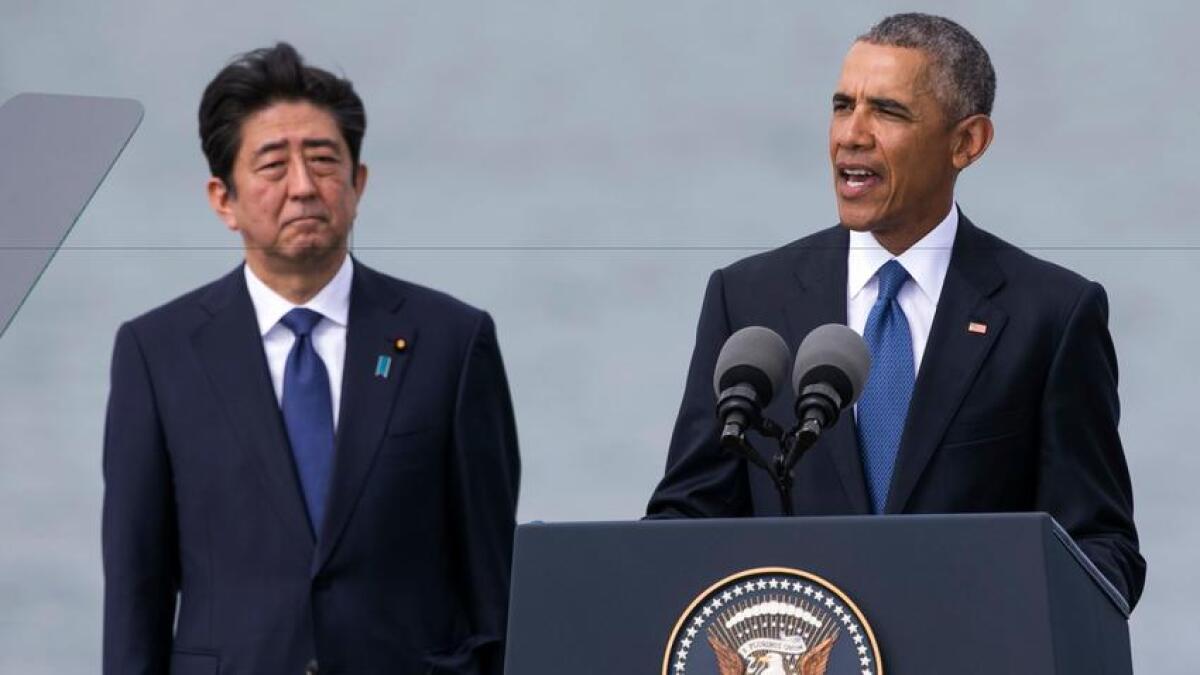
President Obama and Japanese Prime Minister Shinzo Abe scattered petals together on the waters of Pearl Harbor on Tuesday in a symbolic act aimed at laying to rest the enmity of the Japanese attack 75 years ago that drew the U.S. into World War II.
In a moment consumed with history, both leaders were fixed on the future. They expressed concern that the lessons of the war might be forgotten amid a shifting world order and the anti-internationalist sentiment that has swept over politics around the globe, most notably with the ascendance of President-elect Donald Trump.
- Share via
Obama and Japan’s Abe to visit Pearl Harbor amid renewed talk of nuclear concerns

President Obama and Japanese Prime Minister Shinzo Abe are scheduled to honor the war dead at Pearl Harbor on Tuesday, marking the 75th anniversary of the attack that thrust the U.S. into World War II.
The visit was planned as a coda to Obama’s visit to Hiroshima in May, where Abe hosted him as the first sitting president to visit the site where the U.S. dropped one of two nuclear bombs in 1945 to end the war, the only instances of nuclear attacks in history.
But the visit has taken on a new meaning. President-elect Donald Trump reawakened old fears of a nuclear arms race last week by declaring his commitment to “strengthen and expand” U.S. nuclear capability.
In his remarks at Pearl Harbor, Obama will have an opportunity to address those renewed anxieties and to lay out the dangers of an arms race. Obama has fought to stop the proliferation of nuclear weapons and to secure existing caches.
The visit is meant to highlight the strength of the relationship between the U.S. and Japan, an administration official said. Several Japanese prime ministers before Abe have visited the Pearl Harbor site. But Abe is the first to go to the memorial at the resting place of the battleship Arizona, where 1,177 American military personnel died in the Japanese aerial attack on Dec. 7, 1941.
- Share via
Will the Fed’s Janet Yellen ‘take away the punch bowl’ after Trump takes office?
After three years of almost single-handedly juicing up the slow-growing economy, Janet L. Yellen and the Federal Reserve should be looking at easier days ahead.
Yellen, in what will probably be her last full year as Fed chair, may finally get help from somewhere else in Washington.
Tax cuts and infrastructure spending planned by President-elect Donald Trump, if backed by the Republican-controlled Congress, would lighten the load for a Fed whose easy-money policies have been the primary economic support for the nation.
She is already breathing easier on the Fed’s employment mandate; the jobless rate has fallen to a nine-year low of 4.6%. Inflation, too, is under control and, by all accounts, creeping toward the central bank’s optimal level of 2%.
And yet, Yellen may come under as much economic and political pressure as ever, on both the Fed’s policy and the independence of the institution.
- Share via
Obama says he could have beaten Trump
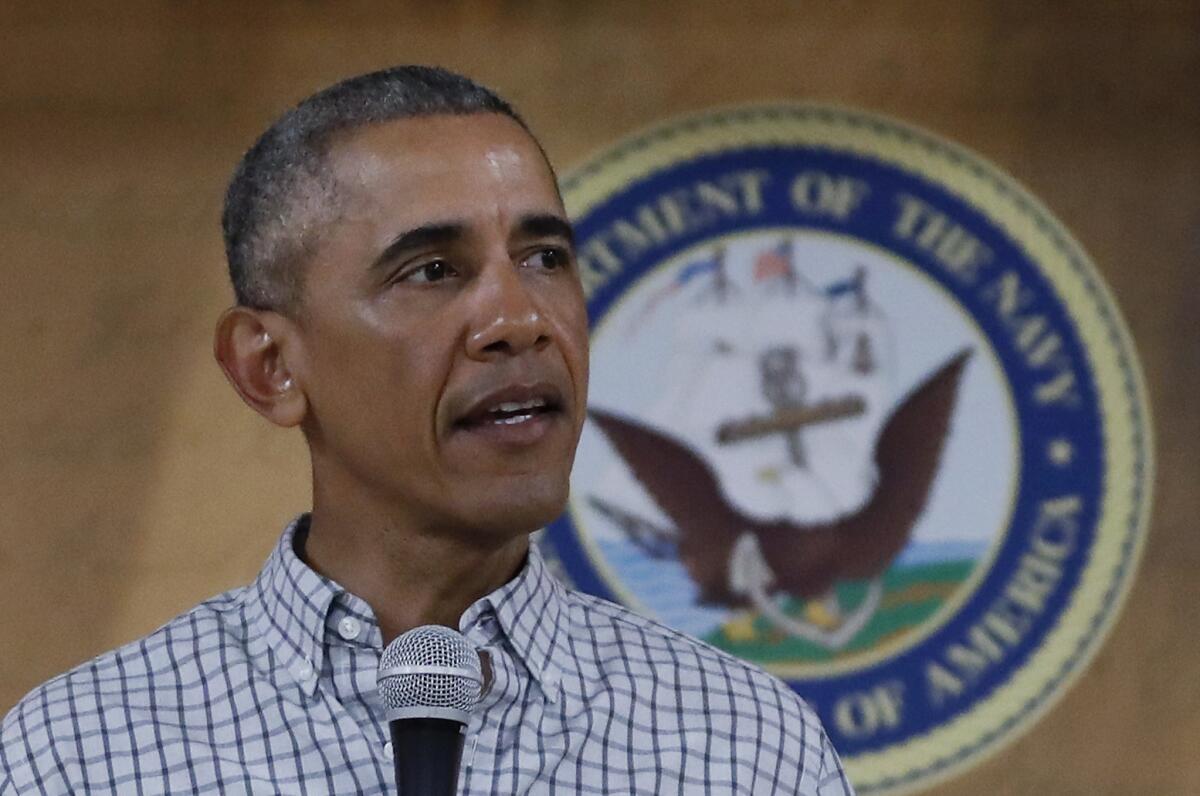
President Obama says he could have defeated Donald Trump in last month’s election by recapturing the same “vision of hope” that twice carried him to the presidency.
Obama also was mildly critical of the Democratic nominee, Hillary Clinton, saying her campaign didn’t do enough to get her message out.
The remarks were notable because Obama has been careful since the election to avoid criticizing Trump, or to deliver a post-mortem on Clinton’s failed bid.
Obama spoke in a wide-ranging interview with former senior advisor and now CNN commentator David Axelrod for the Democratic political operative’s Axe Files podcast. The interview was released by CNN on Monday.
“You know, I am confident in this vision because I’m confident that if I -- if I had run again and articulated it, I think I could’ve mobilized a majority of the American people to rally behind it,” Obama said.
His comments were part of a wider discussion of what he called “ugly” sentiments of racism and xenophobia that surfaced during the 2016 campaign.
Obama repeated his assertion that Clinton faced a double standard as a woman, which put her at a disadvantage.
But he also said a kind of complacency set in that made the Clinton campaign too cautious and thus unable to get its message out sufficiently.
“If you think you’re winning, then you have a tendency, just like in sports, maybe to play it safer,” Obama said.
During the interview, Obama also spoke of his family, the strength he’d gotten from wife Michelle and the improbability of his own political career.
And the president said the spirit that his candidacy originally inspired, especially among young people, was “never snuffed out” despite the last eight years of turmoil.
“The idealism and the dedication stayed with the staff and got us through some really hard times,” he said.
Trump later responded to the remarks on Twitter.
UPDATE
2:07 p.m.: This article was updated with Trump’s response.
This article was originally published at 12:28 p.m.
- Share via
Obama personally authorized U.S. abstention from U.N. vote on Israeli settlements
President Obama personally directed Friday that the U.S. abstain from a United Nations Security Council resolution condemning Israeli settlement activity, seeing the escalation of settlement building as an increasing threat to the viability of a two-state solution to the region’s problems.
Ahead of the expected vote, Obama, who is vacationing with his family in Hawaii, convened a discussion Thursday with Vice President Joe Biden, Secretary of State John F. Kerry and other top national security officials.
The vote was postponed, but U.S. officials continued to monitor discussions over the Egyptian-authored resolution until Friday. Obama spoke with national security advisor Susan Rice on Friday to issue his final decision.
President-elect Donald Trump’s intervention in the discussions, which included a conversation with Egypt’s president Thursday that preceded the delay in the planned vote, did not affect Obama’s calculations, deputy national security advisor Ben Rhodes told reporters..
“There’s one president at a time,” he said.
The decision to allow the resolution to pass, rather than cast a veto to block it “is consistent with long-standing, bipartisan U.S. policy” opposing Israeli settlement activity, Rhodes said.
One of the administration’s great concerns was that such activity in the West Bank and East Jerusalem “has accelerated significantly” since 2011, when the U.S. last vetoed a comparable resolution.
U.S. officials also have been concerned about continued incitements of violence by Palestinians, and Rhodes said the resolution voted on Friday included greater balance to reflect that than past resolutions.
“We’ve been very concerned that these accelerating trends are putting the very viability of the two-state solution at risk,” Rhodes said. “In that context, we therefore thought that we could not in good conscience veto a resolution that expressed concerns about the very trends that are eroding the foundation for a two-state solution.”
He also underscored what he called Obama’s iron-clad commitment to Israel and its security, noting that the administration recently concluded a major military assistance package.
The U.S. did not vote for the resolution because of continued concerns about the United Nations as a venue for Middle East peace discussions, Rhodes said.
He also responded to what he called “strident” comments of Israeli officials criticizing the U.S. move. “It seems like the Israeli government wants the conversation to be about anything other than the settlement activity,” he said.
- Share via
Trump team seeks to ease fears on women’s programs at State Department
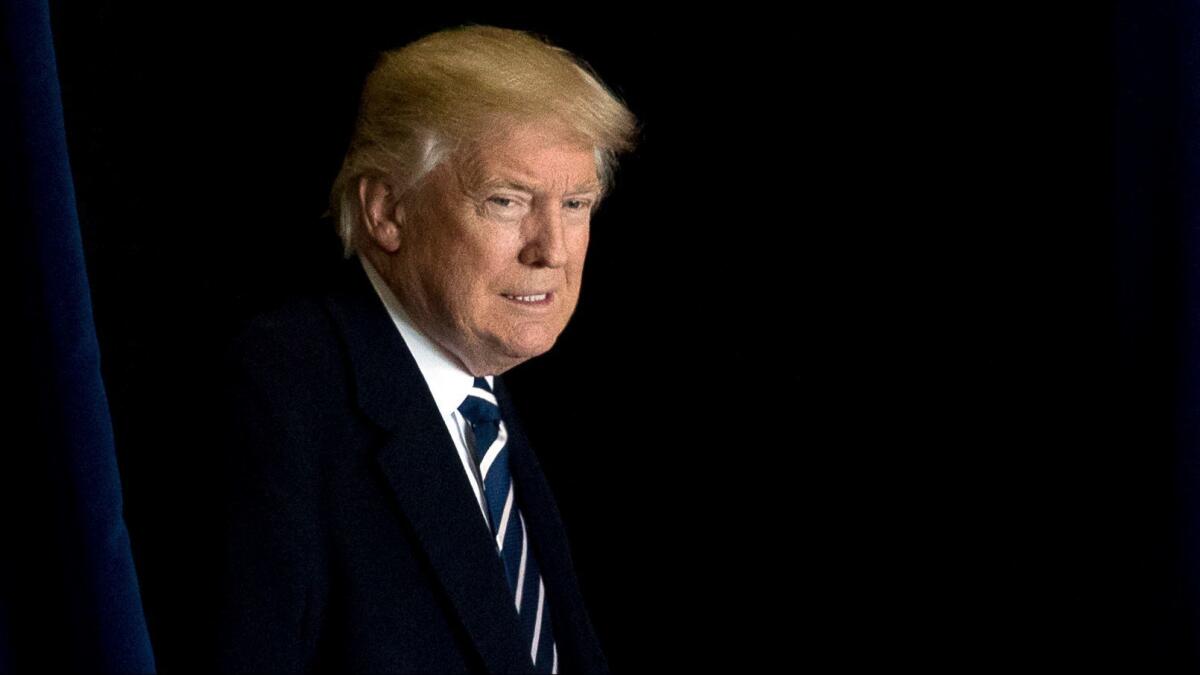
Donald Trump’s transition team said Friday its requests to the State Department for details on positions and funding for global women’s programs were part of an effort to “ensure and protect” gender equality.
The statement appeared to be an attempt to allay concerns that Trump might seek to cancel or roll back gender-focused programs at the State Department following a request by the transition team on Wednesday for information about them.
Most were created or championed by Trump’s campaign rival, Hillary Clinton, when she served as secretary of State during President Obama’s first term.
The transition team statement Friday did not outline Trump’s plans for the programs, which seek to promote equality, education and vocational training for women around the world as well as combat gender-based violence.
“President-elect Trump will ensure the rights of women across the world are valued and protected,” the statement said.
“To help fulfill this promise, the transition team inquired about existing programs at the State Department that helps [sic] foster gender equality, ends gender-based violence, and promotes economic and political participation — finding ways to improve them.”
The statement said the inquiry was one of hundreds of requests it sent to federal departments as part of the transition effort.
- Share via
Trump team asks State Department for details on programs aimed at helping women
Donald Trump’s transition team has asked the State Department for details on programs aimed at benefiting women around the world, including identifying staff members who worked to reduce gender-based violence and promote women in the workplace.
In an email sent to numerous State Department offices Wednesday, the president-elect’s transition team asked for urgent response to its inquiries about “gender-related staffing, programming and funding.”
Many of the programs were begun or were championed by Hillary Clinton, who was secretary of State during President Obama’s first term and who lost to Trump in November.
The unusual request to the State Department follows a similar email to the Department of Energy. There the transition team asked for names of staff members who had worked on efforts to combat climate change, which Trump has dismissed as a hoax.
Several Obama administration officials called that query chilling. The Trump team withdrew the request after it was widely criticized.
The latest email suggests the incoming Trump administration will attempt to roll back some of the State Department’s most innovative programs and may seek to penalize people who worked on them.
“People are freaked out,” said a senior State Department official who was not authorized to speak publicly.
The email asked the State Department to deliver “issue papers from bureaus and offices (one paper max per bureau/office) outlining existing programs and activities to promote gender equality, such as ending gender-based violence, promoting women’s participation in economic and political spheres, entrepreneurship, etc.”
It said the issue papers should note jobs “whose primary functions are to promote such issues,” as well as money allocated for those activities and programs in fiscal year 2017.
While at State, Clinton made women’s issues a top priority.
An office was created to deal exclusively with “global women’s issues,” and money was allocated for programs that promote education of girls, train women in marketable skills and offer microloans.
- Share via
Trump taps seasoned Republican operative Sean Spicer as White House press secretary
President-elect Donald Trump named Sean Spicer as his new press secretary, tapping a seasoned Republican operative as the public face of the new White House.
Spicer, a top Republican National Committee strategist who brought a measure of establishment Washington to Trump’s operation, is known for his combative but engaging approach to communications.
He will likely take over the press podium as the top spokesman at the incoming White House.
Two other veterans of the Trump campaign’s press operation also will get White House jobs: Jason Miller, who had been Trump’s communications chief after moving from the campaign of Republican Sen. Ted Cruz, will stay in that role as communications director at the White House.
Hope Hicks, who was Trump’s spokesperson on the campaign trail and one of his earliest campaign aides, will be assistant to the president and director of strategic communications, and Dan Scavino will serve as director of social media.
“Sean, Hope, Jason and Dan have been key members of my team during the campaign and transition. I am excited they will be leading the team that will communicate my agenda that will Make America Great Again,” Trump said in a statement.
- Share via
Trump insists he still wants to drain the swamp, Gingrich comments notwithstanding
On Wednesday, former House Speaker Newt Gingrich said that Donald Trump and his aides no longer wanted to use the phrase “drain the swamp.”
Apparently, Gingrich, a Trump ally, got off script. The president-elect quickly fired off a tweet.
- Share via
Obama eliminates post-9/11 registry for foreigners, making it harder for Trump to restart it
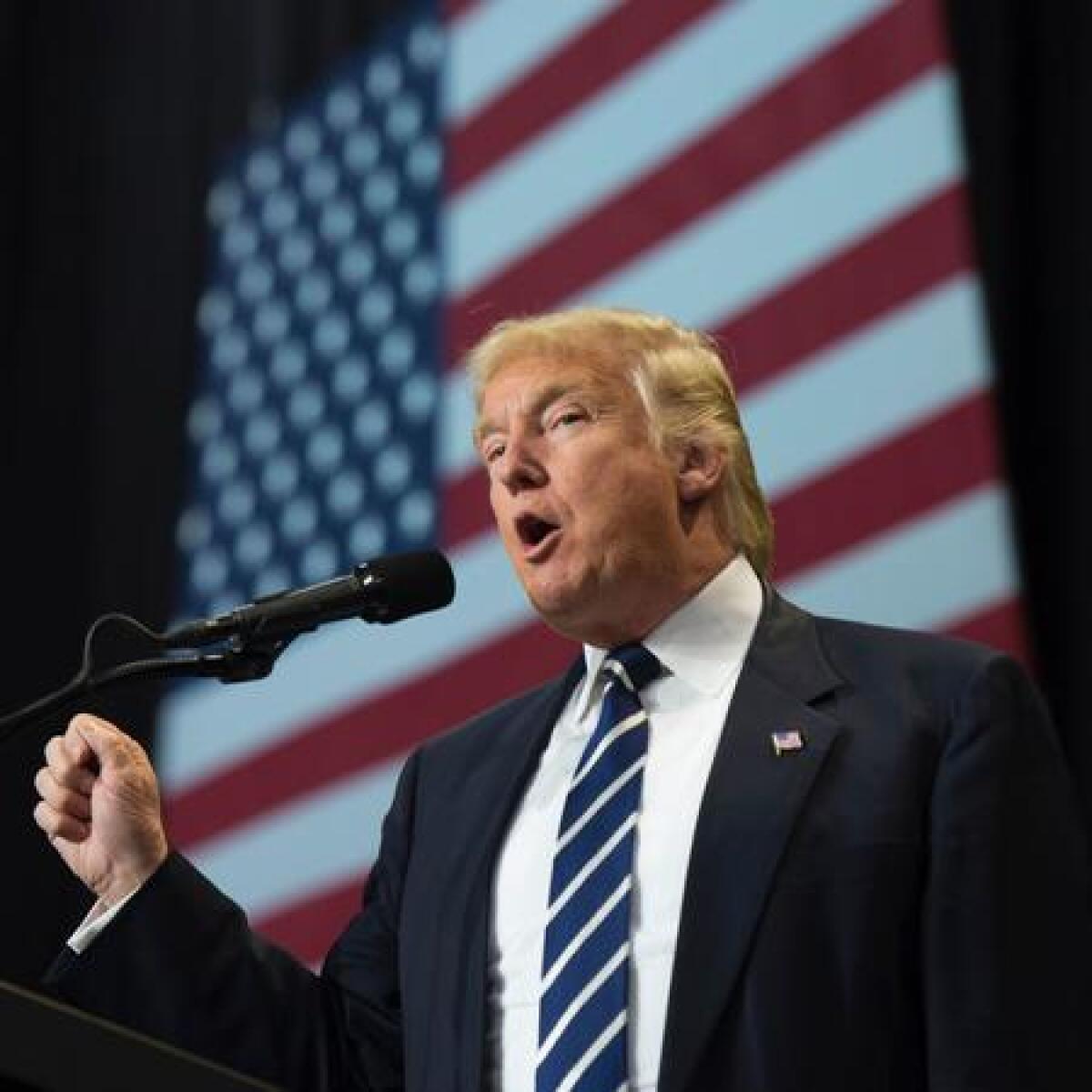
The Obama administration is taking apart a controversial, dormant national registry program that tracked visitors from countries with active terrorist groups for several years following the Sept. 11, 2001, attacks.
A final rule eliminating the program will be published in the federal register on Friday.
The move would make it more difficult for President-elect Donald Trump to revive the registry, which hasn’t been used since 2011. The Department of Homeland Security determined it was ineffective and didn’t improve security. Civil rights advocates have long said the program was discriminatory.
On the campaign trail, Trump promised to track Muslims coming to the U.S. and require them to register. He later changed his stance to say he would bar people from countries with a record of Islamist extremism.
Trump’s policy advisors have been looking closely at ways to jump start the registry, called the National Security Entry-Exit Registration System, after he takes office at the end of January.
With the program being officially dismantled on Friday, Trump’s team would have to issue new federal rules to restart it, a process that could take several months and would require a period for soliciting comments from the public, which likely would be contentious.
The Trump transition team is preparing several executive actions for the incoming president, Trump spokesman Jason Miller told reporters Thursday morning when asked about Obama dismantling the registry.
Stopping “radical Islamic terrorists” from entering the U.S. is of “paramount importance,” Miller said. He didn’t say directly if Trump would rebuild the visitor registry.
“The American people strongly support tough measures to keep radical Islamic terrorists out of our country, and President-elect Trump has made clear that we will suspend admissions of those from countries with high terrorism rates and apply a strict vetting procedure for those seeking entry in order to protect American lives,” he said.
When asked on Wednesday if he would set up a registry for Muslims or impose a ban on Muslim immigrants in the wake of the truck attack on a Christmas market in Berlin, Trump said simply: “You know my plans.”
Democratic lawmakers and civil liberties advocates have demanded in recent weeks that Obama dismantle the registry. They’ve cited a 2012 inspector general report that said Homeland Security databases collecting traveler fingerprints, flight manifests and intelligence information on foreigners are more effective at preventing terrorist attacks.
Sen. Patrick Leahy (D-Vt.) praised the Homeland Security Department’s decision to strip away “dead-letter regulations” no longer in use.
“These regulations symbolized an ineffective program based on religious and ethnic profiling, rather than individualized suspicion — a program based on fear, rather than reason,” Leahy said in a statement. “That has no place in this great country, under any administration.”
- Share via
Trump is unwinding some foreign deals but many potential conflicts remain
The Trump hotel in Baku, Azerbaijan, would be “among the finest in the world,” Donald Trump promised two years ago, another example of “our involvement in only the best global development projects.”
But the dream of a world-class Trump Baku died this month, with Trump saying he was backing out of the deal because of delays and blown deadlines caused by the developer, a 34-year-old with close family connections to the country’s government.
The demise of Trump Baku is not an isolated decision. With his inauguration less than a month away, President-elect Trump’s company has pulled out of a few international business deals that might have created especially sticky conflicts and controversies for his administration.
- Share via
Trump names UC Irvine professor and fierce China critic to new White House Trade Council
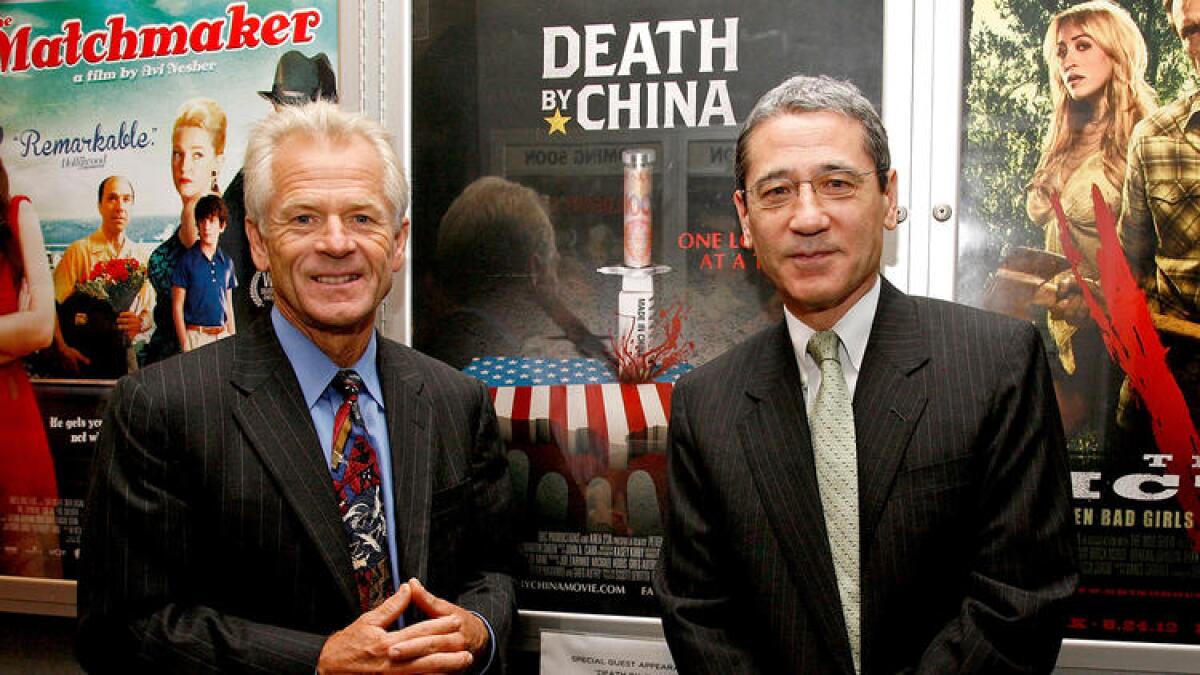
President-elect Donald Trump, signaling that he intends to follow through on his tough talk on trade, is establishing a new White House-based trade council to be headed by a vehement critic of China’s economic policies.
Trump on Wednesday named Peter Navarro, a Harvard-trained business professor at UC Irvine, as director of trade and industrial policy and head of the newly created White House National Trade Council.
The move sends a strong message: The Trump administration will take a much more aggressive posture to shrink the nation’s large trade deficit and combat what the president-elect and Navarro believe are forces behind America’s manufacturing woes — unfair and mercantilist practices on the part of China and other trading partners.
- Share via
The issue of race has hung over Sen. Jeff Sessions like a shadow. Here’s why
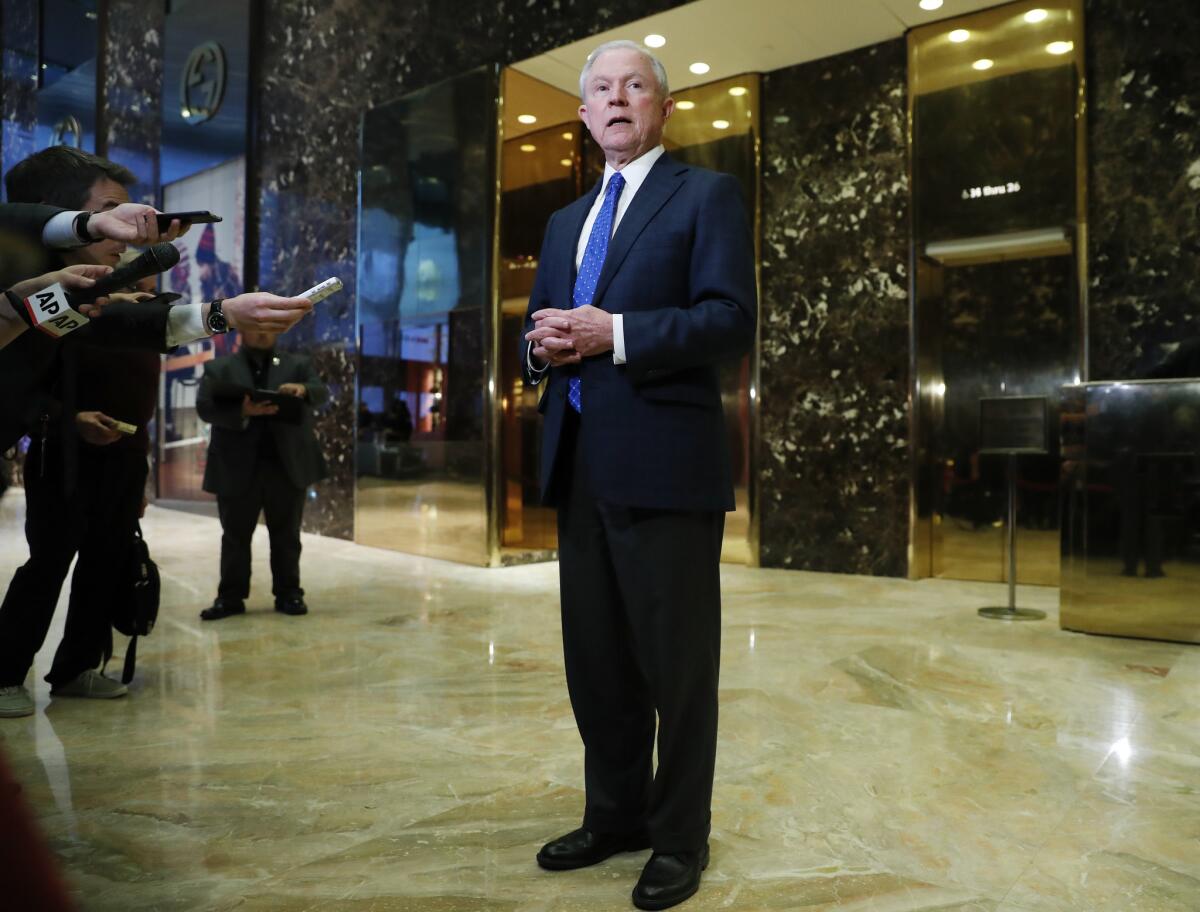
Jeff Sessions’ uneasy history with race can be traced back to the long, winding country roads that cut through the pine forests and farm land in this deep corner of the Deep South.
As a boy, Jefferson Beauregard Sessions III began each day before dawn, boarding a segregated bus to his all-white school. En route he and his classmates passed the bus ferrying black students in the opposite direction.
The day ended when he sat down to dinner each night with his father, an avowed segregationist until the end of his life.
Reflecting on those years, Sessions acknowledged recently that he knew back then that segregation was morally wrong and regretted standing by passively as civil rights leaders in the 1960s struggled and died in the fight for equality.
“I should have stepped forward more and been a leader and more positive force,” Sessions said in February while participating in a ceremony honoring the Selma “foot soldiers.”
- Share via
Kellyanne Conway will join Trump in the White House
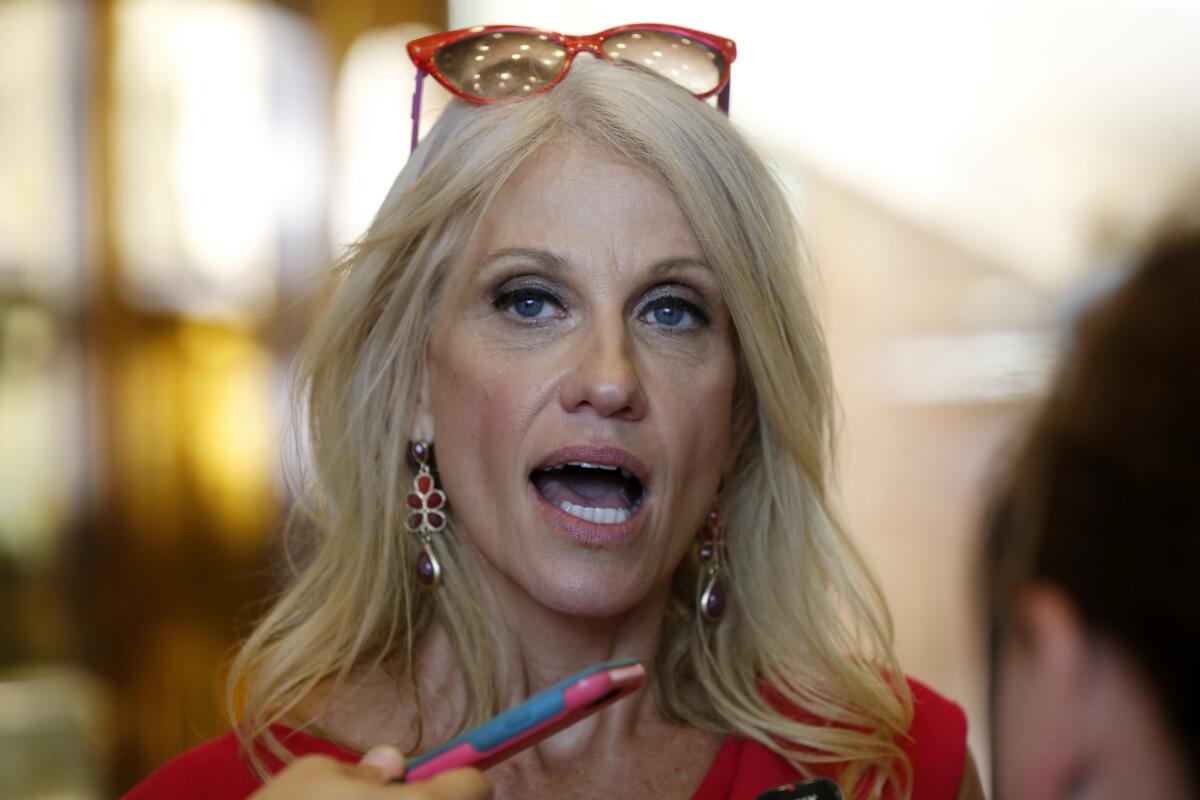
Donald Trump has named his media-savvy campaign manager, Kellyanne Conway, to advise him in the White House in the role of counselor, his transition team announced early Thursday morning.
The move comes after Conway sought to put to rest speculation that she would continue to serve as the public face of the Trump team. But the new job is sure to keep her profile high.
Conway will “will work with senior leadership to effectively message and execute the administration’s legislative priorities and actions,” according to a statement from the Trump transition team.
“Kellyanne Conway has been a trusted advisor and strategist who played a crucial role in my victory,” Trump said in the statement. “She is a tireless and tenacious advocate of my agenda and has amazing insights on how to effectively communicate our message.”
The appointment would boost diversity in a Trump inner circle made up mostly of older white men. It also sets up another potentially competing power center on a White House staff that already will have several, including Reince Priebus, the chief of staff; Stephen K. Bannon, the chief strategist; and Stephen Miller, the policy chief.
Conway had previously turned down other proposals for White House jobs, telling reporters late last month that she did not want to spend long hours away from her children.
At that point, Conway said she thought she could best help Trump by forming an outside organization to support his policies. But that role appears to have gone to Brad Parscale, who ran Trump’s online operations during the campaign.
Conway joined Trump’s campaign during the summer when it was beset with infighting and disarray. She is widely credited with helping bring message discipline and professionalism to an operation in desperate need of it.
In the run-up to the election and the weeks that followed, Conway was a ubiquitous presence on cable news networks, capably moving through her talking points in tough interview settings – often on the firing line and held to account for the exaggerations and incendiary remarks Trump was prone to make on the campaign trail and Twitter.
“I am humbled and honored to play a role in helping transform the movement he has led into a real agenda of action and results,” Conway said in the statement. She is the founder and owner of the Polling Company, inc./WomanTrend, a GOP firm that has been advising candidates for two decades.
Trump has not yet chosen a press secretary. But he is believed to be considering several candidates. Sean Spicer, former communications chief of the Republican Party who has served in a spokesman role for Trump through the transition, has been a prominent possibility, although Trump reportedly has considered several women, including conservative talk radio star Laura Ingraham and Fox News personality Kimberly Guilfoyle.
- Share via
Trump Hotel employees in Las Vegas get a union contract
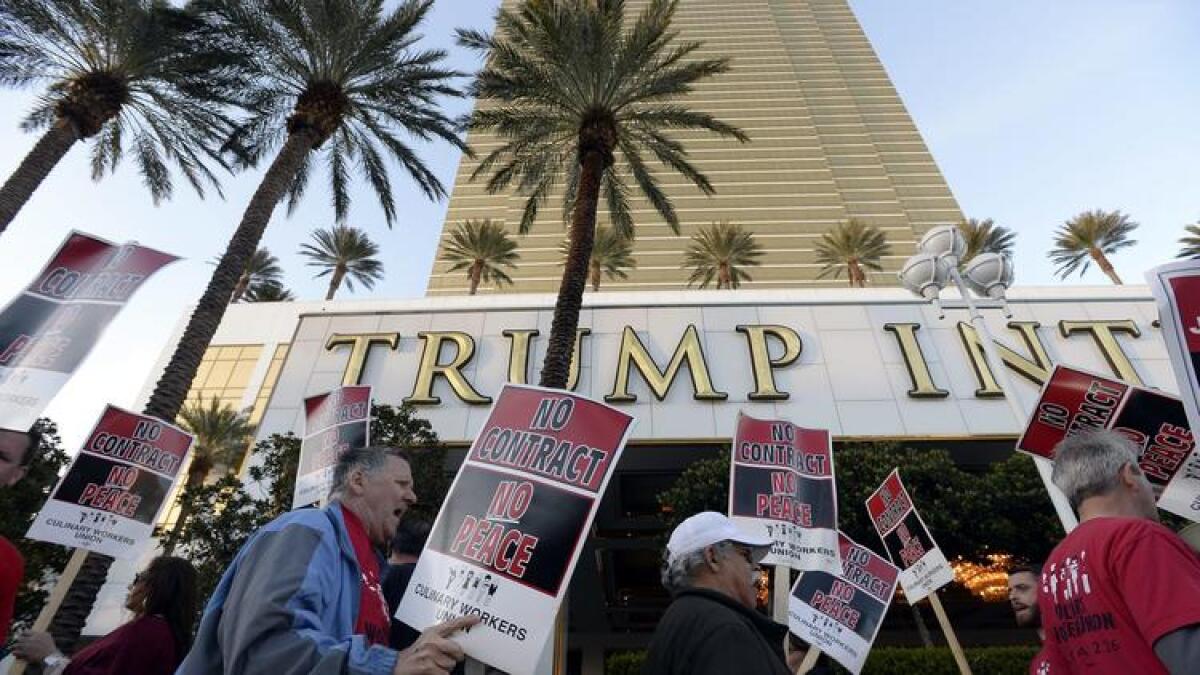
It’s owned by President-elect Donald Trump and is among a handful of hotels on the Las Vegas Strip to not be unionized.
But that will change soon.
For more than a year, Trump and his staff at the Trump International Hotel Las Vegas have fought efforts by employees and the Culinary Workers Union Local 226 to negotiate a contract. But a four-year contract announced by the union on Wednesday will offer Trump employees annual wage increases, a pension and family healthcare, among other benefits.
In Nevada, the culinary union is the state’s largest and most powerful, representing nearly 55,000 workers who serve cocktails and prepare food at hotels throughout the state. A majority of the union’s members are Latino.
- Share via
Wait! Don’t cancel that Air Force One order just yet
After Donald Trump scolded Boeing earlier this month for the escalating cost of building a new Air Force One, the company’s CEO projected confidence that Trump wouldn’t be following through with his threat to “cancel order!”
The two men met together at Trump’s Mar-a-Lago resort in Florida on Wednesday. Boeing CEO Dennis Muilenburg said they spoke about a range of issues. The Air Force One project, which Trump complained would cost taxpayers more than $4 billion, invariably arose.
“We’re going to get it done for less than that, and we’re committed to working together to make sure that happens,” Muilenberg said. The company had previously noted that the project did not yet have a firm price tag.
“I was able to give the president-elect my personal commitment on behalf of the Boeing Company. This is a business that’s important to us. We work on Air Force One because it’s important to our country, and we’re going to make sure that he gets the best capability and that it’s done affordably,” Muilenberg added.
He called the conversation “terrific” and Trump “a good man” who is “doing the right thing.”
The presidential aircraft remains a long way from takeoff — a new plane won’t be ready for use in the next four years. Even if Trump is reelected, he might not get to use the plane, as the earliest projected date for completion is 2024.
Boeing is currently doing early development work on the plane — a modified 747 — that will likely be outfitted with such gadgetry as top-secret communications equipment, countermeasures to foil missile attacks, and aerial refueling capability that would enable it to remain airborne for days at a time if necessary.
The timing of delivery was among the topics that came up at Trump’s meeting with the Boeing CEO.
“That’s what we’re going to work on together,” Muilenberg said. “We have an active 747 production line, and we’re eager to get started on the program. We haven’t actually started the build of the airplane yet, but once we finalize the requirements and make sure that it’s affordable, we’ll launch on building the aircraft. We’ve got a hot production line and we’re ready to go.”
The government actually has two planes outfitted to serve as Air Force One, which is the designation given to whichever plane is carrying the president. The current planes, which were put into service during the Reagan administration, are nearing the end of their design life.
- Share via
Fierce China critic and UC Irvine professor to head Trump’s new trade council
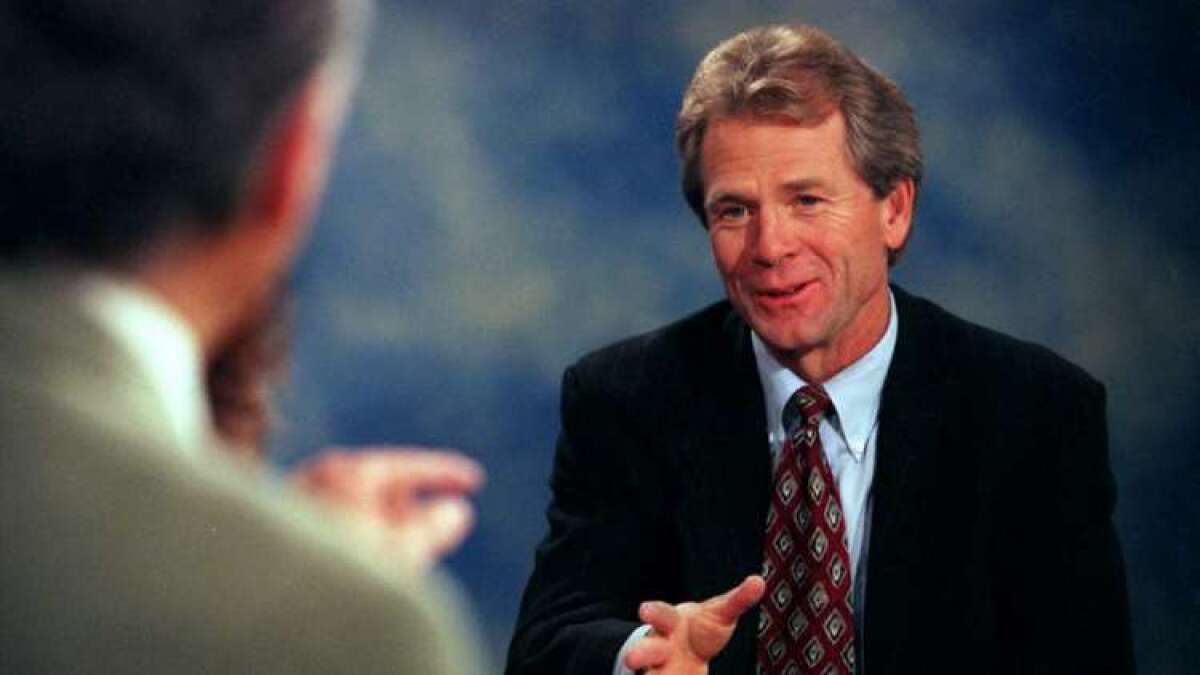
President-elect Donald Trump is establishing a new White House-based trade office that will be headed by a UC Irvine professor known for his fierce criticisms of Chinese trade and economic practices.
In appointing Peter Navarro as director of trade and industrial policy and the head of the new National Trade Council inside the White House, Trump is signaling that he wants to follow through on his tough campaign rhetoric in which he blamed the Chinese for the large U.S. trade deficit and manufacturing woes.
During the campaign,Trump threatened to slap a 45% tariff on Chinese imports.
Navarro, a Harvard-trained economist who advised Trump during the campaign, is the author of the book “Death by China: Confronting the Dragon — a Global Call to Action.” Trump endorsed the 2011 book as well as Navarro’s film version of the polemical work.
“I read one of Peter’s books on America’s trade problems years ago and was impressed by the clarity of his arguments and thoroughness of his research,” Trump said Wednesday in a statement announcing the appointment. “He will fulfill an essential role in my administration as a trade advisor.”
Trump said the new trade office would develop policies to shrink the nation’s trade deficit and curb the off-shoring of jobs, as well as to lead initiatives such as the Buy America, Hire America program.
Navarro, in a statement, said he would be honored to serve Trump and the nation and “to advise on policies to re-balance our trade, rebuild our industrial base, and restore America’s comprehensive national power by making America great again.”
- Share via
Trump stops the ‘drain the swamp’ talk as new alligators emerge
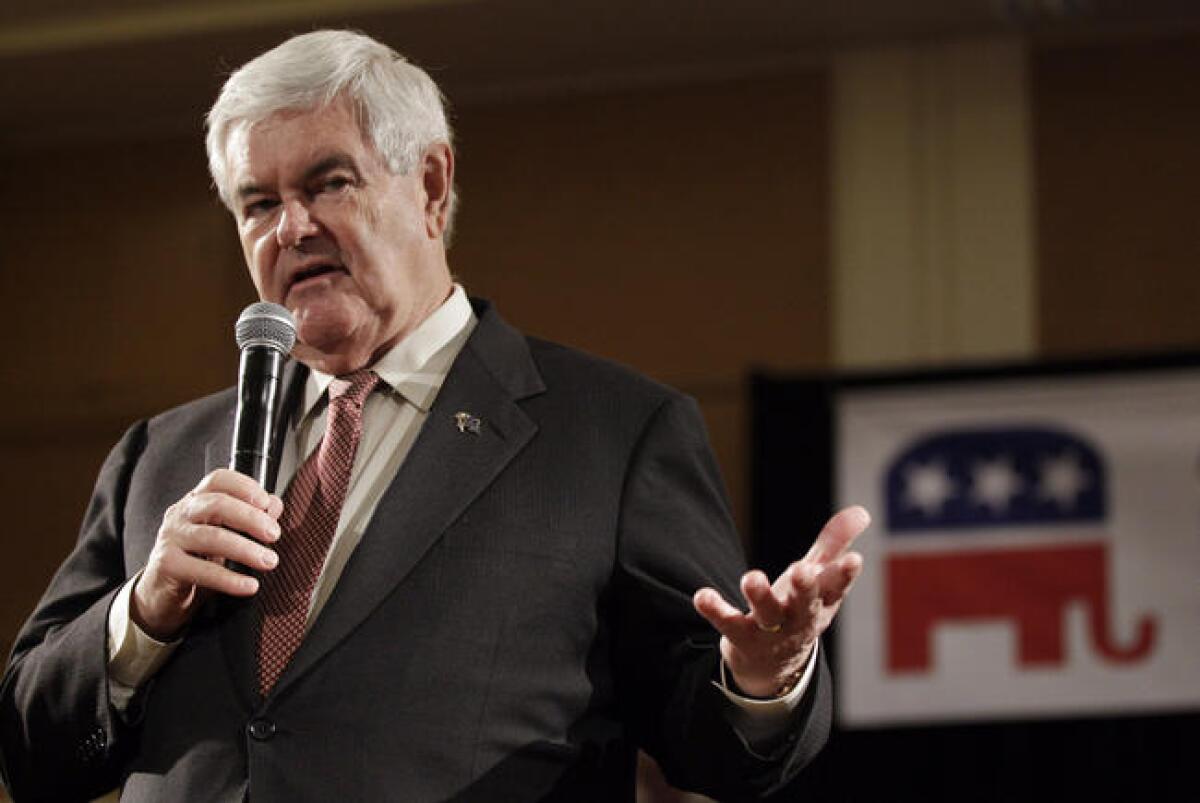
It made for a great slogan during the campaign, but now that he’s won, Donald Trump is finding that maybe he doesn’t actually want to “drain the swamp.”
In fact, the alligators seem to be doing quite well.
Former campaign manager Corey Lewandowski on Wednesday boasted about his access and proximity to Trump in announcing a new consulting firm he plans to open with former Trump campaign advisor Barry Bennett. The firm’s offices will be one block from the White House.
Clients who pony up what are sure to be hefty fees for the firm’s services are being assured by Lewandowski in his marketing materials that he turned down “multiple opportunities within the administration” so he can serve them.
The pitch implies Lewandowski will remain a de facto surrogate for Trump — with all the access that implies — as he bills those seeking to influence the Trump administration for his services.
So perhaps the time is ripe for Trump to stop using the “drain the swamp” phrase. And that is what Trump has decided to do, according to former House Speaker Newt Gingrich, who describes himself as an outside advisor to the president-elect.
“I’m told he now just disclaims that,” Gingrich said in an interview on National Public Radio, referring to the slogan Trump used in the final phase of his campaign to crystallize his promise to cleanse Washington of insiders and self-dealers.
“He now says it was cute, but he doesn’t want to use it anymore,” Gingrich said, adding that perhaps all this swamp draining talk isn’t presidential.
“He’s in a different role now and maybe he feels that as president, as the next president of the United States, that he should be marginally more dignified than talking about alligators in swamps,” Gingrich said.
“I personally have, as a sense of humor, like the alligator and swamp language,” he added. “I think it vividly illustrates the problem, because all the people in this city who are the alligators are going to hate the swamp being drained. And there’s going to be constant fighting over it. But, you know, he is my leader, and if he decides to drop the swamp and the alligator, I will drop the swamp and the alligator.”
Lewandowski, for his part, made no mention of swamps or alligators in announcing his new consulting firm would be open for business.
- Share via
Death penalty in steep decline, but not in Los Angeles County
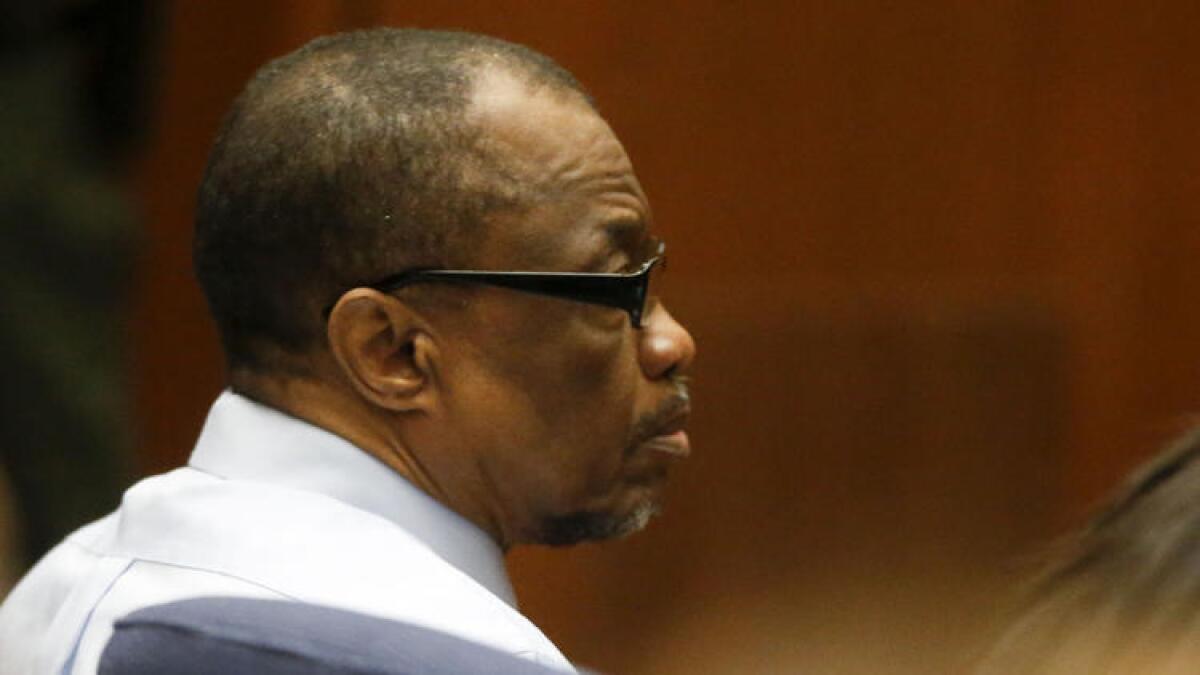
Los Angeles County and the state of California again recorded the most new death sentences this year, amid a sharp decline across the nation in both executions and new death sentences.
Judges and juries in Los Angeles County imposed a death sentence on four murderers during 2016, including Lonnie Franklin Jr., the so-called “Grim Sleeper,” who was convicted of killing 10 women. No other county had more than one death sentence, according to the Death Penalty Information Center.
Since 2010, Los Angeles County has recorded 36 new death sentences, more than any county in the nation.
This year marked the first time in more than 40 years where no state recorded 10 or more new death sentences, the group said in its year-end report. California had the most with nine, followed by Ohio (five), Texas (four), Alabama (three) and Florida (two).
California has by far the nation’s largest death row, with 750 condemned inmates, but it has not carried out an execution in the past decade.
Overall, the report documented the steep decline for capital punishment over the past two decades. The number of new death sentences had fallen by 90%, from 315 in 1996 to only 30 this year.
And the number of executions has fallen from a high of 98 in 1999 to 20 this year. Georgia (nine) and Texas (seven) accounted for most of the executions. The only other states to put inmates to death were Alabama (two), Missouri (one) and Florida (one).
Robert Dunham, the group’s executive director, says the nation is clearly turning away from capital punishment. “Whether it’s concerns about innocence, costs and discrimination, availability of life without parole as a safe alternative, or the questionable way in which states are attempting to carry out executions, the public grows increasingly uncomfortable with the death penalty each year,” he said.
But his report noted that California’s voters, by a 53%-47% margin, rejected a ballot measure to abolish the death penalty, and narrowly approved a measure, by a 51%-49% margin, to limit appeals and expedite executions.
- Share via
New survey finds less optimistic Democrats seeking many paths to their future success
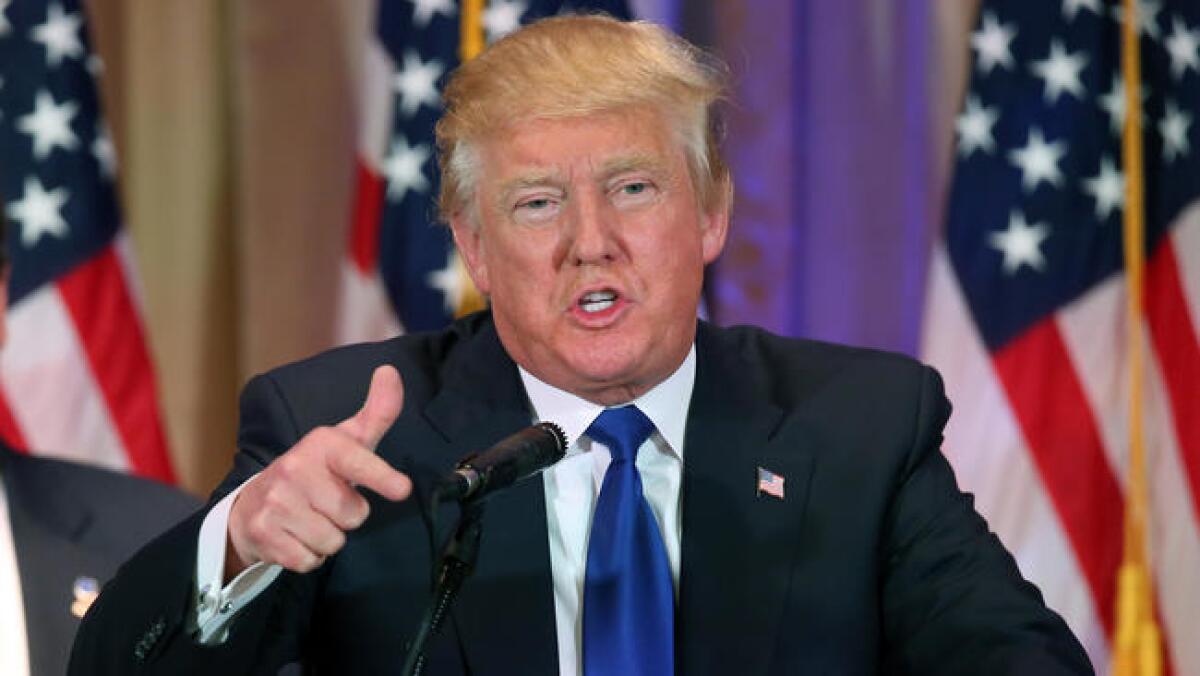
Since Hillary Clinton’s November defeat, Democrats have squabbled over how to return to prominence.
Should they continue to court ascendant voter groups in the country, such as women, minorities and young people? Or should they turn to those who have long been in their camp but abandoned the party nominee this year, such as rural and non-college-educated voters.
The answer, according to a Pew Research poll published Tuesday: Democrats want to walk both paths, simultaneously.
The poll asked Democrats and Republicans whether their parties had spent too much, too little or just the right amount of time meeting the interests and concerns of specific groups of voters.
Among Democrats, 64% said the party had spent too little time talking to rural voters, and 58% said the same about non-college voters.
Almost two-thirds of Democrats said low-income voters had not gotten enough of the party’s attention, and 58% said middle-class voters had been ignored to some extent.
But Democratic voters did not want to let up on the party’s outreach to its stronger supporters this year.
About half said that the concerns of women and African American voters had gotten too little attention, while 43% said the same about Latinos.
In the case of women, African Americans, Latinos, low-income voters, rural residents and younger voters, Democrats were substantially more likely than Republicans to say their party had not put enough emphasis on the groups’ concerns.
The poll suggested far more confidence by Republicans than Democrats in their party’s current positioning.
Much of that may simply be the flood of confidence that accompanies a presidential victory.
When the pollsters asked before the election about their view of their party, 61% of Republicans said they were optimistic, as did 77% of Democrats about their own party.
After the election those figures reversed, with 79% of Republicans optimistic compared with 61% of Democrats.
A key to Trump’s success also was evident in the poll: a chameleon-like ability to make the different ideological groups in the party think he was one of them.
Almost 3 in 5 conservatives said that Trump’s views were conservative. And among moderates, 52% said that Trump’s ideology was a mix of conservative and liberal, echoing their own posture.
But queries about the new president’s impact on his party drew sharply partisan responses. More than two-thirds of all voters said that Trump had forced major changes on his party.
Yet 72% of Democrats cast those changes as bad ones, while 83% of Republicans cast the changes as good ones.
- Share via
The artist and the senator: One built a desert masterpiece, the other a Nevada legacy
When Sen. Harry Reid heard about a reclusive artist building a massive land sculpture across desolate acres in the Nevada desert, he knew they should meet.
It’s not just that Reid enjoys eccentrics and fighters, which he does. Michael Heizer had found an unusual way to express the majesty — and artistry — of the same lonely Nevada landscape that formed Reid’s childhood, when he would escape the dismal, rugged conditions of tiny Searchlight to play in the desert’s hidden springs and abandoned fortresses.
Both men discovered in Nevada what many outsiders miss. Far from seeing a nuclear wasteland, a dumping site or even a playground for gamblers, they drew inspiration from Nevada’s quiet beauty.
Heizer created an American masterpiece — a milelong complex of dirt, rock and cement rising from the desert floor like modern-day pyramids or the Mayan ruins of Chichen Itza.
For Reid, his appreciation for Nevada’s unique landscape became a cornerstone of one of the most lasting yet less-familiar pieces of his political legacy.
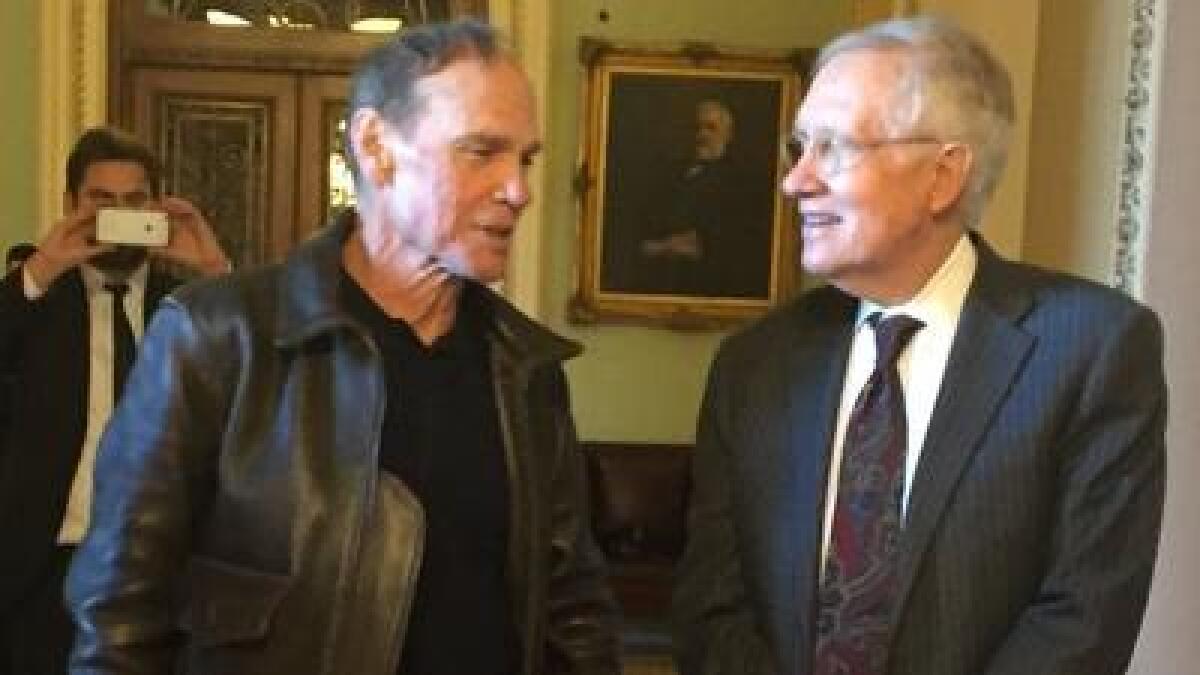
- Share via
With 304 votes, electoral college seals Donald Trump’s election as president — despite more desertions than ever
They convened amid unusual scrutiny, widespread protests and rafts of speculation about efforts to alter the outcome, but, in the end, the nation’s 538 presidential electors mostly stuck to the script Monday, formally sealing Donald Trump’s victory with 304 votes in the electoral college, well above what he needed to capture the White House.
After all the efforts to lobby Republican electors to desert Trump, only two did — a pair from Texas, one of whom voted for former Texas Rep. Ron Paul and the other for Ohio Gov. John Kasich.
Indeed, instead of an uprising against Trump, the day’s voting was punctuated more by small, but persistent, gestures of Democratic discontent with Hillary Clinton. A handful of electors deserted her and a few more tried to, but were deterred by state “faithless elector” laws.
Some of the Democratic dissenters were supporters of Sen. Bernie Sanders of Vermont, who lost the primaries to Clinton but galvanized the party’s left wing. Others were backers of an abortive effort that had tried to recruit Democrats and Republicans to unite behind a third candidate other than Clinton or Trump.
In the end, seven electors voted for a person other than the candidate who won their states — the largest number of electoral college desertions in a presidential contest in U.S. history, eclipsing a record set in 1808.
- Share via
As electoral college meetings end in Hawaii, Bernie Sanders gets a vote that will stick
The last of the 50 states gave Bernie Sanders his first electoral college vote that counted.
Hillary Clinton received three of the state’s four electoral votes after winning 60% of the popular vote here last month. But one elector, David Mulinix, said he cast his vote for the Vermont senator because he was the “most qualified” candidate.
“They can call me faithless, but the point is if we don’t think someone’s qualified — and Hillary Clinton I do not feel is qualified,” he said.
Hawaii’s electors are chosen by the major parties at their state conventions. Mulinix said he joined the party only this election cycle to support Sanders, who he said would have been elected president had he been the Democratic nominee. He had previously told the Associated Press he would cast his vote for Clinton, but said he changed his mind at the last minute.
“She did not lose the vote to Russian hackers; she lost the vote right there at the convention,” he said, referring to the Democratic National Convention, where he said Sanders’ backers were treated unfairly.
“They robbed us, and the millennials know it.”
Mulinix, who, like his fellow electors, wore a lei made of green jade flowers, arrived for the vote with a list of candidates who had received votes in other electoral college meetings across the country. He was aware that an elector in Maine had tried to vote for Sanders but that his vote had been invalidated. An election official said the vote for Sanders here would count.
The brief proceedings here in a nondescript conference room on the state Capitol’s third floor began with another elector, John Bickel, asking whether there was any penalty for electors who cast their ballots for someone other than the winner of the statewide vote.
He said later that he had asked because he suspected someone might stray.
“The electoral college is outdated. If any election has proved the electoral college is outdated, it’s this one,” Bickel said.
Dolly Strazar, another elector and the vice chair of the state Democratic Party, said she had long supported the electoral college because it ensured some degree of competition between large states and small ones like Hawaii.
“It really seems in our times, it’s thoroughly outdated,” she said.
Janice Bond, the fourth elector, said she would have voted for Sanders but did not believe she was able to. She also expressed regret that President Obama, who was born in Hawaii and is vacationing here with his family, did not attend the meeting.
“To have him be on our island and not show face was disappointing,” she said.
- Share via
‘No fireworks’ as Nevada electors cast votes for Clinton
Nevada’s six electors cast their votes for Hillary Clinton on Monday afternoon in Carson City, reflecting her victory in the swing state despite losing the overall electoral college vote to President-elect Donald Trump.
Clinton won Nevada by almost 3 points over Trump, and the swing state was one of her few bright spots on election day.
The six electors – five from northern Nevada and one from Las Vegas – cast their ballots before about 75 people who had packed into the Old Assembly Chambers of the state Capitol. A few brought signs in support of Clinton, and there was some applause when the votes were cast. It all took place in less than a half-hour.
“No fireworks,” said Wayne Thorley, deputy secretary of state for elections.
He said about 40 people showed up in front of the state Capitol in the morning in sub-freezing temperatures to also show support for Clinton. Thorley said he hadn’t anticipated a lot of controversy as the electors were required to sign a pledge before voting that said they wouldn’t deviate from Nevada’s Nov. 8 election results.
- Share via
In solemn ceremony, California electors cast votes for Hillary Clinton
In a proceeding long on formalities and short on speeches, California’s 55 electors cast their vote for Democratic presidential candidate Hillary Clinton on Monday, a ceremony that coincided almost exactly with Republican Donald Trump clinching the national electoral college win.
Contrasting with the spirited protests outside the state Capitol, the mood in the state Assembly chambers was muted, even a bit glum, as electors, tapped by the state’s Democratic establishment, convened to cast their votes for Clinton. California, which overwhelmingly backed Clinton in the presidential contest, requires all 55 electors to back the state’s winner.
“Today’s solemnity and formality reminds us that in our nation, American greatness and American independence, rests on a foundation of law,” said Assemblyman Ken Cooley (D-Cordova), who presided over the event.
As written ballots were distributed, the room was completely silent, save for the clicking of camera shutters. Just moments before voting began, Trump, Clinton’s rival, had secured the electoral college win, with Texas, California’s perennial rival, putting him over the top. His victory went unacknowledged in the ceremony.
Among the electors were current elected officials, such as Assemblywomen Susan Talamantes Eggman of Stockton and Shirley Weber of San Diego. Others included Christine Pelosi, daughter of House Minority Leader Nancy Pelosi, and Laphonza Butler, leader of the powerful labor union SEIU in California. Electors did not make individual speeches during the main ceremony, and Trump’s name was hardly mentioned.
But there were subtle references to the rancorous political season: Rev. Bob Oshita, the Assembly chaplain and former reverend of the Sacramento Buddhist Church, urged leaders to engage in “calming self-reflection” in an opening prayer.
The tone grew considerably sharper at the end of the gathering, when Pelosi offered a motion calling for an investigation into Russian efforts to influence the election outcome.
“I move that as an Electoral College, we do not normalize this election. We do not accept Russian interference in our election,” Pelosi said. Her motion was adopted by electors, with applause.
This post was updated at 3:32 p.m. with comments from Christine Pelosi. It was originally published at 3:12 p.m.
- Share via
All of Florida’s electoral votes go to Trump
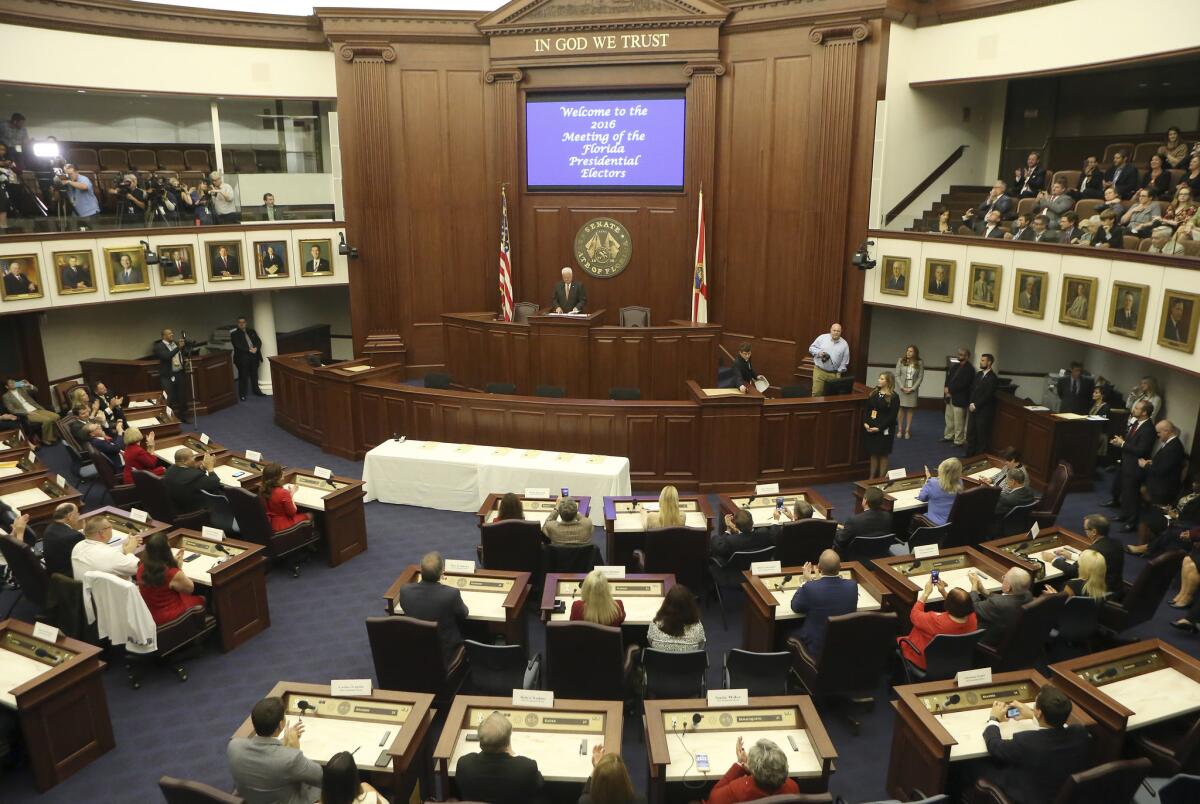
Donald Trump officially won all 29 of Florida’s electoral college votes on Monday during a ceremony held at the Capitol in Tallahassee, despite pleas from protesters to electors to change their vote at the last minute.
About 100 protesters gathered outside the Florida Senate chambers before the vote, chanting “love trumps hate” and “flip the vote” and holding signs that read “Vote Your Conscience, Don’t Make Russia Great Again!”
The electors, made up of Republican Party of Florida members and high-ranking elected officials like state Atty. Gen. Pam Bondi, Senate President Joe Negron and state party chairman Blaise Ingoglia, did their best to ignore the protesters.
- Share via
Mexican billionaire Carlos Slim was a Trump nemesis. Now the president-elect says he’s ‘wonderful’
Donald Trump has decided that Mexican billionaire Carlos Slim, one of his favorite villains during the presidential election, might not be so bad after all. He’s even “wonderful,” Trump now says.
The two dined together Saturday at Trump’s Mar-a-Lago resort in Florida, after which Trump had only nice things to say about Slim, according to a report in the Washington Post. Trump described the interaction with his erstwhile nemesis as “a lovely dinner with a wonderful man.”
This is not how Trump talked about Slim, one of the world’s richest men, during the election. The Mexican billionaire was a regular target of the then-GOP nominee because of his large ownership stake in the New York Times. Add to that Slim’s generous contributions to the Clinton Foundation and his citizenship in the country Trump reveled in attacking, and he made for good fodder at Trump rallies.
When Trump objected to the New York Times coverage of his campaign — and its reporting on the allegations by multiple women of past inappropriate sexual advances by Trump — he alleged it was all part of a conspiracy cooked up by Slim. Trump called the outlet’s reporters “corporate lobbyists for Carlos Slim and for Hillary Clinton.”
The New York Times called Trump’s charges a fabrication, saying Slim had never inserted himself in editorial decision making there. And Trump offered no evidence to the contrary. A spokesman for Slim said at the time the two had never met, and the Mexican businessman had no interest in involving himself in the U.S. election.
Now they’ve met. The takeaway from the meeting, though, is murky. Maybe it indicates Trump is softening his posture toward Mexico — or maybe it just indicates billionaires enjoy the company of other billionaires.
- Share via
Meet the California electors
Among the electors are Janine Bera, the wife of Rep. Ami Bera of Elk Grove; Christine Pelosi, the daughter of House Minority Leader Nancy Pelosi and chairwoman of the state party’s women’s caucus; Eileen Feinstein Mariano, granddaughter of Sen. Dianne Feinstein; and Olivia Reyes-Becerra, daughter of Rep. Xavier Becerra of Los Angeles.
State Assemblywomen Susan Eggman of Stockton and Shirley Weber of San Diego, former state Sen. Christine Kehoe of San Diego, Los Angeles City Councilwoman Nury Martinez and Laphonza Butler, president of the Service Employees International Union chapter that represents home care employees, also are on the list.
- Share via
All of California’s electoral votes go to Clinton
- Share via
Three Washington state Democratic electors vote for Gen. Colin Powell, one for Faith Spotted Eagle
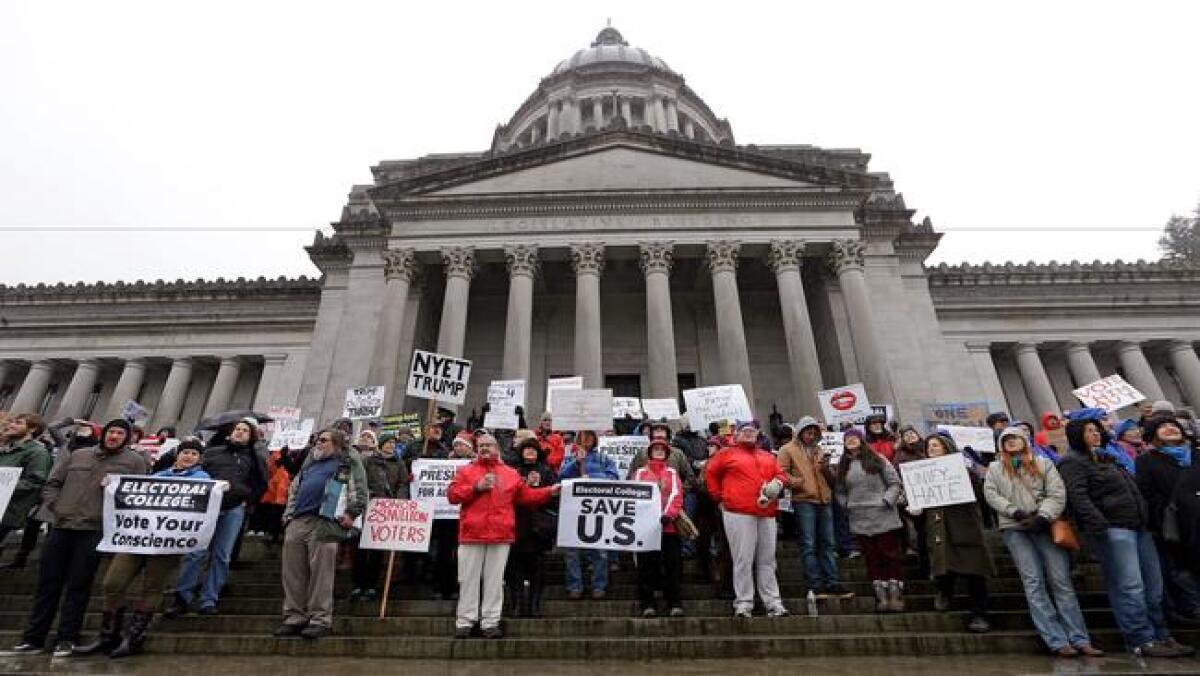
Despite a statute binding the 12 members of the electoral college to vote for the winner of the state’s 2016 presidential election popular vote, four Washington electors made history and risked a $1,000 fine by voting for someone else Monday. But it wasn’t Donald Trump.
Hillary Clinton, supported by 57% of the state’s voters, wound up with eight of the 12 electoral votes at a session held in the State Capitol building here.
Gen. Colin Powell received three votes. And Faith Spotted Eagle, an elder of the Yankton Sioux, received one.
- Share via
Colorado elector says he was ‘oppressed’ by state law into voting for Clinton
In Denver, all nine electors voted for Hillary Clinton, after one was replaced for casting his ballot for Republican Ohio Gov. John Kasich instead.
A boisterous crowd packed the state Capitol and booed when elector Michael Baca was dismissed and another sworn in to take his place.
“Vote your conscience!” someone cried.
The new elector voted for Clinton.
Hecklers screamed “Resign! Resign!” at Secretary of State Wayne Williams after he shooed Baca’s lawyer off the podium.
Suspense had been building for weeks over how the electors would vote. Two courts blocked their attempts to vote for someone other than Clinton. State law here says electors must support the candidate who won the popular vote.
On Sunday night they went to court again, this time asking a judge to reject a new oath drawn up by the secretary of state requiring electors to pledge to support the winner of the popular vote. Their motion was denied.
As they waited, the crowd sang “This Land is Your Land” and “America the Beautiful.”
But once the electors filed in, it was over quickly.
Elector Robert Nemanich said he was “oppressed” by state law into voting for Clinton and would go to the U.S. Supreme Court. He did not elaborate.
Lance Armstrong, 68, stood outside with an American flag.
“I’m glad some of the electors made a point today,” he said. “Any point is better than none.”
- Share via
Trump officially gets 270th electoral vote, sealing his election as president
Donald Trump has obtained the required 270 electoral votes to become president.
Although electors in dozens of states still have to vote, the electoral balloting in Texas put Trump over the majority threshold, according to a state-by-state tally by the Associated Press. Thirty-six of the state’s electors voted for Trump, one for John Kasich and one for Ron Paul.
The next, and last, official step in the electoral process is for Congress to count the votes. Under the procedure set out by the 12th Amendment to the Constitution, that formal process is scheduled for Jan. 6.
Some anti-Trump activists had hoped against hope that they could persuade electors in states that voted for Trump to defect, but their efforts were unsuccessful.
Electors are nearly all party loyalists. Additionally, they faced more than two centuries of tradition and, in some states, legal obligations that called for them to cast their ballots according to which candidate won the popular vote in their states. No defectors have ever changed the result of a presidential election.
Four electors today successfully defected in Washington state. Instead of voting for Hillary Clinton, who won the state’s popular vote, three electors voted for former secretary of State Colin Powell and one voted for Faith Spotted Eagle, an environmental activist. Electors in two other states who tried to vote against the state’s winner were replaced with alternates. There may be additional defections in the remaining states, but since Trump now has a majority of the electoral votes, those would not be enough to change the result.
- Share via
Emotions high in Maryland as electors unanimously vote for Clinton
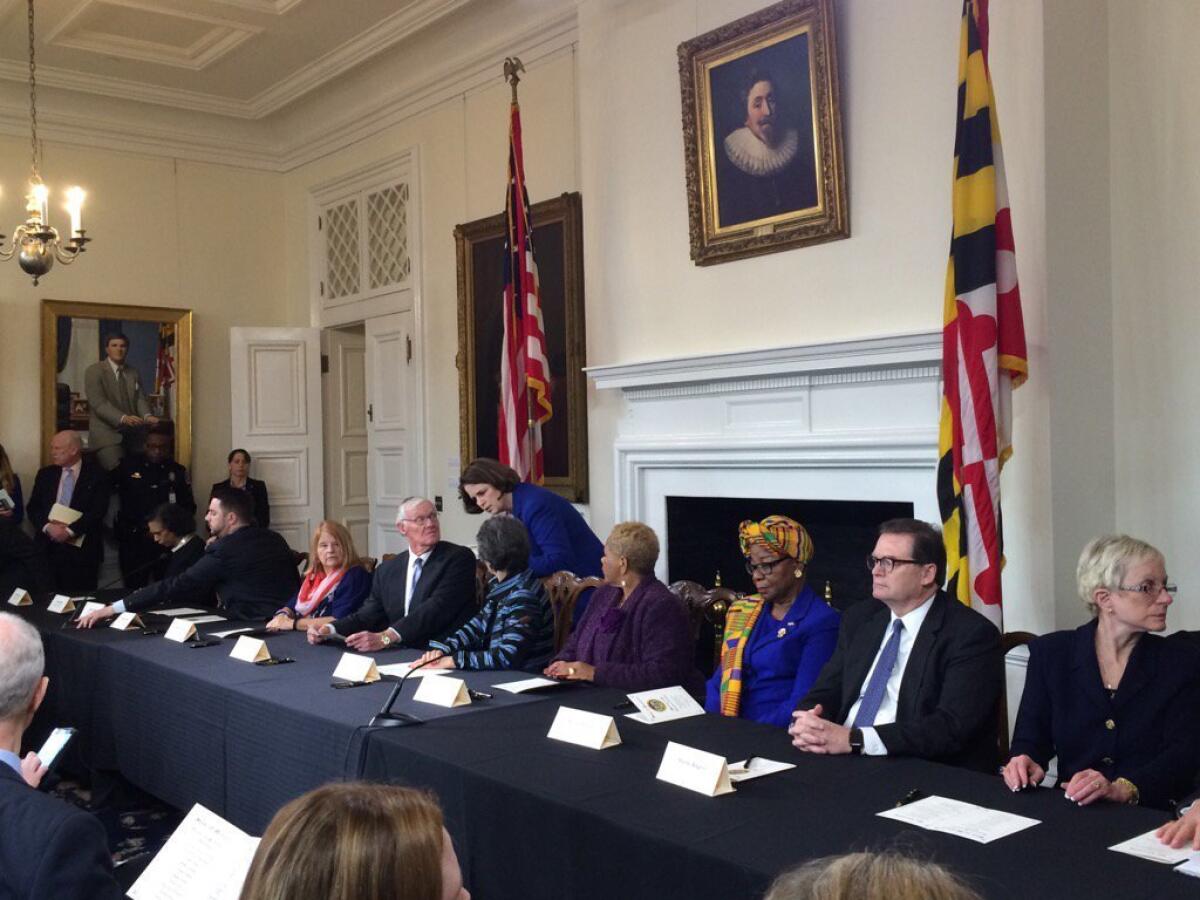
As Maryland’s 10 electors unanimously cast votes for Democrat Hillary Clinton for president Monday, several said they were privileged to vote for the county’s first female presidential nominee.
Outside, hundreds of anti-Trump protesters cheered as the solemn ceremony unfolded on live-stream television. A state delegate, who had the ceremonial task of handing the electors’ votes to another official, wept while executing her duty.
“This is an emotional moment for many, many women in this country and in this state,” said Del. Maggie McIntosh, a Baltimore Democrat. She added later: “I guess I didn’t cry enough on Nov. 8.”
Maryland’s electors were bound by state law to vote for the winner of Maryland’s popular vote, which Clinton secured with more than 60% of the ballots cast.
About 100 protesters who had been chanting and singing around the historic State House grounds for at least four hours before the vote said they came in solidarity with protesters in Republican state capitols, pleading with electors not to endorse President-elect Donald Trump.
“This is appalling and unacceptable, and I’m hoping the Republicans, in particular, rise above and do the right thing,” said Cheryl Kreiser, a retired teacher from the Washington, D.C., suburb of Silver Spring. For an hour every day for the last 21 days, Kreiser has protested Trump’s win on the steps of the Lincoln Memorial. “It was the only way I could cope with the disappointment,” she said.
Maryland’s Republican Gov. Larry Hogan, who wrote in his father’s name rather than vote for Trump on election day, opened Maryland’s 58th electoral college meeting but left the room before electors were sworn in. Each elector had been appointed by the Maryland Democratic Party state chair, Bruce Poole, who reminded the crowd the United States is not a direct democracy ruled by the popular vote.
“A lot of people lose sight of the fact that we’re a republic. We’re not a democracy,” Poole said. “The whole idea was that the president would not be chosen just by the whims of the moment, but instead there would be an opportunity for people who were thoughtful, who had judgment, who had integrity to take a step back from the moment of emotion and consider what would be in the best interest of the country.”
Before he introduced Maryland’s electors, Poole lamented the state of political discourse in the country.
“We live in the age of information. It is not necessarily the age of wisdom or age of judgment,” he said. “People on both sides, on all sides, make decisions at the snap of a finger.”
Maryland was both the model for creating the electoral college and the first state in the country to vote to bypass it. Framers modeled today’s system after the way the Maryland House of Delegates selected Maryland senators, a process the state later abandoned after it was considered undemocratic, according to a history of the electoral college written by staff at the Maryland Board of Elections. Hogan noted the state is one of six to have participated every year since 1789.
In 2007, Maryland was the first state to vote to sign the National Popular Vote Interstate Compact, a promise designed to award the electoral college to the winner of the national popular vote. It required enough states to comprise 270 votes to sign on for it to take effect. So far, only 10 states — including California — with a combined 165 votes have signed the compact.
The president of Maryland’s electors, Courtney Watson, also co-chaired Clinton’s campaign in Maryland. She said she thought changes to the electoral college should be considered and described Monday as a poignant moment for Maryland residents.
“It’s a very emotional time,” she said. “Many of us have worked long and hard, and for the first woman candidate. The point, though, is that people are still moved and even more engaged. And that’s what I find promising for our future and the future of women.”
- Share via
Christine Pelosi, daughter of Nancy Pelosi and California elector, demands to know the truth about Russian influence
California elector Christine Pelosi on Monday told crowds gathered outside the Capitol that she has been part of a chorus of people demanding to know the truth about Russian interference in the November presidential election.
Pelosi, House Minority Leader Nancy Pelosi’s daughter, is leading 10 other electors in a call for an intelligence briefing on Russian influence.
Shouting into a microphone Monday, she said Russian hackers aim to turn the American people against each other and had marginalized her and others for speaking out.
“They trespass on servers,” she said. “They receive stolen emails. They pump out stories that day after day focus on scandal rather than policy, rather than talking about climate and immigration and human rights.”
California’s meeting of electors is about to get underway in the state Capitol.
- Share via
After prayer for national unity, Georgia electors vote for Trump
Outside the Georgia Capitol today, some may have held a flicker of hope that a GOP elector would refuse to cast a ballot for Donald Trump as 45th president of the United States.
Yet among the inner circle of Republicans who gathered inside the cozy, wood-paneled Senate chamber, there was little doubt about what would unfold.
One by one, all 16 electors -– dressed in formal business suits and red dresses, bow ties and blazers -- cast their ballots for the contentious Republican candidate.
It was a short ceremony, with little opportunity for disruption. Security guards prevented the public from entering the chamber, cordoning off the hallway outside the room with a red rope and locking the main door before proceedings began.
The electors chosen by Georgia’s Republican Party included well-connected attorneys and real estate agents, a high school teacher and a farmer. As they waited for the gathering to begin, many snapped selfies and waved at loved ones above in the upper gallery.
After a call to order by the Georgia Republican Party chair, the electors bowed their heads, and Rachel Little, an elector and grass-roots Republican organizer, delivered an invocation.
“Lord, we know we are a divided country right now,” she said. “We pray that you will unite us. … We pray that [those who oppose Trump] will see our conservatism lived out in a gracious way.”
In a short speech, Gov. Nathan Deal hit out at activists who had bombarded electors with emails, letters and phone calls in an effort to sway their votes.
“You have been the subject of harassment by those who perhaps are not as dedicated to the proposition of what this body is supposed to do as they are agitated by the fact that the people didn’t do what they wanted them to do.”
“I have every confidence you will not succumb to that,” Deal told the electors. “My words to you: Do your job.”
Shortly before the electors cast their ballots, Rep. Barry Loudermilk, a Republican who represents Georgia’s 11th District, took to the podium to present a short history of the electoral college.
“Our founders actually despised the idea of democracy because mob rule often results in a decision made out of pure emotion,” Loudermilk told the electors, after referencing the “noise” of protesters outside. “It does not result in good government. In fact, our founders often cited the historic trial of Jesus as how mob rule does not work.”
The electoral college was devised to protect the integrity of government, Loudermilk said.
“To protect those who live in the rural areas of America, those who work, those who are part of the farming communities and part of the industrial communities, those who live and work every day, that their interests are protected as well of those who make their living on Wall Street.”
For a moment earlier this year, there was an inkling of a Republican revolt against Trump in Georgia. In August, Baoky Vu, a GOP elector based in Decatur, Ga., admitted he might not cast his ballot for Trump if he won. Within hours, however, he was forced to resign.
Trump went on to win 51% of Georgia’s popular vote. On Monday, Vu did not show up at the Capitol, and he was formally replaced by a solid Trump backer, John Padgett, the chairman of the Georgia Republican party.
There seems little chance that Georgia legislators might vote to overhaul the electoral college. Earlier this year, Republican legislators authored two bipartisan pieces of legislation in Georgia’s House and Senate that would have made Georgia’s electoral votes based solely on the outcome of the national popular vote. Yet both bills stalled, and Republicans say there is little momentum to revive the debate.
“The system prevents the tyranny of the majority,” said Kirk Shook, an elector who is a high school teacher in rural Oconee County. He scoffed at those who, since the election, had sought to overhaul the electoral college system.
“There’s all this weeping and wailing and gnashing of teeth,” Shook said of those who opposed Trump’s win. “And rightly so. There’s going to be a Republican president, a Republican Congress and a Republican Supreme Court. With the stroke of a pen, 90 percent of what Obama considered his legacy will be gone.”
- Share via
Four Washington state electors defect from Clinton; one chooses Faith Spotted Eagle instead
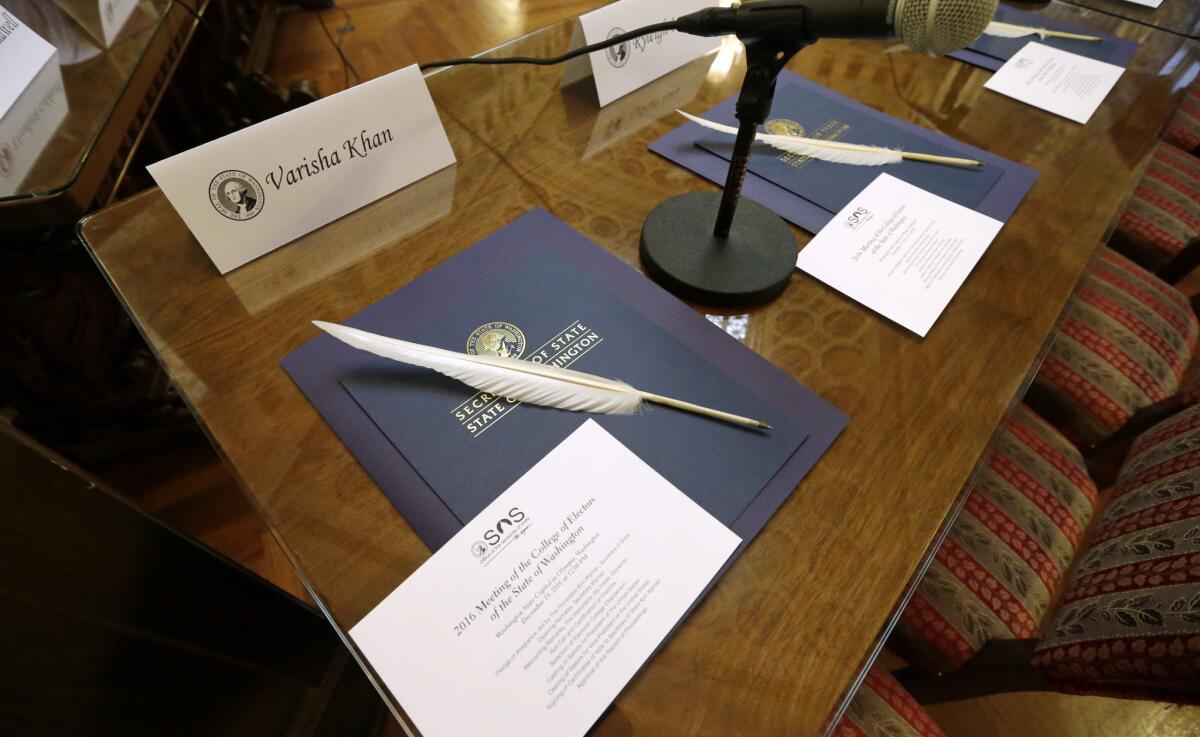
Four members of the electoral college in Washington state cast their votes for a candidate other than Democrat Hillary Clinton, who won the state’s popular vote.
It’s the first time in four decades the state’s electors have broken from the popular vote for president. Washington’s 12 electors met Monday afternoon in the state Capitol to complete the constitutional formality. Clinton got eight votes while other candidates got the remaining four.
Elector Bret Chiafalo, who earlier in the day said he planned to vote for Republican Ohio Gov. John Kasich, said that he ultimately changed his vote to former Secretary of State Colin Powell after conversations with other Washington electors. The exact breakdown of the other four votes wasn’t immediately known, although at least one vote was cast for “Faith Spotted Eagle.”
In last month’s election, Republican Donald Trump won 306 electoral votes to Clinton’s 232, though Clinton’s tally will now be lower.
A candidate needs 270 electoral votes to win.
The last time an elector broke from the popular vote in Washington was in 1976, when Mike Padden, who is currently a Republican state senator, voted for Ronald Reagan instead of Gerald Ford, who had won the state.
- Share via
In California, which Clinton won in a landslide, protesters are railing against the electoral college
- Share via
Hundreds protest the electoral college at Capitol building in Sacramento
Cheers and chants of “U.S.A” and “Keep him out” filled the air Monday, as dozens of protestors gathered outside the California Capitol in a last ditch attempt to sway the electoral college from voting for president-elect Donald Trump.
Speakers called Trump a celebrity and authoritarian “unfit” for the presidency. And they urged Congress to do away with the electoral college process, which they described as an outdated and broken system susceptible to foreign influence and manipulation.
“This is a secret system of voting where we are not allowed to see where the votes are actually coming from or how they are counted,” Brent Turner, with the movement organization Democracy Spring, shouted into a microphone.
John Franco, a 52-year-old business owner visiting Sacramento from New Orleans, said he came to the demonstration with his family to protest that secret process.
“We don’t feel a system that can be manipulated represents the interests of the people who voted for Hillary Clinton,” he said.
Rochelle Towers, 68, said she drove in from Oakland in an attempt to persuade the electoral college from voting for Trump. She said she would not have to live through a lot of what its decision would set in motion.
“But my children and grandchildren will,” she said. “Even though this is a real long shot, I’ll take any shot that there is.”
- Share via
Colorado elector removed after refusing to vote for Clinton
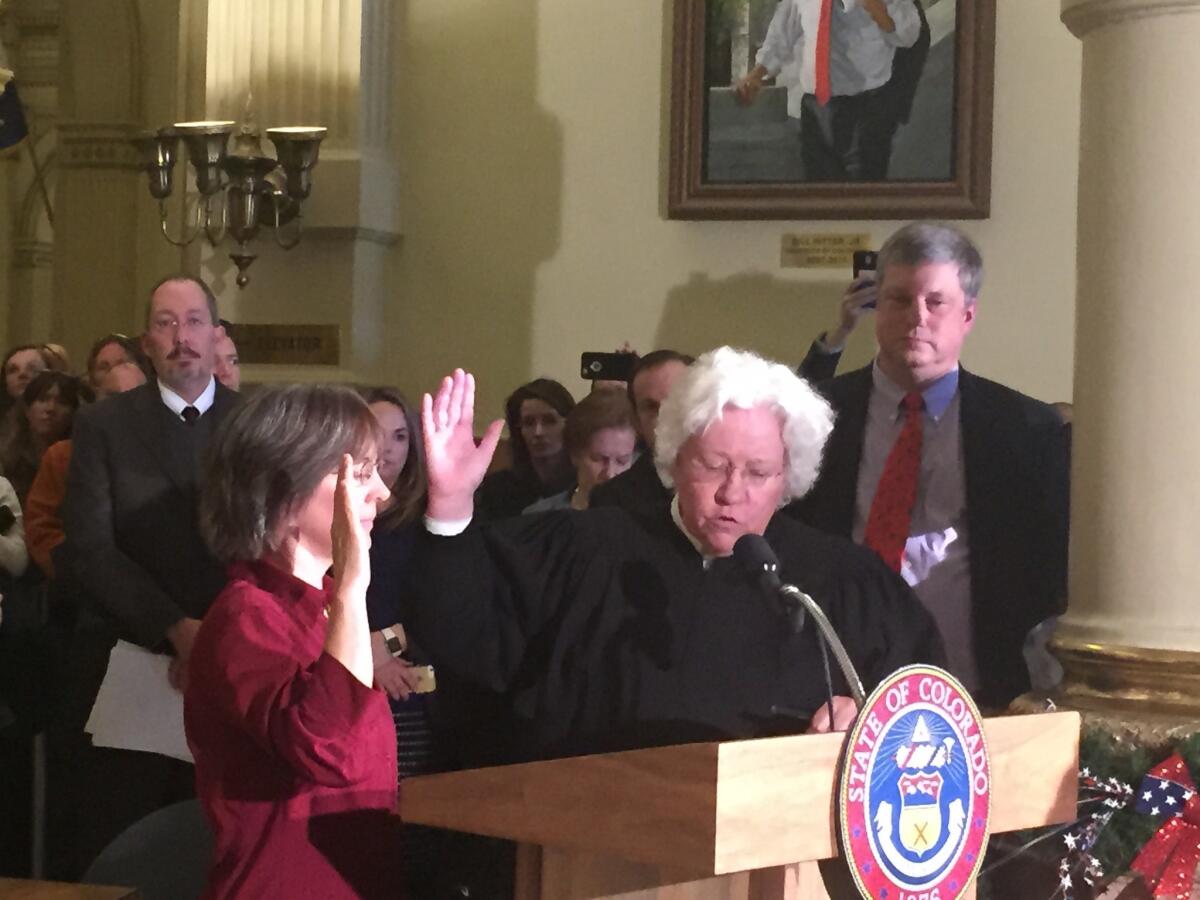
Eight of nine Colorado electors have voted for Hillary Clinton.
One elector, Michael Baca, refused to vote for Clinton and was immediately replaced with an alternate, who was sworn in on the spot.
As the crowd jeered, the new elector promptly voted for Clinton.
Shouts of “Resign!” followed Secretary of State Wayne Williams’ announcement of the results.
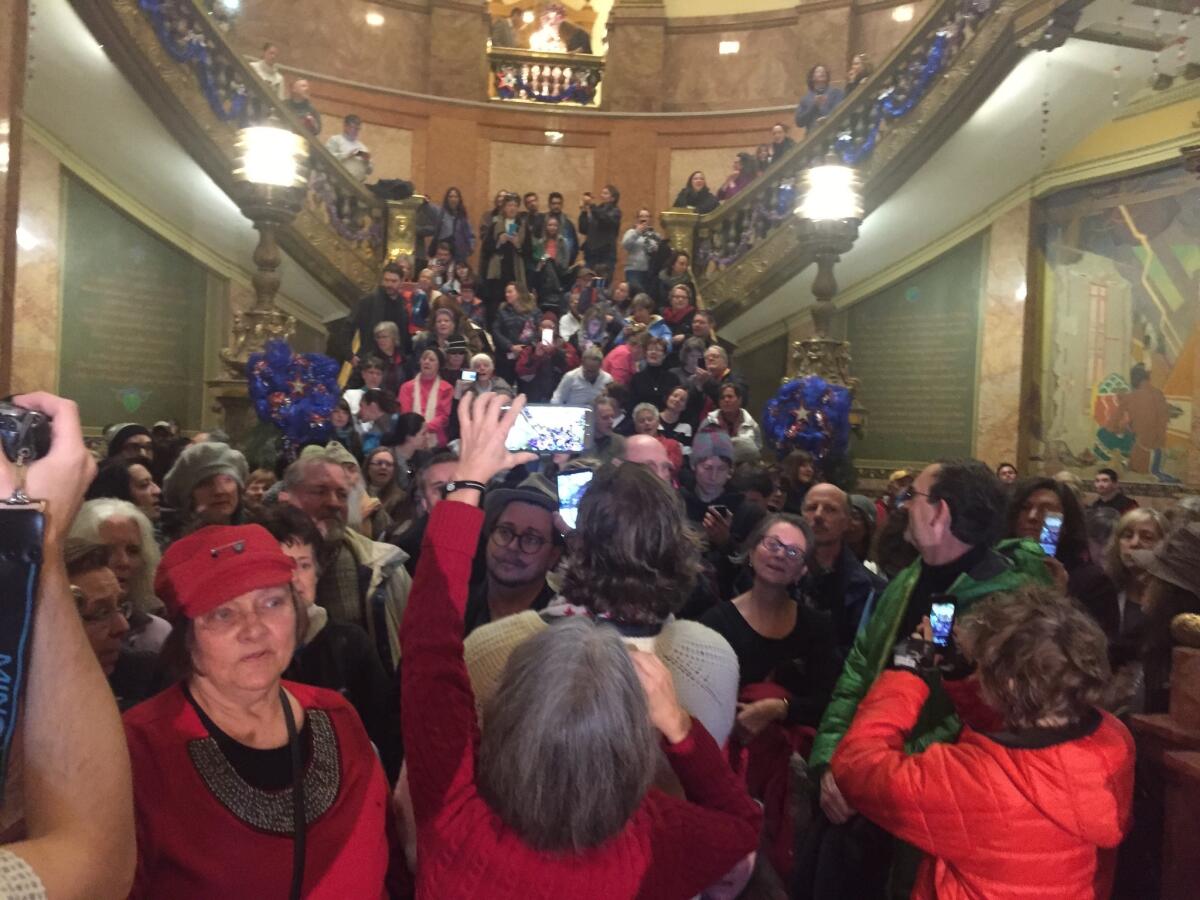
- Share via
Electors say they have been barraged with emails
Arizona elector J. Foster Morgan said he had received several letters protesting the election of Donald Trump, but experienced nothing on the scale of some his fellow Arizona electors whose email addresses were distributed to protest lists.
“They heard the worst thing imaginable,” Morgan said. “I just got a few letters.”
Despite protests outside the meeting, Morgan said, the vote “went fine.”
Eleven votes for Donald Trump.
- Share via
Democratic electors in Minnesota and Maine try to vote for Bernie Sanders
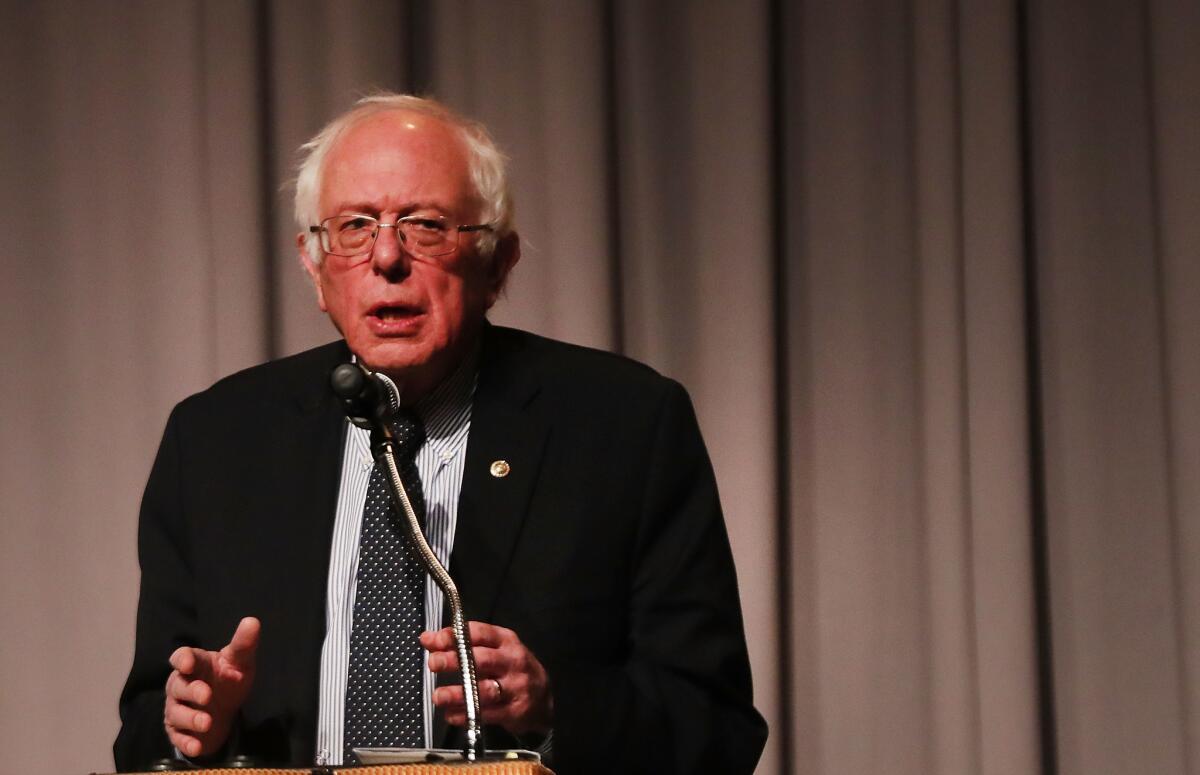
A second elector — this one in Minnesota — has refused to cast a vote for Democrat Hillary Clinton in Monday’s electoral college tally.
It wasn’t immediately clear why Muhammad Abdurrahman didn’t vote for Clinton, but he was a delegate for Bernie Sanders at the Democratic National Convention.
The electors are pledged to cast Minnesota’s 10 electoral votes for Clinton since she won the state.
Abdurrahman was immediately replaced by an alternate who later voted for Clinton.
Earlier in the day, a so-called “faithless elector” in Maine cast his vote for Sanders, who lost the Democratic presidential nomination to Clinton. David Bright said on his Facebook page that he cast his vote for Sanders because voting for Clinton would not have helped her win.
But he ultimately voted for Clinton on a second vote after being ruled out of order.
- Share via
Utah voting goes off without incident — six for Trump
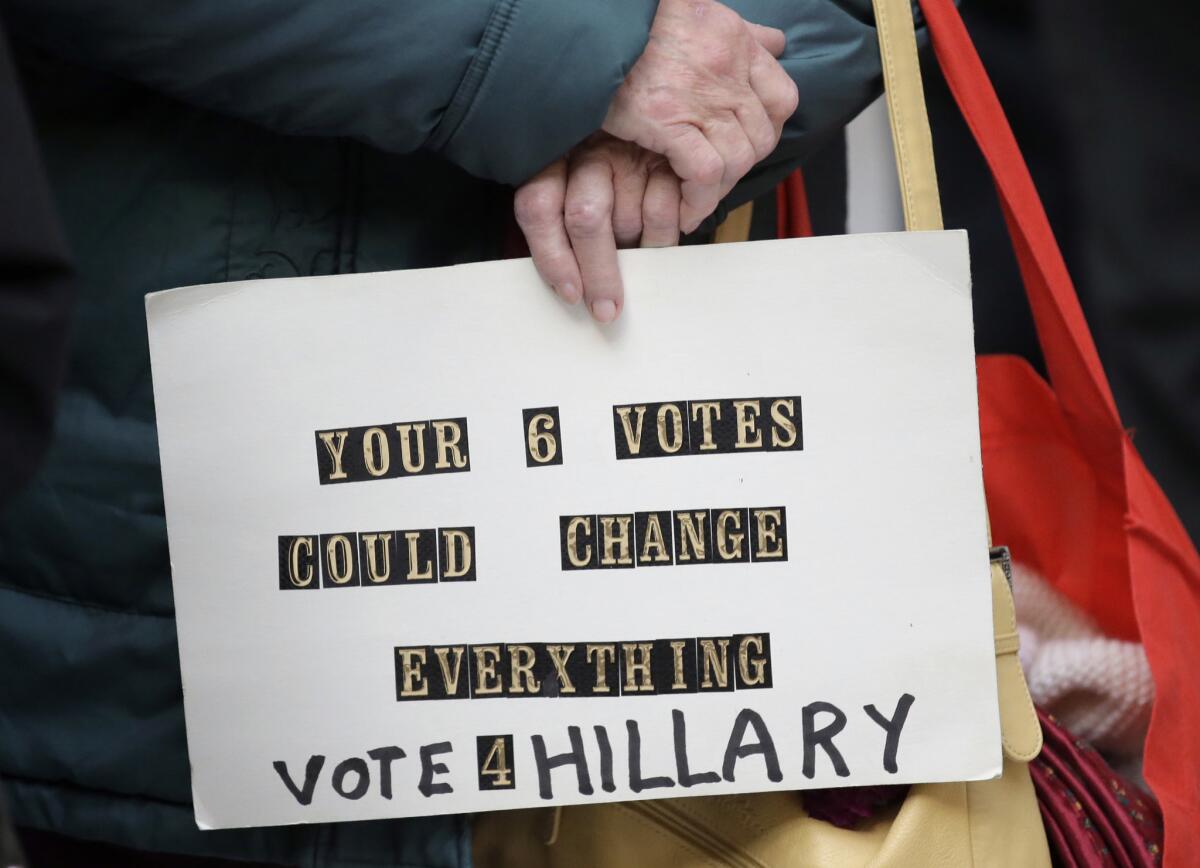
Despite chants of “vote your conscience” and “the whole world is watching” from more than 100 protesters, Utah’s six electors cast their votes for President-elect Donald Trump today in Salt Lake City.
Lt. Gov. Spencer Cox announced the official results within minutes of the votes being cast, but he was drowned out by jeers of “Shame on you” by the protesters.
“I hope you know this is what our country is all about,” Cox said. “I hope all of us here are sincerely grateful we live in a country where we have the opportunity to express ourselves.”
The six electors -- two small-business owners, a custom metal worker, a farmer, a Brigham Young University professor and a Republican activist -- quickly introduced themselves before casting their ballots.
The votes were largely a formality, as the state requires electors to vote for the winner. Trump defeated Democratic nominee Hillary Clinton by getting 45%t of the vote. He also withstood a challenge from Evan McMullin, who garnered 21% in what was largely a protest vote from those, many of them Mormons, who felt uncomfortable casting a ballot for Trump.
Cox said the turnout for this year’s electoral vote was a far cry from 2012, when four people and one camera crew showed up.
“I’m a big fan of the electoral college,” Cox said to the restless crowd. “You don’t have to boo me now. You can boo me later.”
About 200 protesters and Trump supporters arrived in the rotunda of the state Capitol about three hours before the votes were cast shortly after noon. The room where the votes were cast was too small to accommodate everyone, and the fire marshal sought to limit occupancy to about 130 people.
Interest was high, and the vote even drew Hawthorn Elementary School students, who helped lead the room in the Pledge of Allegiance.
Cox thanked them for coming and told them they were “getting an experience you’ll never forget.”
- Share via
Clinton elector balks in Minnesota
In Minnesota, where the 10 electors had all pledged their votes to Hillary Clinton, one of them refused to go through with it. Elector Muhammad Abdurrahman opted not to vote. He was replaced by an alternate, who cast a vote for Clinton.
- Share via
As Pennsylvania went unanimously for Trump, a voice from the back: ‘Thank you’
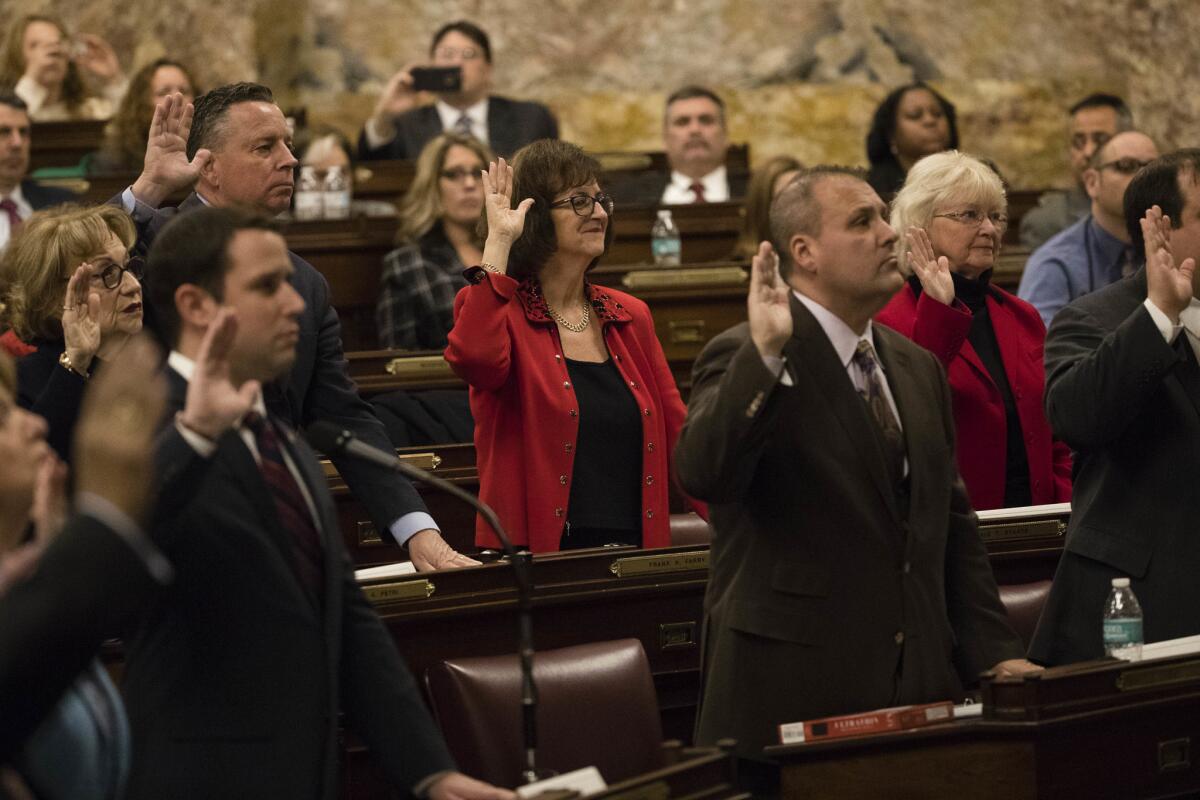
In Pennsylvania’s capital of Harrisburg, the state’s 20 electoral college voters selected Trump today in a ceremony marked by traditional pomp and bellowing protests.
Trump won the popular vote in Pennsylvania by 44,292 votes — the first Republican presidential candidate to do so since 1988. It earned him the state’s 20 electoral college votes.
When the result was announced shortly before 1 p.m. inside the gilded, ornate House chamber, protesters jeered and supporters cheered.
“Shame on you,” a woman’s voice called down from the public balcony.
“Thank you,” a male voter’s voice responded back from the floor.
- Share via
The latest electoral college vote count: 241 Trump, 115 Clinton
- Share via
How some electors have reacted to all the mail from voters
- Share via
Protesters outside Florida Senate chambers: ‘Trump is dangerous’
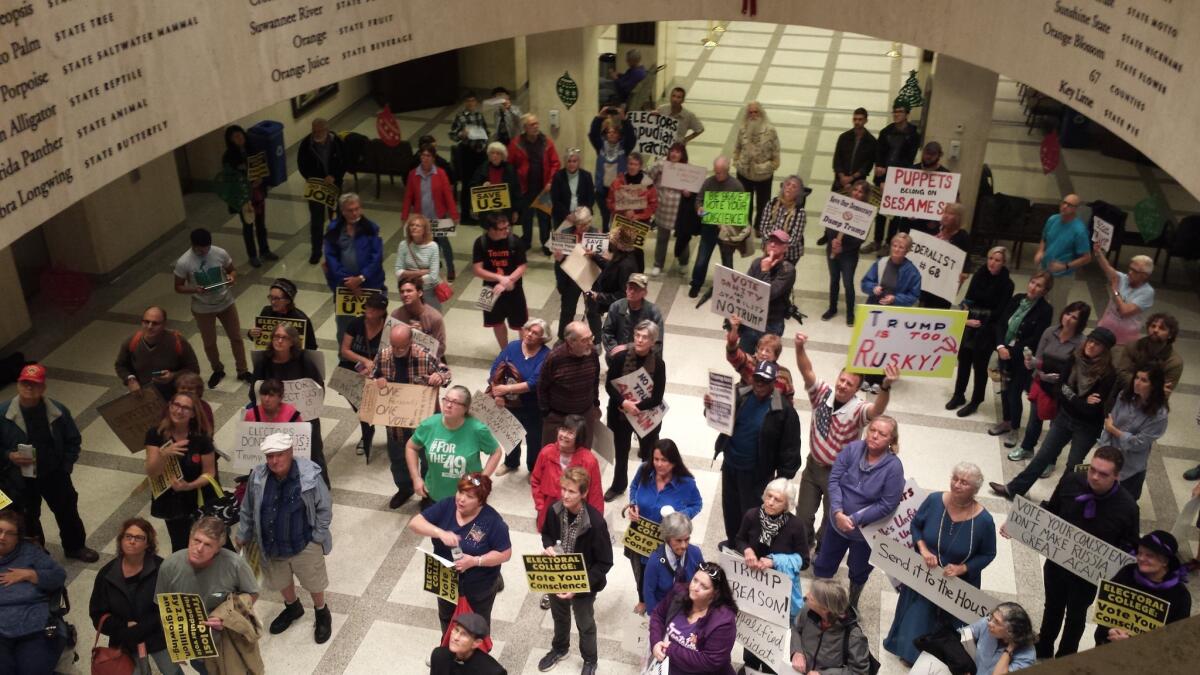
A group of about 100 protesters huddled outside the Florida Senate chambers Monday morning as Florida’s 29 electors prepared to cast their votes for Donald Trump in the formal electoral eollege vote ceremony later in the day.
The protesters held signs that read “You can fix this, keep America free,” “What would Hamilton do?” and “Electors: Protect Us, Trump is Dangerous,” pleading for electors to change their minds and not vote for Trump, who beat Hillary Clinton by 112,911 votes in Florida, about 1.2%t of all votes cast in the state.
Tallahassee resident Bonnie McCluskey held a sign reading “Send it to the House.” If enough electors across the country do not vote for Trump, he’ll fall short of the 270 electoral votes required to win the presidency, sending the matter to the U.S. House.
“The reason I’m here is because I don’t trust [Trump]) and I think he will harm the United States,” McCluskey said. “My grandmothers were suffragettes; their ancestors were willing to be traitors to the British crown to create this democracy and I don’t want to see it end. And that sounds awfully dramatic but that’s how I’m feeling.”
She said that part of the reason she doesn’t trust Trump is because he didn’t pay a company she worked for that did promotional videos for his buildings in 1998.
“They were basically given the opportunity to take 10 percent or go to court. Back then I didn’t realize that was his business plan,” McCluskey said. “I didn’t make the deal with him I was just one of the people who saw a company go bankrupt.”
Despite the pleas from protesters, all of Florida’s electors are expected to vote for Trump. Some, such as Florida Senate President Joe Negron, have posted pictures of hundreds of letters they’ve received asking them to change their vote but declaring they’ll be voting for the Republican candidate.
- Share via
Colorado electors make last-ditch plea to switch votes
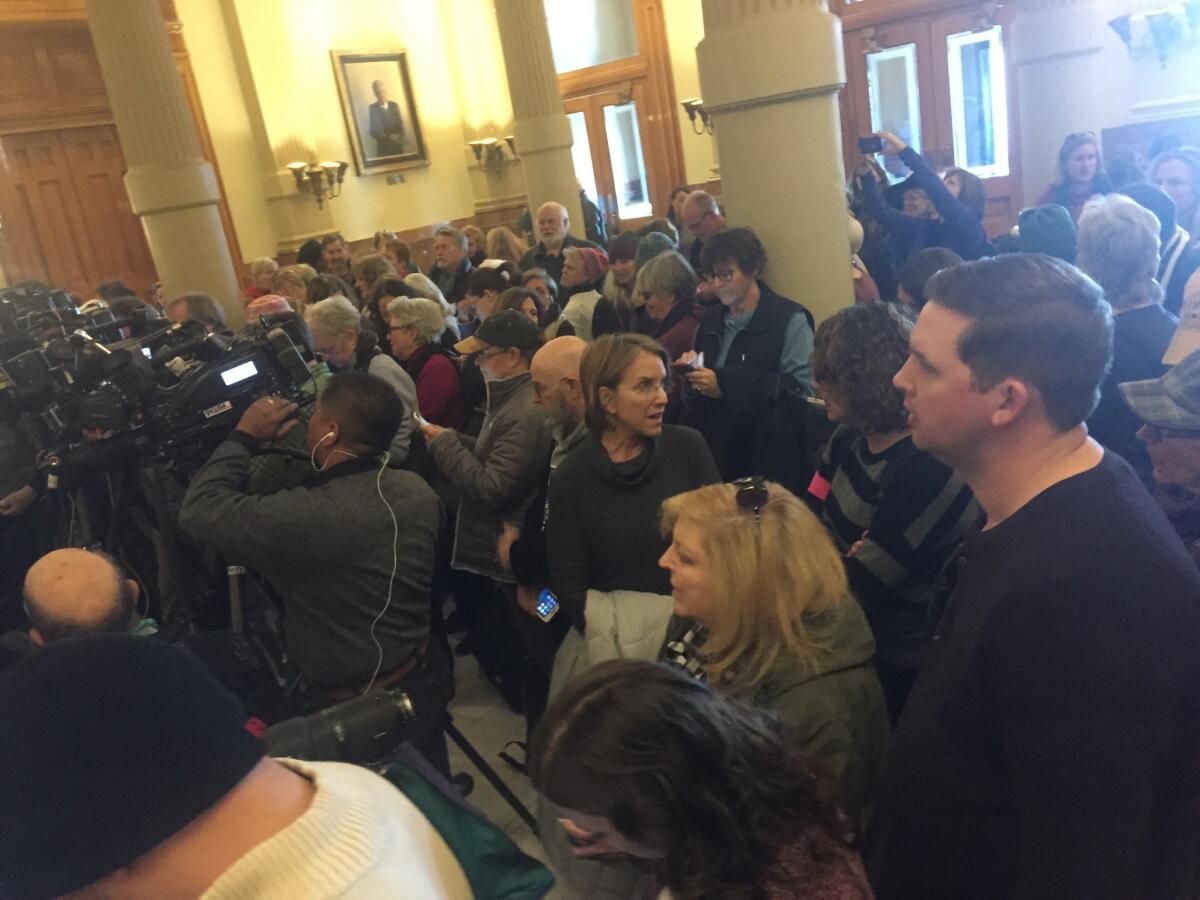
Colorado electors are trying a last-chance legal appeal to avoid voting for Hillary Clinton, and instead vote for an alternative candidate to replace Donald Trump. A week ago, a district court judge told them they had to vote for Clinton, who won the popular vote in Colorado.
A few days ago, a federal appeals court upheld that decision. But just hours before the vote today, two electors filed suit to stop the Colorado secretary of state from requiring them to swear to vote for the candidate supported by the electorate.
Their effort is part of a loose national scheme to defeat Trump by persuading Republican electors to join with Democrats, such as those in Colorado, and coalesce around an alternative candidate. There has been no decision so far.
- Share via
Chants of ‘Shame!’ erupt as Wisconsin electors cast ballots for Trump
Wisconsin’s 10 presidential electors unanimously cast their ballots for Republican Donald Trump as expected Wednesday, but the vote still drew chants of “Shame” from dozens of demonstrators who had pleaded for them to back away from the president-elect.
The typically procedural vote in a fourth-floor conference room in the Wisconsin State Capitol was anything but routine as about 150 protesters greeted the 10 electors with signs pleading for them to “vote your conscience not your pledge.”
In a short 15-minute meeting, the electors quickly cast their ballots for Trump. They did not address the controversial nature of the election and no speeches were made before the ballots were cast.
“We’re very excited to represent the hard working activists around the state who delivered this,” said Brad Courtney, the Wisconsin elector who chaired the meeting. “It’s been a wonderful time, and it’s going to be fun to go to Washington in January to watch Donald J. Trump be sworn in as the next president.”
Courtney called it a proud moment, nothing that the vote marked the first time Wisconsin had backed a Republican presidential candidate since Ronald Reagan in 1984.
After the vote had been tallied, one woman stood up, shouted and marched toward the front of the room where the electors were seated before she was restrained.
“You don’t deserve to be in America,” she shouted. “You have sold us out! Listen to your hearts! Listen to the facts!”
Police escorted her from the room.
About 75 members of the public, most of them gathered in opposition of Trump, had watched as the votes were cast. An additional 50 gathered in an overflow room nearby.
Among those in the overflow room was Lauren Velazquez, who made the three-hour drive to Madison from Chicago’s Old Irving Park neighborhood. She had been hopeful the electors would “buck tradition” and “vote for something bigger, upholding democracy.”
“I think the electoral college was created as part of the system of checks and balances to really make sure at the end of the day that the principle of democracy is preserved,” said Velazquez, 37, who works for a nonprofit organization. “It’s the super anti-immigrant rhetoric in a country founded by immigrants and it’s the fact that it’s public knowledge at this point that the election was influenced by foreign entities and a foreign government. That’s antithetical to what this country was founded on.”
- Share via
Illinois electors cast their votes for Hillary Clinton
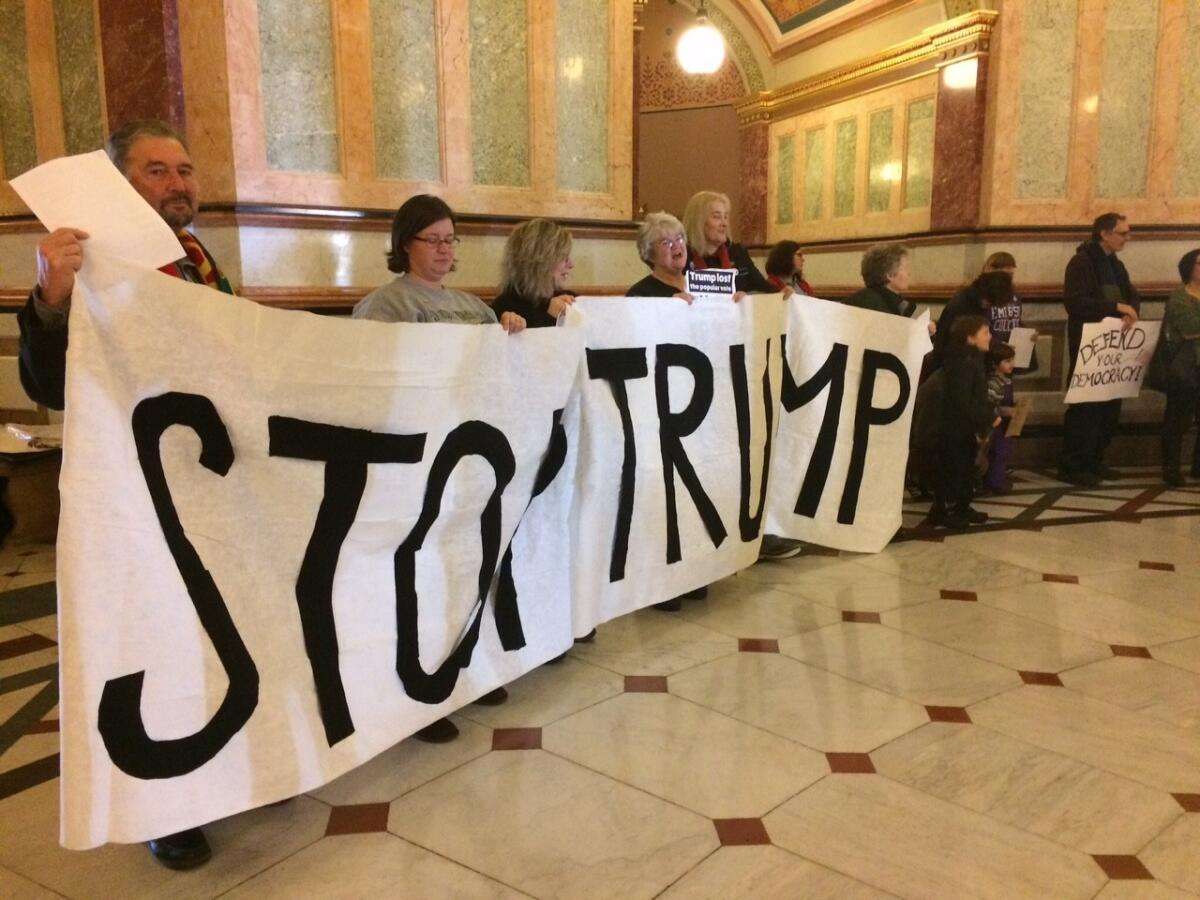
All 20 of Illinois’ electors cast their vote for Democratic presidential nominee Hillary Clinton on Monday, a bittersweet finish for many who had hoped to claim the state as the birthplace of the nation’s first female president.
Instead, they were prepared for their colleagues in other states to ultimately decide the contest for Republican Donald Trump.
“Surely, it’s a historic occasion whenever the electoral college meets, it was a big disappointment for me, being a Hillary delegate to the convention and an elector,” said Cook County Board President Toni Preckwinkle, who also served as chairman of Illinois’ electoral vote. “But this is our American system of democracy, and we are going to move ahead.”
Before the vote, a small group of protesters gathered inside the Capitol Rotunda, unfurling a “Stop Trump” banner and chanting “vote your conscience” as they encouraged electors to stand against Trump.
The demonstration wasn’t needed to sway Illinois’ electors. The state voted overwhelmingly for Clinton, who was born in Chicago and raised in suburban Park Ridge. Clinton won 55.8% of the vote in Illinois, compared with 38.8% for Trump. In 2007, Illinois passed a state law that electors must pledge to honor the popular vote when casting electoral votes.
Illinois electors cast their ballots in a small hearing room inside the state Capitol, one by one dropping paper ballots into a wood box. Many paused for a photographer who was there to document the vote, with some giving brief remarks.
Elector Vera Davis, the wife of U.S. Rep. Danny K. Davis (D-Ill.), said she was thankful for the privilege to vote for the first woman to be nominated by a major party. Former State Rep. Lauren Beth Gash called for a ‘thorough, independent investigation” over U.S. intelligence agencies’ assertion that Russia interfered in the country’s political system by hacking into Democratic Party emails.
Preckwinkle dismissed calls to eliminate the electoral college as “a waste of time and energy,” saying “it’s better just to focus on winning by the rules of the game as they are.”
“The system is what it is, and those of us who wished for a different outcome in this election better get working,” Preckwinkle said, saying that Democrats must focus on organizing and recruiting younger voters.
“I am 69 years old, and all the candidates who were running for president are my age and older, so we’ve clearly got some problems in both parties about the next generation of leadership,” Preckwinkle said.
- Share via
Electoral vote hits halfway point, with 25 states and no surprises
- Share via
Protester in Arizona: ‘Don’t let Putin elect our president’
- Share via
This elector’s vote was not up for grabs
Bill Clinton was among the electors in New York. He and the 28 other members of the state’s Electoral College cast their votes as expected for Hillary Clinton as they met in Albany on Monday.
Clinton was the first of the state’s electors to cast his vote. He received a standing ovation when he was introduced by Gov. Andrew Cuomo as “one very special New Yorker we all call friend.”
The Clintons bought a house in Chappaqua, N.Y., in 1999 at the end of Bill Clinton’s second presidential term.
The proceedings Monday featured a who’s who of New York Democratic politics, including New York City Mayor Bill de Blasio, a fierce opponent of President-elect Donald Trump.
Trump’s name was not mentioned at all during the proceedings, but in a last minute dig, the electors voted to donate their compensation for serving on the electoral college to the New York Immigration Coalition.
- Share via
Electors in 21 states have voted so far, all according to script
- Share via
Demonstrators carried away by police outside meeting of electors in Pennsylvania
Hundreds gathered outside the Pennsylvania state Capitol Monday to protest the Electoral College vote Republicans will cast at noon for President-elect Donald Trump.
At least half a dozen protesters were carried or marched away by Capitol police after blocking a street.
Inside the Capitol, protesters sang a version of the “Twelve Days of Christmas.” They offered a dozen reasons they believe Trump should not be the nation’s 45th president. One accused him of being a stooge of the Russian government, which the CIA has said interfered in the election by hacking Democrats’ computers and disseminating emails. Another cited Trump’s boast on an “Access Hollywood” tape that he had used his celebrity status to grope women.
For protester Pamela Bateson, a 62-year-old retired educator, Trump represents the fascism her father fought against in World War II.
Steve O’Hearn dressed in an oversized Russian hat and overcoat to symbolize Russia’s meddling. He says he doesn’t understand how Republicans can ignore the CIA’s findings given their party’s longstanding opposition to Russia under former President Ronald Reagan.
“I’m welcoming the Russians,” O’Hearn said, adding, “There’s no reason why you can’t be funny and serious at the same time.”
Trump won the popular vote in Pennsylvania by 44,292 votes — the first Republican presidential candidate to do so since 1988. It earned him the state’s 20 electoral college votes.
- Share via
Protests underway at Arizona Capitol as electors prepare to meet

Tom Mecony of Oro Valley, Ariz., explains why he is protesting at today’s meeting of presidential electors in Arizona.
Nearly 300 people gathered in two rows on either side of the main entrance to the Arizona Capitol tower Monday morning as the state’s 11 electors made their way inside.
At the moment of the scheduled 10 a.m. vote inside the Capitol, the protesters sang “America the Beautiful” and continued to chant, “We reject the president-elect.”
Jennifer Cohen said she knew that the the electors had already announced their decision to cast their votes for Donald Trump, but hoped to defy those “who tell us to stop whining and be quiet.”
“I know how they’re going to vote, I’m more here to show that someone is here to stand up for what’s right and wrong,” said Cohen, an emergency room physician from Phoenix. “This is how movements start.”
- Share via
No Trump defections yet: Electoral college vote so far is 75 for Trump and 27 for Clinton
Electors have been meeting this morning in states such as Arizona and New Hampshire to cast their votes. So far, electors in nine states with a majority of voters who voted for Donald Trump have also cast their votes for the GOP candidate, despite efforts by anti-Trump forces to get some electors to defect.
- Share via
‘Our chance of changing their minds is virtually zero,’ Georgia electoral college protesters acknowledge
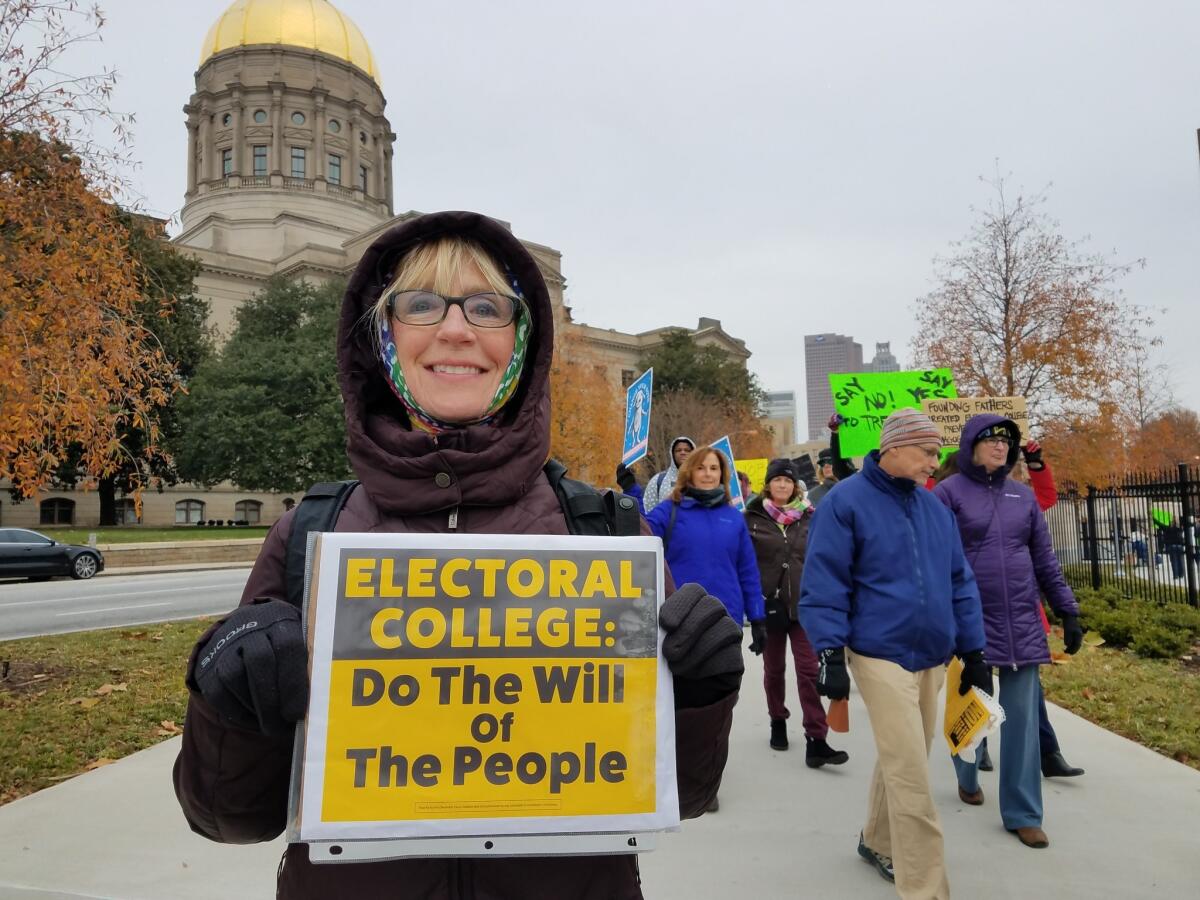
Hundreds of protesters gathered outside Georgia’s gold-domed state Capitol early Monday morning in what they said was a bid to prevent Donald Trump from becoming the nation’s 45th president, yet few seemed to have faith they might persuade the electors meeting inside.
All 16 GOP electors in Georgia, a solidly Republican state where Trump won 51% of the vote, are expected to vote for Trump.
“I think our chance of changing their minds is virtually zero,” acknowledged Connie Wernersbach, 62, a retired intensive care nurse who had driven to the Atlanta Capitol building from Fayetteville, Ga. “This is just a demonstration to show we’re unhappy.”
Many chanted “Reject the president-elect” and “Dump Trump” as they marched to keep warm on a narrow strip of sidewalk behind the building. Wearing thick winter coats, gloves and hats, some held signs that castigated Trump as a “fascist thug” and “Putin’s Poodle.”
Wernersbach, who wielded a placard saying “Electoral College: Do The Will of The People,” said she was “terribly worried” about the prospect of Trump becoming president: “He is completely unfit for office.”
For a brief moment earlier this year, there was a glimmer of a revolt against Trump in Georgia, one of 21 states that does not bind its electors to the results of their state’s popular vote. In August, Baoky Vu, a GOP elector based in Decatur, Ga., admitted he might not cast his ballot for Trump if he won. Within hours, however, he was forced to resign.
The remaining electors have steadfastly backed the party line, even as activists hoping to change their minds have bombarded them with 6 a.m. phone calls and thousands of emails and letters.
Still, a few demonstrators outside clung to the hope that one of the electors might rebel and refuse to cast a ballot for Trump.
“I have faith that at least one person in there might vote for their conscience,” said Lucy Ahmann, a 17-year-old high school student from Decatur who attended the demonstration with her sister, aunt and grandmother. “Maybe Trump is not the will of Georgia?”
- Share via
Maine electoral college voter has declared plans to defect to Bernie Sanders

Trump held a comfortable lead of 306 votes to 232 for Hillary Clinton, based on the popular vote tallied on and after Nov. 8.
Sen. Bernie Sanders lost the Democratic nomination to Hillary Clinton, but he and his supporters will get a small reward today, according to one of four Maine electoral college members.
David Bright, a Sanders supporter, said in a Facebook message that he would vote for the Vermont independent. He is one of only two of the 538 electors nationwide who have announced plans to vote for a candidate other than the one who carried his state. The other is an elector in Texas who has said he does not plan to vote for Donald Trump.
Bright’s decision would split Maine’s electoral delegation among three people — Sanders, Clinton and Trump.
Maine and Nebraska are the only states that split their electoral votes by congressional district, the rest are winner-take-all.
In Maine, Trump won the 2nd Congressional District, giving him one electoral vote. Clinton won the 1st Congressional District and the state’s popular vote, giving her three electoral votes — or so it seemed until Bright announced he’d vote for Sanders.
“If my vote today could have helped Secretary Clinton win the presidency, I would have voted for her,” he wrote. “But as the Electoral College meets all across this nation on this day, I see no likelihood of 38 Republican electors defecting from their party and casting their ballots for Secretary Clinton.
“So Hillary Clinton will not become President, and there is nothing I can do about that. Knowing this, I was left to find a positive statement I could make with my vote.”
Bright said that he meant “no disrespect to our nominee” but wanted to recognize the new voters drawn into politics this year by Sanders, who energized young voters around the nation but could not surmount Clinton’s deep ties to establishment Democrats, women and others.
Sanders did better in caucus states, where his enthusiastic supporters outnumbered Clinton backers — including in Maine, where he defeated her by a nearly 2-1 margin.
“Democracy is hard, and messy, and complicated, and those of us who have been at this game for a long time have learned to take the defeats when they come,” Bright wrote. “But those lessons don’t come easily for new voters. So I cast my Electoral College vote for Bernie Sanders today to let those new voters who were inspired by him know that some of us did hear them, did listen to them, do respect them and understand their disappointment.”
“I want them to know that not only can they come back to the process, but that they will be welcomed back; that there is room in the Democratic Party for their values.”
- Share via
In 1969, Democrats and Republicans united to get rid of the electoral college. Here’s what happened
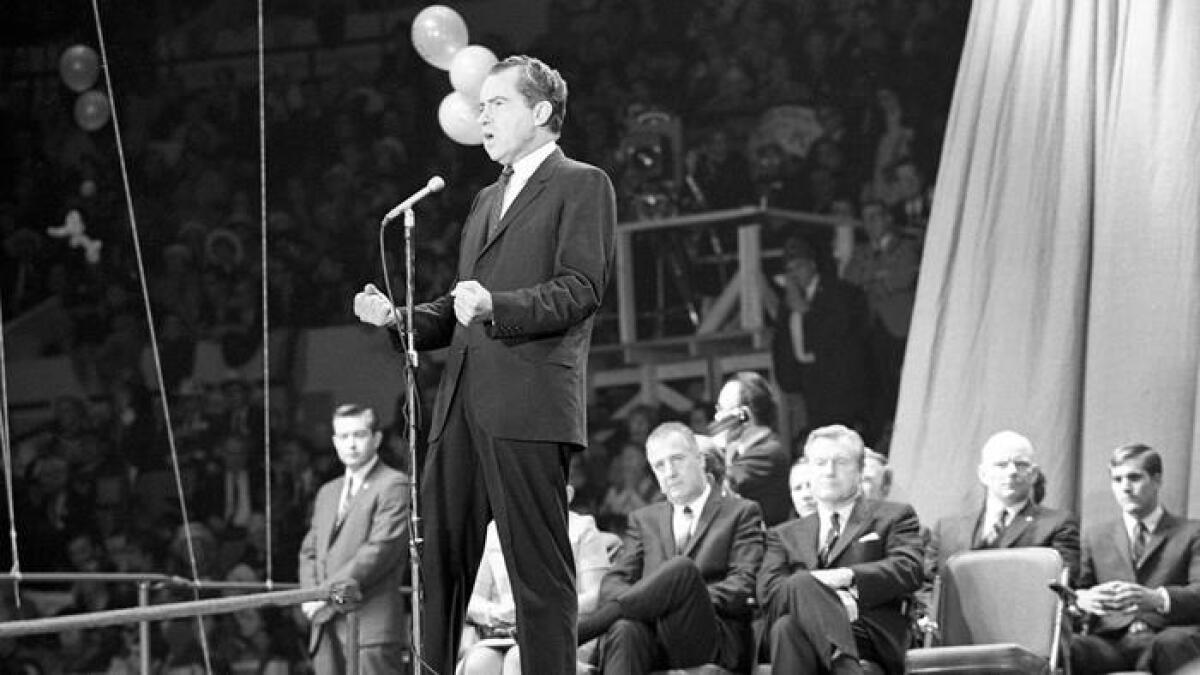
It turned out to be a bipartisan effort.
In 1969, Republican President Richard Nixon supported a push in Congress to abolish the electoral college. So too did his rival in the presidential race a year earlier, Democrat Hubert Humphrey.
The reason both united in support: former Alabama Gov. George Wallace.
Wallace — who had famously said, “Segregation now, segregation tomorrow and segregation forever” — stoked racial animosity as the candidate of the American Independent Party. He won five Southern states and netted 46 electoral votes.
Even before the 1968 election, there was fear that Wallace would win some electoral votes and possibly cause a tie between Nixon and Humphrey. Under the Constitution, the House of Representatives would then select the president and the Senate the vice president.
- Share via
Protests and rituals abound as electors begin to gather
As electors begin to gather in state capitals, the usually obscure rituals of the day are attracting much more than the usual amount of attention. In Indiana, where one of the first meetings took place, electors formally signed the ballot form, then cast all of the state’s 11 votes for Donald Trump, as expected.
In some states, protests have greeted the electoral college meetings.
So far, however, there’s been no evidence of any votes being changed.
- Share via
Protests outside electoral college votes are underway. They probably won’t change the outcome
The protest above is taking place outside Georgia’s Capitol, where electors are expected to select Donald Trump because he won the state’s popular vote. Dozens of similar protests are expected or already underway in other states.
Some electors in some states are expected to vote against their state’s winner, but not many. The AP interviewed 330 electors and found only one Republican elector who said he wouldn’t vote for Trump.
There were some electors who refused to vote for winning candidates in the 1800s, such as six who declined to support James Madison, but never enough to sway the outcome of the race. In the last century there have only been a handful of cases.
Most recently, there were some attempts to persuade electors to back Al Gore over George W. Bush during the disputed 2000 election, but they were unsuccessful.
- Share via
Here’s what it looks like when New Hampshire’s electors gather to vote
You can watch the proceedings live here.
- Share via
Our next president will be selected today by a clique of elites. Here’s why
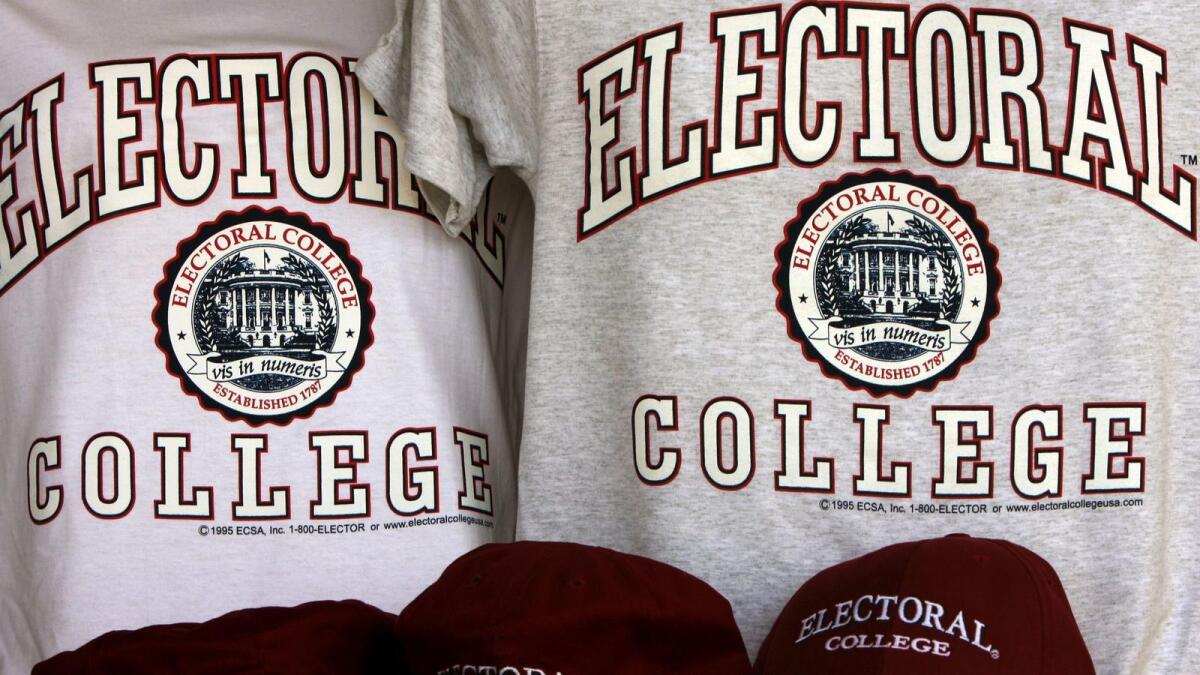
Today 538 electors from the 50 states, including three from the District of Columbia, will convene across the country to cast the votes that decide who will sit in the Oval Office in January.
Donald Trump is expected to win when the electors vote, even though more Americans cast ballots for Hillary Clinton. Trump was more popular in states that control more electoral votes. That’s the system. Regular Americans don’t get a direct say in who becomes president, and not all Americans’ votes are equal.
That’s the very intent of the electoral college, albeit a design forged from an 18th century political struggle over how to balance freedom and slavery, elitism and populism, independence and accountability.
- Share via
Protesters have their eyes on the electoral college vote even though Trump is very likely to prevail
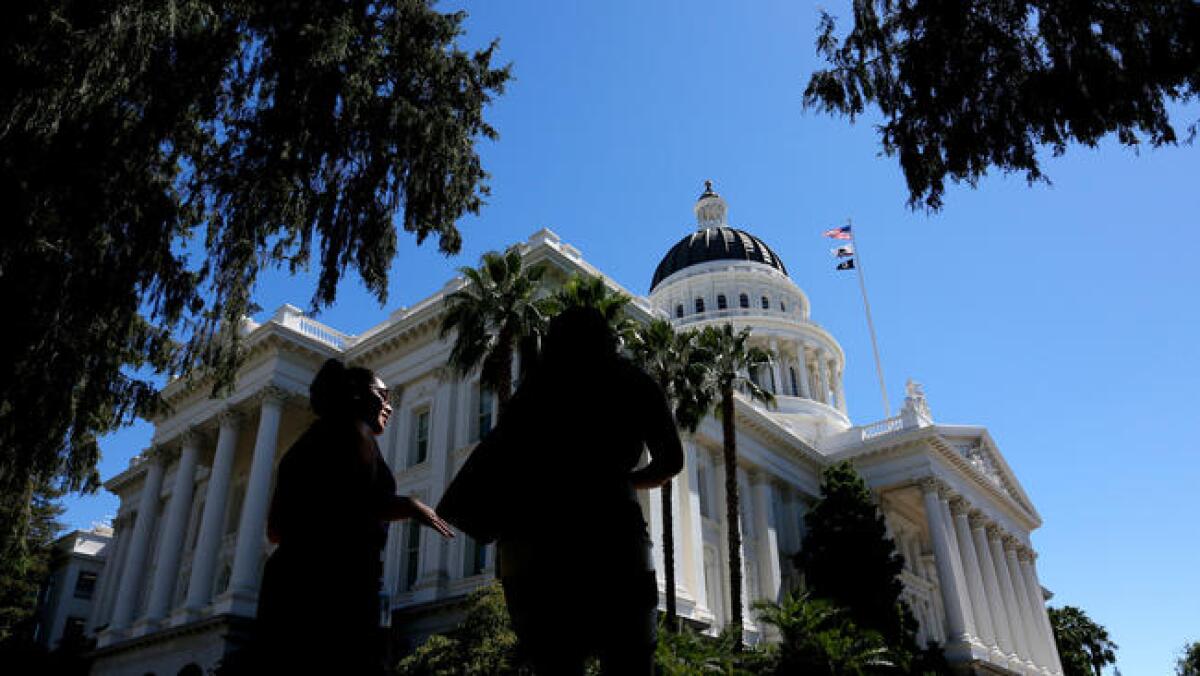
In keeping with the chaotic campaign, the run-up to the electors’ balloting has been filled with protests and disputes over the constitutionally mandated gatherings.
Millions of Americans have signed petitions, deluged electors with letters and emails and indulged in elaborate hypotheticals about how those votes might be swayed. The passion behind those efforts has been intensified by post-election drama over U.S. intelligence that indicates Russia attempted to assist Trump before the election by stealing and distributing private emails from Democratic institutions and activists.
Going into the Monday meetings in each of the 50 states and the District of Columbia, Trump held a comfortable lead of 306 votes to 232 for Hillary Clinton, based on the popular vote tallied on and after Nov. 8.
- Share via
Reminder: This is how the electoral college works
Electors are gathering in the state capitals today to cast their votes for president. Despite long-shot efforts to block him, Donald Trump should win the vote based on his win of the popular votes of key states. In case you’ve forgotten, watch this reminder of how the electoral college — a uniquely American system — works.
- Share via
Senators call for select panel to investigate Russian hacking
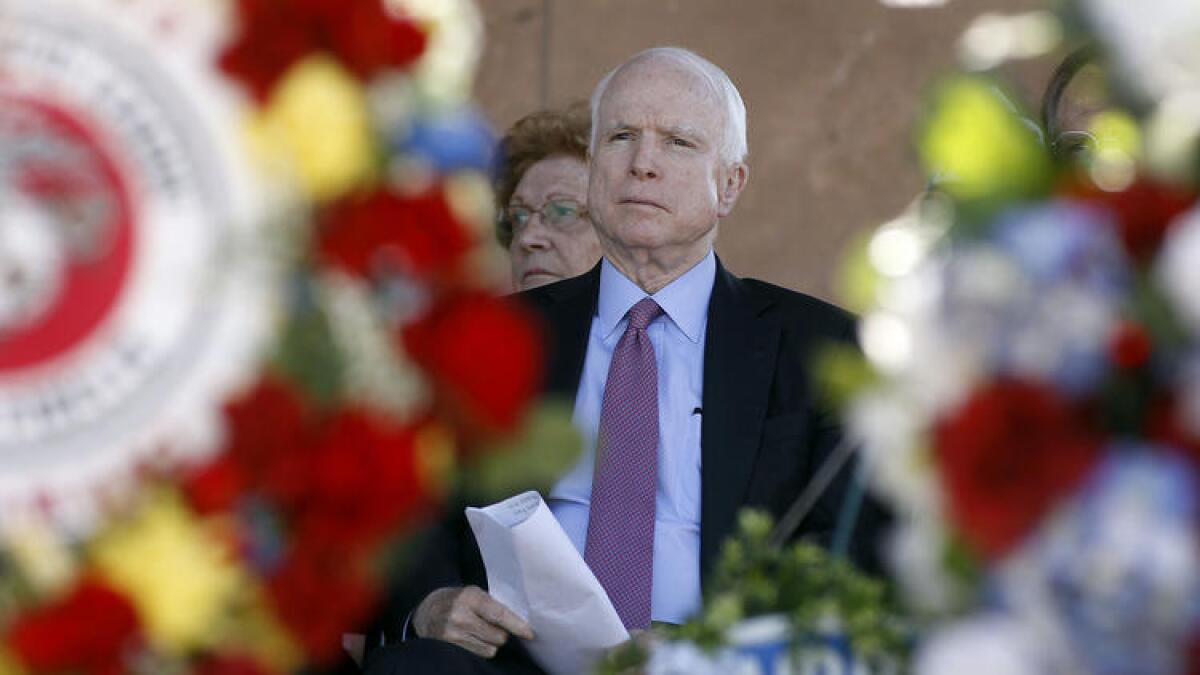
Four powerful members of the Senate called Sunday for creation of a special select committee to investigate Russian attempts to influence the presidential election, a sign of growing concern that GOP leaders’ plans to use existing panels will produce a partisan inquiry.
Sens. John McCain (R-Ariz.), who chairs the Armed Services Committee, and Charles E. Schumer (D-N.Y.), the incoming minority leader, said the specter of a foreign power trying to sway the U.S. election demands a special bipartisan investigation.
“We need to get to the bottom of this,” McCain said on CNN’s “State of the Union.”
“There’s no doubt they were interfering,” he said. “There’s no doubt…. The question is now, how much and what damage? And what should the United States of America do?”
Schumer told a news conference in New York that it’s “clearer and clearer that the Russians hacked our cybersystem with the intent of influencing the election.”
“It sure should raise the hackles of every American,” he added.
- Share via
At Alabama rally, Trump promises hope for the ‘forgotten men and women’
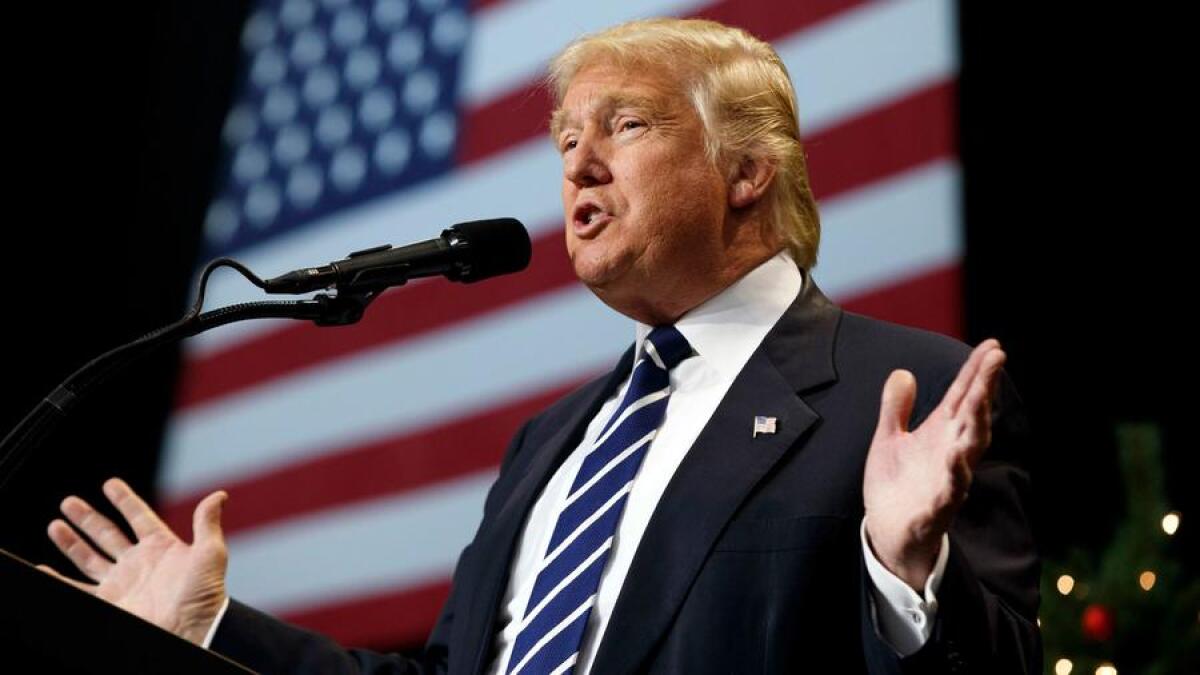
President-elect Donald Trump used the final stop on his “thank you” tour to tell an enthusiastic crowd in Alabama that he will bring jobs and hope to “the forgotten men and women of this country.”
But he also took issue with a recent comment made by first lady Michelle Obama, who suggested in an interview that some Americans had lost hope.
The incoming president said he had “tremendous hope” for the years ahead. “This is truly an exciting time to be alive…. The script is not yet written,” he said. “But the pages will be authored by you,” he said, pointing out to the huge cheering crowd.
Trump said the main goal of his administration will be to bring jobs and prosperity to the areas of the country that have struggled. He said he will promote “two simple rules: buy American and hire American.”
He said he had returned to Mobile, Ala., because he had one of his first large rallies there in August 2015. Alabama is also the home state of Sen. Jeff Sessions, the first senator to endorse Trump and his choice to be the next U.S. attorney general.
Earlier in the day, Trump said he had selected South Carolina Rep. Mick Mulvaney, a conservative Republican and a budget hawk, to run the Office of Management and Budget.
- Share via
The most important elevator in New York: The Tower of Power called Trump
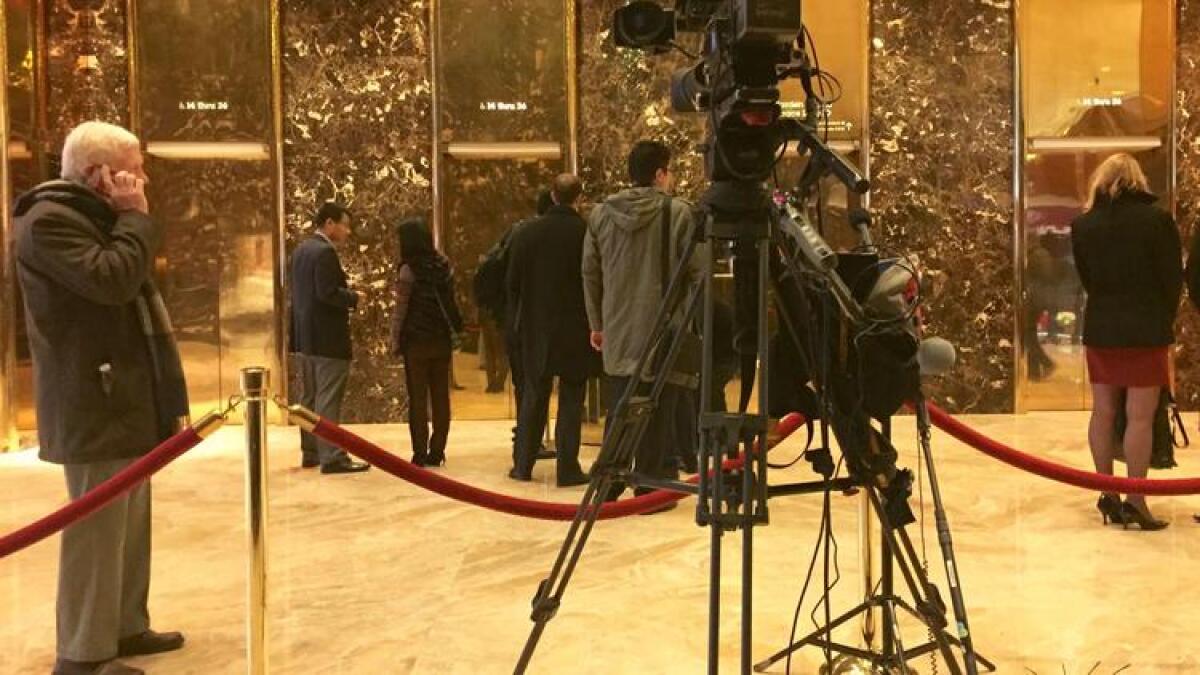
They are the elevators that scale the tower of power.
Through their gold-hued doors step courtiers and critics, job-seekers and publicity hounds. Punching the “up” button over the last several weeks have been all manner of celebrities, from the worlds of politics, entertainment and sports — united by their desire to enter the private offices of President-elect Donald J. Trump.
Here’s a look at some of them.
- Share via
China pledges to return U.S. sea vessel to Pentagon in ‘appropriate manner’

China agreed Saturday to return an American sea drone it had captured after the Pentagon demanded it back, defusing tensions at the end of a week of confrontations over Beijing’s territorial ambitions in the South China Sea.
China’s Defense Ministry said it would return “in an appropriate manner” the U.S. sea vessel seized this week by the Chinese navy.
But the ministry also accused the U.S. of “public hyping” that was “not conducive to solving the problem smoothly.”
- Share via
Trump administration could upend decades of U.S. policy on Israel and Palestinians
Here in the desert hills of the West Bank, near the Palestinians’ principal city of Ramallah, a group of Orthodox Jews has built the town of Beit El, a place that most of the world considers an illegal settlement constructed on occupied Palestinian land.
For decades, U.S. policy has opposed such settlements as harmful to the peace process. But the Israeli settlers now have some well-placed American supporters.
Funds to help construct Beit El came partly from a U.S.-based foundation run by President-elect Donald Trump’s son-in-law, Jared Kushner, and the Kushner family.
And David Friedman, Trump’s longtime real estate lawyer who was named Thursday as the next U.S. ambassador to Israel, served as the president of the American Friends of Beit El foundation. His name is on a girls’ school in the settlement in tribute to his support.
The amounts given by the Kushners were small; $5,000 here, $10,000 there, according to Internal Revenue Service filings.
But they constitute another piece in the puzzle of how the Trump administration will approach one of the Middle East’s most intractable conflicts.
There are growing signs that Trump is poised to upend decades of U.S. foreign policy on dealing with Israelis and Palestinians, giving Israel a freer hand to build settlements and relocating the U.S. embassy to Jerusalem.
- Share via
Putin responsible for election-related cyberattacks, Obama says
Russian President Vladimir Putin was almost certainly directly involved in the decision to stage cyberattacks aimed at the U.S. election, President Obama said.
“The intelligence that I have seen gives me great confidence” in the assessment by U.S. agencies “that the Russians carried out this hack” aimed at the Democratic National Committee and senior aides to presidential nominee Hillary Clinton, Obama said at his final scheduled news conference of the year.
“Not much happens in Russia without Vladimir Putin,” he added. “This is a pretty hierarchical operation. Last I checked, there’s not a lot of debate and democratic deliberation, particularly when it comes to policies directed at the United States.”
“I will confirm that this happened at the highest levels of the Russian government. And I will let you make that determination as to whether there are high-level Russian officials who go off rogue and decide to tamper with the U.S. election process without Vladimir Putin knowing about it.”
- Share via
Obama expresses sorrow over Aleppo but defends approach

President Obama on Friday expressed sorrow over the carnage in Aleppo but said there was no way for the United State to intervene and stop the slaughter in Syria “on the cheap.”
“We cannot claim we have been successful” in efforts to stop the Syrian bloodshed, Obama said. “ So that is something I have to go to bed with every night.”
“But I continue to think it was right approach” to avoid direct military involvement in Syria’s civil war, he added.
Obama has held back from taking on the regime of Syrian President Bashar Assad, saying there was no military solution possible and that any resolution of the conflict must be a political one.
Images of shelling in Aleppo this week have saddened the president, aides say, as he watches children mourning their lost families and refugees flowing down the streets hoping to reach safety.
In his final news conference of the year, Obama told reporters than he grieves their loss but squarely places the blame on the Syrian government and its supporters – especially in Russia.
- Share via
CIA director: FBI and CIA find ‘strong consensus’ that Russian hacks were intended to help Trump win election
There is “strong consensus” among U.S. intelligence services that Russia orchestrated hacks and online leaks in part to help Donald Trump win the White House, the head of the CIA told agency employees in a message Friday.
FBI Director James B. Comey and Director of National Intelligence James R. Clapper Jr. agree with a CIA assessment that top Russian officials oversaw a covert plan to expose internal communications from Hillary Clinton’s campaign and the Democratic National Committee and influence the outcome of the U.S. elections, CIA Director John Brennan wrote in a message, according to a U.S. official.
“Earlier this week, I met separately with FBI [Director] James Comey and DNI [Director] Jim Clapper, and there is strong consensus among us on the scope, nature, and intent of Russian interference in our presidential election,” Brennan wrote. The message was first reported by the Washington Post.
In recent days, lawmakers had said that there was disagreement between the FBI and CIA over Russia’s intentions in hacking into the email accounts and computer systems of top Democratic Party officials. Friday’s message appeared designed to put to rest concerns inside the CIA that other intelligence agencies didn’t support the agency’s conclusions.
President Obama has ordered intelligence officials to conduct a review of Russia’s actions during the 2016 elections before Obama leaves office in Jan. 20. President-elect Donald Trump has repeatedly denied Russia was behind the leaked emails and mocked the CIA’s assessment that top Russian officials intervened to help him get elected.
“The three of us also agree that our organizations, along with others, need to focus on completing the thorough review of this issue that has been directed by President Obama and which is being led by the DNI,” Brennan wrote.
In addition to hurting Clinton’s campaign and boosting Trump’s chances, U.S. intelligence officials also believe Russia acted with a broader goal of discrediting the U.S. political process and undermining U.S. efforts to promote democratic governments elsewhere in the world.
- Share via
U.S. will retaliate against Russian interference in the election, Obama says
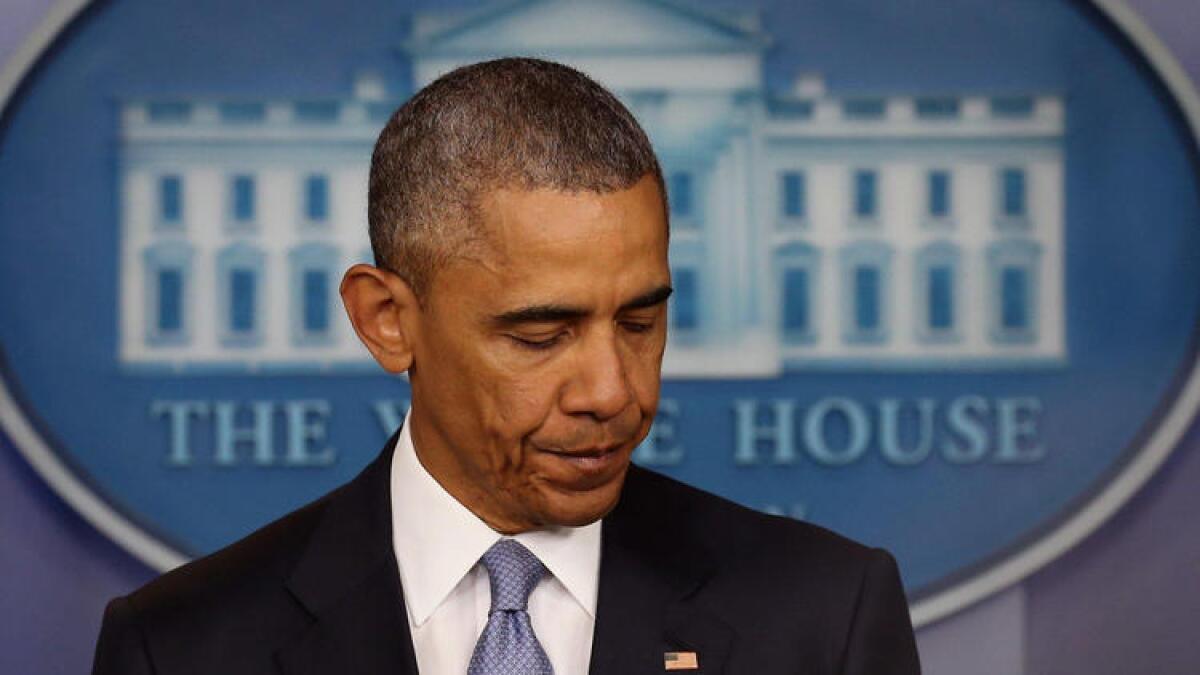
President Obama on Friday threatened Russia with retaliation for the election-season hacking of Democratic emails, promising, “We can do stuff to you.”
Obama would not specify what the retaliatory actions would be but said they would be designed to make Moscow think twice about such cyber actions in the future.
“Certain actions” are on the way, Obama said during his final news conference of the year. Some of the actions “we can divulge publicly,” others the public will never hear about.
“The idea that public shaming is going to be effective I think doesn’t read the thought process in Russia very well,” Obama said.
Intelligence officials have said they have little doubt that the hacks were part of a Russian effort to influence the outcome of the election. The hacks revealed internal communications of the Democratic National Committee and the campaign of Democratic nominee Hillary Clinton.
Russian officials deny involvement and say the U.S. should show more proof or let the subject drop. Obama has ordered his intelligence network to run a full review before Republican Donald Trump is inaugurated on Jan. 20.
In an interview on National Public Radio that aired earlier in the day, Obama said, “There are still a whole range of assessments taking place among the agencies.
“When I receive a final report, we’ll be able to [have] a comprehensive and best guess as to those motivations.
“But that does not in any way, I think, detract from the basic point that everyone during the election perceived accurately — that in fact what the Russian hack had done was create more problems for the Clinton campaign than it had for the Trump campaign.
“There’s no doubt that it contributed to an atmosphere in which the only focus for weeks at a time, months at a time, were Hillary’s emails, the Clinton Foundation, political gossip surrounding the DNC,” Obama said.
The U.S. Senate Select Committee on Intelligence plans to investigate Russia’s actions, committee Chairman Sen. Richard Burr (R-N.C.) said Friday.
The committee will interview senior officials “of both the outgoing and incoming administrations,” issuing subpoenas if necessary, Burr said in a written statement.
Much of the committee’s work is likely to be behind closed doors, however, although it may open some of the hearings “to help inform the public about the issues,” Burr said.
The Senate Armed Services Committee, under its chairman, Sen. John McCain of Arizona, also plans to investigate.
- Share via
Obamacare sign-ups hit new record even as GOP promises repeal

More than 670,000 people signed up for health coverage through the Affordable Care Act on Thursday, marking the busiest single enrollment day since the healthcare law’s coverage expansion began three years ago.
The record tally, announced by President Obama at his year-end news conference Friday, continues the strong enrollment this fall following Donald Trump’s Nov. 8 election victory.
And it underscored again the challenge that Trump and his Republican congressional allies face in repealing Obamacare, as the law is often called.
“More are signing up by the day,” Obama told reporters in the White House briefing room.
The surge in sign-ups this week prompted the U.S. Department of Health and Human Services to extend the deadline for getting coverage that would begin on Jan. 1. The deadline for that coverage is now 11:59 p.m. PST on Dec. 19. The enrollment period runs through the end of January.
This enrollment period comes at a critical moment for the marketplaces and the health law that Obama signed in 2010.
The program has recorded historic gains over the last three years, as more than 20 million previously uninsured Americans gained health insurance, and the nation’s uninsured rate dropped to the lowest level ever recorded.
Congressional Republicans have pledged to vote to roll back the law early next year.
But the GOP has not yet advanced any alternatives that would protect the millions of people who now depend on health coverage through the law.
Many of these Americans have low incomes and rely on Medicaid, which has been expanded through the health law.
But about 11 million get commercial health plans through HealthCare.gov and similar state-based insurance marketplaces such as Covered California that were created through the law.
More than 80% of these consumers receive government subsidies to offset the cost of their premiums.
The Thursday tally incudes new and returning customers getting health plans through HealthCare.gov, the federal marketplaces serving 38 states.
It does not include enrollment on the remaining 13 marketplaces run by states, including California, and the District of Columbia.
Covered California, the nation’s largest state marketplace, has also been seeing strong enrollment this fall. Like HealthCare.gov, Covered California extended its enrollment deadline for Jan. 1 coverage to Dec. 19.
12:43 pm: This post has been updated with additional background information
- Share via
U.S. Jewish groups oppose Trump’s choice for ambassador to Israel
Several American Jewish groups Friday expressed dismay at Donald Trump’s choice for U.S. ambassador to Israel, a hard-liner who supports expanded West Bank settlements and opposes the traditional two-state solution seen by many as the best hope to resolve the region’s decades-old conflict.
The President-elect said Thursday that he would nominate his longtime friend, bankruptcy lawyer David Friedman, as U.S. envoy to Israel.
Friedman, who advised Trump during the presidential campaign, has taken numerous positions that contradict longstanding U.S. policy under both Democratic and Republican administrations.
Friedman immediately voiced his hope to strengthen U.S. bonds with Israel from its “eternal capital” of Jerusalem.
The United States, like most countries, has its embassy in Tel Aviv and does not recognize Jerusalem as Israel’s capital.
Part of Jerusalem is also claimed by the Palestinians as their capital, and U.S. policy has always maintained that the matter should be resolved in peace talks not by fiat.
During the campaign, Trump pledged to move the U.S. Embassy to Jerusalem. As presidential candidates, Bill Clinton and George W. Bush made similar vows but never followed through once they reached the White House.
Friedman also has supported Jewish settlements in the West Bank, which most of the world consider illegal.
He dismisses proposals for a two-state solution with an Israeli state and a Palestinian state living side-by-side. That has been the basis for U.S. and international diplomacy for decades as the best route to peace.
“Mr. Friedman’s personal connection to and support of a number of organizations committed to building additional settlements in the West Bank certainly suggests that he will not be an advocate for a two-state solution,” said Rabbi Rick Jacobs, president of the Union for Reform Judaism, one of the largest Jewish organizations in the United States.
“We continue to believe – as have both the American and Israeli governments for a generation – that only a two-state solution will allow Israel to remain both Jewish and democratic while also addressing the legitimate aspirations of the Palestinians,” Jacobs said in a statement. “To our great concern, it appears that Mr. Friedman does not share that commitment.”
J Street, a liberal pro-Israel advocacy group that supports a two-state solution, said it was “vehemently” opposed to Friedman’s confirmation in the Senate.
They noted that Friedman had likened liberal pro-peace Israelis to “kapos,” Jewish prisoners who were forced to assist the Nazis in World War II concentration camps.
“His nomination is reckless, putting America’s reputation in the region and credibility around the world at risk,” said Jeremy Ben-Ami, president of J Street.
- Share via
Obama: U.S. will retaliate for Russian election hacking, but you may never see it
President Obama said the U.S. must retaliate against Russia for the election-season hack into Democrats’ emails and that his administration will do so on its own time frame -- perhaps in secret.
“Some of it may be explicit and publicized, some of it may not be,” Obama said during an interview that aired on National Public Radio on Friday morning.
“I think there is no doubt that when any foreign government tries to impact the integrity of our elections … we need to take action,” Obama told NPR host Steve Inskeep. “And we will, at a time and place of our own choosing.”
Intelligence officials have said they have little doubt that the hacks were part of a Russian effort to influence the outcome of the election. The hacks revealed internal communications of the Democratic National Committee and the campaign of Democratic nominee Hillary Clinton.
Russian officials deny involvement and say the U.S. should show more proof or let the subject drop. Obama has ordered his intelligence network to run a full review before Republican Donald Trump is inaugurated on Jan. 20.
“There are still a whole range of assessments taking place among the agencies,” Obama told Inskeep. “And so when I receive a final report, we’ll be able to [have] a comprehensive and best guess as to those motivations.”
“But that does not in any way, I think, detract from the basic point that everyone during the election perceived accurately — that in fact what the Russian hack had done was create more problems for the Clinton campaign than it had for the Trump campaign,” Obama said.
“There’s no doubt that it contributed to an atmosphere in which the only focus for weeks at a time, months at a time were Hillary’s emails, the Clinton Foundation, political gossip surrounding the DNC,” Obama said.
The U.S. Senate Select Committee on Intelligence plans to investigate Russia’s actions, committee chairman Sen. Richard Burr (R-N.C.) said Friday.
The committee will interview senior officials “of both the outgoing and incoming administrations,” issuing subpoenas if necessary, Burr said in a written statement.
Much of the committee’s work is likely to be behind closed doors, however, although it may open up some of the hearings “to help inform the public about the issues,” Burr said.
The Senate Armed Services Committee, under its chairman, Sen. John McCain of Arizona, also plans to investigate.
This post was updated with Sen. Burr’s statement.
- Share via
China seizes U.S. underwater drone in South China Sea, prompting a formal complaint

The Pentagon on Friday demanded the return of a U.S. Navy underwater drone that was seized by a Chinese military vessel in the South China Sea, an incident that also triggered a formal diplomatic complaint from the U.S government.
U.S. officials say the seized device was collecting data on water salinity, surveying the ocean bottom and gathering other scientific information.
The U.S. State Department issued a formal demarche with Beijing about the incident, involving the unarmed torpedo-like vehicle known as an autonomous underwater glider.
Peter Cook, a Pentagon spokesman, said the Defense Department has “called upon China to immediately return an unmanned underwater vehicle that China unlawfully seized.”
Beijing should “comply with all of its obligations under international law” and recognize the device as “a sovereign immune vessel,” he said.
The incident began as the Bowditch, a U.S. survey vessel, attempted to retrieve two drones that the Navy said were collecting oceanographic information about 50 miles northwest of Subic Bay in the Philippines, once home to a major U.S. Navy base.
The crew had recovered one drone when a Chinese warship swept in and deployed a smaller boat that seized the second device, which was about 500 yards away, according to U.S. officials.
The Pentagon said the Bowditch contacted the Chinese ship on the radio to seek return of the drone, but the request was ignored.
The Navy said the incident occurred in international waters, and not in one of the areas claimed by China or other nations in the region’s numerous territorial and maritime disputes. It’s unclear where the drone had conducted its surveys, however, and whether China viewed it as a spy drone.
The seizure came at a tenuous time in U.S.-China relations.
China issued a strong condemnation of President-elect Donald Trump this week after he hinted his administration might be open to reevaluating four decades of U.S. policy toward China and Taiwan, which China regards as a rogue province.
The U.S. does not recognize Taiwan as an independent nation, but Trump earlier this month accepted a telephone call from Taiwan leader Tsai Ing-wen, setting off alarm bells in Beijing.
China’s Foreign Ministry warned that any changes in the so-called One China policy could rupture diplomatic ties. Chinese state media said Trump is “as ignorant as a child.”
Adding to tensions are recent commercial satellite imagery that analysts said showed China had installed antiaircraft guns and other weaponry on several of the artificial islands China is building off the mainland’s southern coast.
Submarine drones, outfitted with radar and sensors, are useful in a variety of roles in science and national security.
Unlike aerial drones, which are remotely controlled using GPS signals and data links, underwater craft are not able to receive satellite commands as they scour the ocean floor, sometimes for months at a time.
So the machines need to be able to navigate on their own to carry out missions.
The small unmanned subs can withstand the crushing pressures of the deep ocean, and have been used in ocean exploration and to locate airplane wreckage and shipwrecks.
- Share via
Trump is delivering on his promise to be unpredictable on foreign affairs. Not everyone’s convinced that’s a good idea
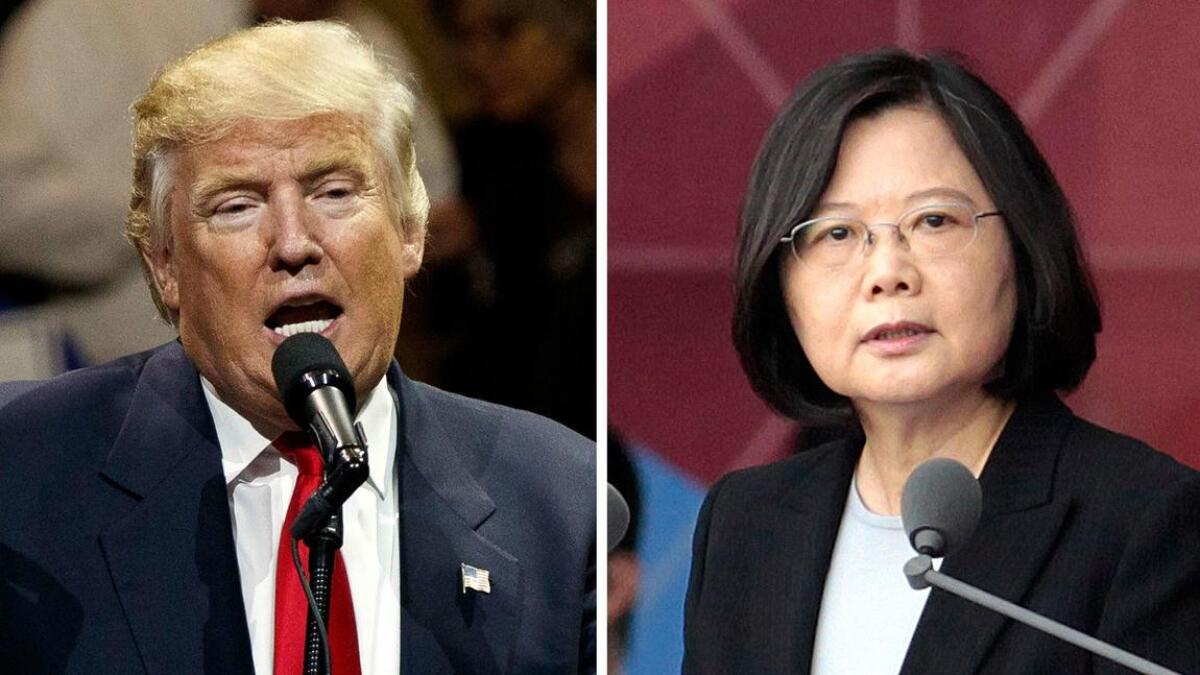
For eight years, many of President Obama’s critics denounced what they saw as excessive caution in dealing with foreign governments.
No need to worry about that anymore.
President-elect Donald Trump has already begun obliterating the current administration’s “no drama” approach. He sees unpredictability as a valuable tool, which keeps adversaries off guard, softening them up to cut good deals.
Many foreign affairs veterans from across party lines see danger ahead.
- Share via
Trump once welcomed a visit from immigrant ‘Dreamers.’ Now they await his next move
Gaby Pacheco strode into Trump Tower’s gilded lobby on a mission to convince the businessman to back immigration reform and help young people like her who were brought to the U.S. illegally as children.
Back in that summer of 2013, Donald Trump was just beginning to flirt with a presidential run, and others warned her that he might be using the visit for publicity. But she and other Dreamers, as the young immigrants are called, coveted the star power he might bring to the cause.
Almost an hour later, she and a few colleagues departed the surreal encounter with doubts about Trump’s understanding of the issue, an inkling of his future political ambitions and, most oddly, parting gifts of chocolates, jewelry and neckties from his famous brands.
But they also left with a reason for optimism.
When Trump walked his young visitors to the elevator, he turned and nodded: “You convinced me,” he said.
Soon they will know whether they did.
- Share via
Trump attacks White House aide who challenged his stand on Russian hacking to sway election
Donald Trump called Josh Earnest “a foolish guy” Thursday after the White House press secretary said the president-elect should stop attacking U.S. intelligence agencies for their conclusion that Russia tried to help Trump win the election.
The back-and-forth reflected rising tension between the incoming and outgoing presidents over Trump’s friendly posture toward Russian President Vladimir Putin.
“This foolish guy, Josh Earnest, I don’t know if he’s talking to President Obama,” Trump told thousands of supporters at his latest postelection campaign rally, in Hershey, Pa.
“You know, having the right press secretary is so important because he is so bad the way he delivers a message. He can deliver a positive message and it sounds bad.”
Trump called Obama “very positive” and wondered why Earnest was not. “Maybe he’s getting his orders from somebody else – does that make sense? Could that be possible?”
At a White House press briefing Thursday morning, Earnest fielded questions on Trump’s rejection of U.S. intelligence agencies’ conclusion that Russia tapped emails from Hillary Clinton’s allies and released them to help swing the election to Trump.
Earnest reminded reporters that Trump openly called on Russia in July to hack Clinton’s email, a statement that advisors later suggested was a joke.
“An adversary of the United States engaged in malicious cyber-activity to destabilize our democracy,” Earnest said. “That’s not a joke. Nobody at the White House thought it was a joke. Nobody in the intelligence community thought it was a joke. I’m not aware of any members of Congress in either party that was briefed on this matter multiple times dating back to the summer thought it was a joke.”
Obama has ordered a review of hacking aimed at influencing U.S. elections since 2008 and expects to get a report on it before Trump takes office on Jan. 20.
“It might be time to not attack the intelligence community,” Earnest said, “but actually be supportive of a thorough, transparent, rigorous, nonpolitical investigation into what exactly happened, and to cooperate with it, and to support it.”
- Share via
Trump picks hard-liner for Israel ambassadorship
President-elect Donald Trump said Thursday that he plans to nominate as ambassador to Israel his lawyer, a hard-liner on the Middle East who has voiced opposition to decades of U.S. policy in the region.
David Friedman, who served as one of Trump’s main advisors on Israel during the campaign, vowed to perform as a “rock-solid partner” to Israel’s conservative leadership.
He has been quoted recently expressing doubt about the so-called two-state solution, the existence of an Israeli and a Palestinian state living side by side in peace, which has been the basis of U.S. policy for decades and the framework for peace negotiations in that part of the world.
“To blindly embrace a two-state solution because it’s been an American policy for the past 25 years is not something he’s going to do,” Friedman said in a recent interview with the Israeli website Ynet.
He added that Trump believed the two-state solution for Israel and Palestine was simply not working.
In the announcement of his appointment, Friedman also upended another U.S. tenet, saying he looked forward to being able to “strengthen the unbreakable bond” between the United States and Israel “from the U.S. Embassy in Israel’s eternal capital, Jerusalem.”
The United States, like almost every other country in the world, maintains its embassy in Tel Aviv and does not recognize Jerusalem as the capital of Israel because part of the city is also claimed by the Palestinians. The U.S. position is that the status of Jerusalem should be settled in negotiations.
Trump has said he would move the U.S. Embassy to Jerusalem. Previous presidential candidates have at times made a similar promise, but no president has ever done it out of concern that the move would inflame tension in an already volatile region.
“I think one of [Trump’s] first acts is going to be to recognize Jerusalem as the capital of Israel,” Friedman said in the Ynet interview, although he added that the actual move of the embassy might not happen right away.
Friedman, a bankruptcy lawyer, represented Trump in cases involving his Atlantic City casinos. He has been a columnist for two conservative publications in Israel. An Orthodox Jew, he is the son of a prominent rabbi from New York’s Long Island.
- Share via
Trump pick for secretary of State has long Russia ties
As chief executive officer of Exxon Mobil Corp., Rex Tillerson has led a vast energy juggernaut, roaming the globe in search of multibillion-dollar deals, working with despots as well as democrats.
The brash Texas oilman has helped forge or supervise exploration, production and refinery projects in 50 countries on six continents, from Africa to the Arctic. The company was widely seen as a quasi-state, with more influence in some parts of the world than the U.S. government.
If Tillerson is confirmed as Donald Trump’s secretary of State, however, he may find that his 41-year career at the world’s largest publicly traded oil and gas company could hamper his ability to freely conduct foreign policy as America’s top diplomat.
A Senate confirmation fight already is brewing over Tillerson’s personal and business ties to Vladimir Putin, now Russia’s autocratic president. Few in Congress feel warmly about Putin, and many are outraged that CIA reports show that Russia used hackers to try to influence the U.S. presidential race.
After several days of leaks from his transition team, Trump confirmed Tuesday that he will nominate Tillerson, saying the 64-year-old oil mogul’s career “is the embodiment of the American dream.”
- Share via
Trump’s electoral college win all but certain, but Hollywood actors urge revolt
All signs point to the electoral college sealing Donald Trump’s victory in the presidential election on Monday, but some Hollywood celebrities are calling for a revolt.
In a video released Wednesday, Debra Messing, Noah Wyle, Bob Odenkirk and other television stars plead with electoral college members to “vote their conscience” by rejecting Trump and picking someone else when they convene on Monday.
“As you know, our founding fathers built the electoral college to safeguard the American people from the dangers of a demagogue and to ensure that the presidency only goes to someone who is, to an eminent degree, endowed with the requisite qualifications,” actor Martin Sheen says in the opening of the video.
Sheen, who played a liberal president on NBC’s “The West Wing,” and the other actors argue that Trump is unfit for the presidency.
“He lacks the necessary stability,” Messing tells viewers.
The celebrities stress that they are not asking the 538 electors to support Hillary Clinton, who won the popular vote by about 2.8 million votes. Instead, they ask them to vote for someone more competent than Trump.
But the odds of the electoral college certifying anyone other than Trump as winner of the presidential election are extremely slim. The Associated Press reported Wednesday that a survey several of its reporters carried out of more than 330 of the electors found just one Republican declining to back Trump.
In 29 states, electors are legally required to support the presidential candidate who won their state’s popular vote. Even in other states, it is extremely rare for electors to vote for anyone other than the winner of their state’s popular vote.
In Colorado, a judge ruled Tuesday that the state’s nine electors are legally required to vote for Clinton, who won the state, halting a long-shot attempt by Democratic electors to unite with Republicans behind a candidate other than Trump.
By securing narrow victories in Michigan, Wisconsin, Pennsylvania and other swing states, Trump won 306 electors, easily surpassing the 270 needed to capture the White House. Denying him the presidency would require at least 36 Republican electors to desert him, something that currently there is no sign of.
- Share via
Once again, Donald Trump makes false claim about warnings of Russian hacking
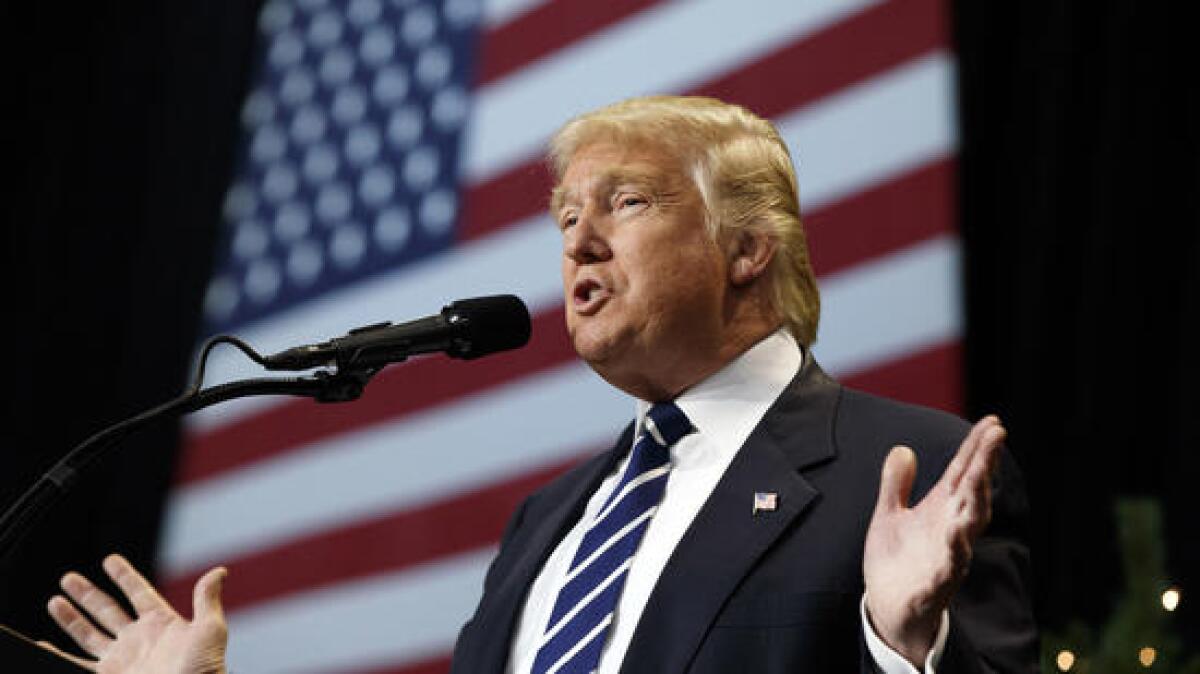
Dawn had barely broken Thursday when Donald Trump again spread via Twitter something provably false: that the White House had not raised an alarm about Russian interference in the presidential election until after Hillary Clinton’s defeat.
Trump himself had talked in September about accusations of Russian hacking, and again in October, after U.S. intelligence officials publicly accused Russians of complicity in purloining emails from Democratic organizations and officials. He talked about the hacking incessantly during the closing weeks of the campaign.
In a separate tweet Thursday, Trump accused the media of working “so hard to make my move to the White House, as it pertains to my business, so complex, when actually it isn’t.”
Except it was Trump and his team who canceled a long-planned Thursday news conference to explain how he’d handle his business while in office — citing the complexity of his company’s operations as the reason for the delay.
Trump’s tweet marked the second time in four days that he has asserted falsely that the government did not say anything in public about the Russian hacking until after the election.
His intent seemed to be framing concerns about Russian intervention in the election as an effort to delegitimize his election. Many of those alarmed about the foreign government’s actions — a group that includes Republicans — have said there’s no indication the intervention cost Hillary Clinton the White House.
Trump spokesman Jason Miller returned to that theme Thursday when asked about Trump’s tweets earlier in the day
“Well, I’d let the president-elect’s tweets speak for themselves,” he said. “I’d say the continued efforts to try to delegitimize the election at certain point — certain point got to realize that the election from last month is going to stand, whether it’s the recount or continued questions along this line, and we’re moving ahead and put together successful administration that’s ready to go to work serving the American people.”
Trump also turned to Twitter on Thursday for another frequent practice: retribution. His recent slighting of Boeing’s Air Force One contract came shortly after a Boeing official questioned his trade policy.
Shortly after Vanity Fair magazine published a negative review of Trump’s restaurant, he let loose with criticism of its longtime editor and its financial future.
“Has anyone looked at the really poor numbers of Vanity Fair Magazine,” Trump wrote. “Way down, big trouble, dead! Graydon Carter, no talent, will be out!”
- Share via
Trump officially chooses Montana Rep. Ryan Zinke as Interior secretary
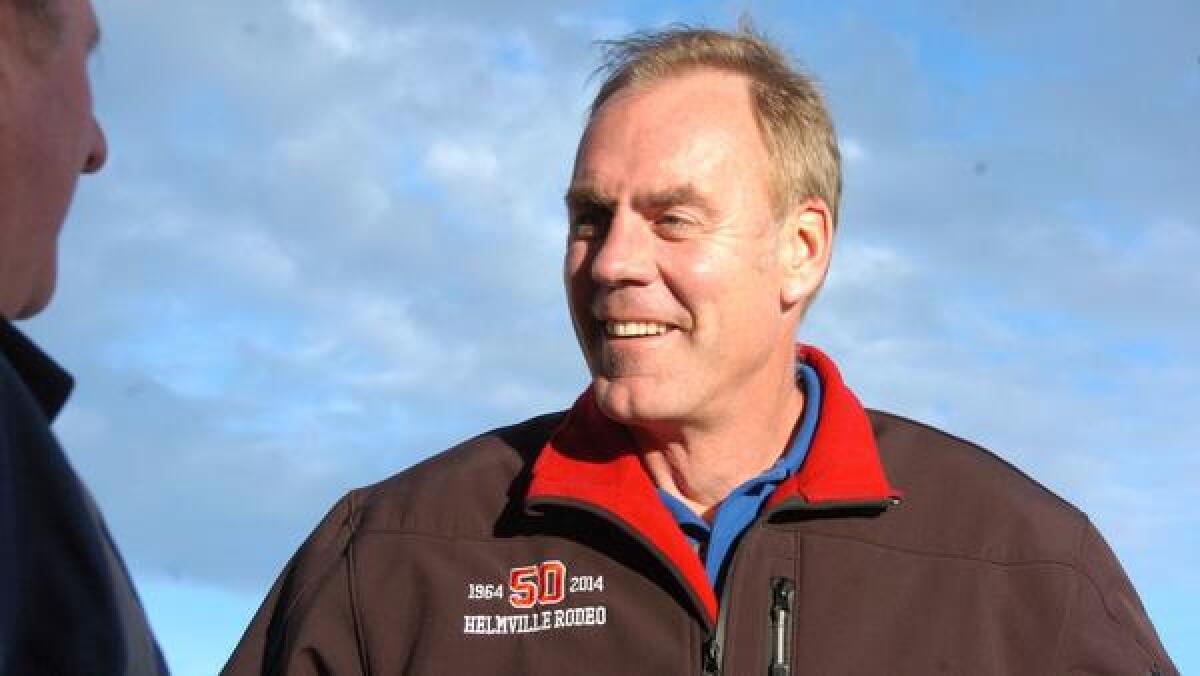
President-elect Donald Trump has officially chosen Montana Rep. Ryan Zinke to serve as his Interior secretary.
Zinke was an early supporter of Trump’s and publicly sought a Cabinet post when Trump visited Montana in May.
Trump’s decision to tap Zinke for Interior upends Senate Republican plans of recruiting the congressman to challenge two-term Democratic Sen. Jon Tester in 2018.
As Montana’s at-large representative, Zinke has proved he can win statewide, and the GOP considered Tester vulnerable in the midterms.
As with several other Trump Cabinet nominees, Zinke has advocated for increased energy drilling and mining on public lands and expressed skepticism about the urgency of climate change.